Risultati: 486

Funzione/Ruolo
Direttrice di Ricerca, Sviluppo e Strategia alla Medicaltech srl. Presidente emerita di Talent4Rise
Percorso professionale
Dopo la laurea in informatica, continua i suoi studi con una specializzazione in cibernetica / intelligenza artificiale e ingegneria dei sistemi elettronici. Dal 1989 è ricercatrice presso il Laboratorio Centrale di Ricerca di un'importante e innovativa azienda italiana di telecomunicazioni. Successivamente ha iniziato a contribuire ad alcuni comitati di standardizzazione internazionali, in particolare quello relativo al linguaggio VHDL. Dal 1993 è stata responsabile di progetti di R&S su aree relative a strumenti di automazione della sintesi logica, utilizzando sistemi esperti, reti neurali, logica fuzzy e coordinatrice di progetti, in ambito internazionale, per la ricerca e l'applicazione di algoritmi di codifica e decodifica video. Dal 2000 è stata responsabile di progetti di Multimedia Content Delivery e Architetture di rete. Nel 2013 ha coordinato attività relative alla telemedicina e al risparmio energetico per la smart city in collaborazione con Monzino e il Centro Cardiologico di Milano Ricerche. Nel 2014 ha vinto una selezione pubblica per titoli per una collaborazione con l'Università degli Studi di Milano presso il Dipartimento di Scienze Farmacologiche e Biomolecolari. Nel 2013 fonda, con un gruppo di colleghe, un'associazione di donne (Talent4Rise, che sotto la sua direzione diventerà socio fondatore della Fondazione Triulza, padiglione della società civile per EXPO2015). L'obiettivo è quello di dare visibilità ai talenti femminili STEM. Ha ricoperto la carica di presidente e membro del consiglio generale della Fondazione Triulza fino al 2016. Successivamente è stata nominata presidente emerita e vicepresidente e, nello stesso periodo, è stata nominata direttore del marketing strategico di un'azienda ICT. Dal 2014 è membro del Consiglio di Amministrazione di una società in house di un comune dell'hinterland milanese che raggruppa le farmacie locali.
Risultati scientifici
Da circa 30 anni Mirella Mastretti si occupa di aree innovative sia come ricercatrice e docente di alta formazione, sia come manager in contesti accademici, della società civile e di aziende ICT. Le sue attività hanno riguardato il coordinamento di progetti finanziati a livello nazionale e internazionale. Membro di comitati scientifici e di standardizzazione internazionali, ha contribuito alla definizione del linguaggio VHDL, all'implementazione di originali strumenti di sintesi logica (brevettati) e ad algoritmi innovativi per applicazioni audio/video, AI (Artificial Intelligence) e reti neurali.
Ha sempre gestito progetti e occasioni per vivacizzare il dibattito sull'innovazione in ambito sanitario e life-science, sul ruolo della scienza e della tecnologia nella società, con particolare attenzione a metodi, strumenti e tecnologie, per garantire una buona qualità di vita e assistenza a persone croniche o anziane e per la formazione inclusiva; il tutto si è svolto in un contesto di "sharing economy" che vede la collaborazione tra aziende, mondo accademico e terzo settore
Attività editoriali e pubblicazioni
[1990] Antoniazzi S., Mastretti M. An Interactive Environment for Hardware/Software System Design at the Specification Level. Microprocessing and Microprogramming, vol. 30.
[1991] Antoniazzi S., Mastretti M. An Architectural Design Support Environment for High-Performance Digital Systems. Microprocessing and Microprogramming, vol.32.
[1994 ]Balboni A., Mastretti M., Stefanoni M. Static Analysis of VHDL ModelEvaluation. Proceedings of EURO-VHDL.
[1995] Mastretti M., Sturlesi M. Tomasello S. Static Analysis of VHDL Code: Simulation Efficiency and Complexity. Proceedings VHDL: Champions of the Second Generation, San Diego, California.
[1995] Mastretti M., Sturlesi M. Tomasello S., Busi M., Sarvello R. VHDL Quality: Syhtnesizability, Complexity and Efficiency Evaluation. European Design Automation Conference with EURO-VHDL ’95, Brighton, September.
[1996] Mastretti M., Sturlesi M., Tomasello S. Quality Measures and Analysis: A Way to improve VHDL Models, Hardware Component Modeling. Kluwer Academic Publisher.
[1996] Mastretti M., Sturlesi M. Tomasello S., Busi M., Sarvello R. Static Analysis of VHDL Code: the SAVE project. Proceedings of 3rd International Conference on Achieving Quality in Software (AquIS’96).
[1996]Mastretti M. Current Issues in Electronic Modeling. Kluwer Academic Publisher.
[1998] Mastretti M., Paolillo E., Di Bello P., Mercandalli D. Technologies for the Information Society, Developments and Opportunities, IOS Press.
[1999] Boscolo M., Mastretti M., Paolillo E. Technology as the Catalyst of Users' Acceptance in Electronic Commerce. Flexible Working, New Network Technologies, pp. 121-132.
[2015] Mastretti M. Best Practices for EXPO2015, Tecniche Nuove.
[2016] Mastretti M. Impresa che funziona - come finanziare ricerca e innovazione con i fondi pubblici, Sandit.
Riconoscimenti e premi
Nel 1989 riceve il premio "Milano Ricerche".
Nel 2012 riceve il Premio "Progetto Regione Lombardia" (SURE-SMAU)
Nel 2014 riceve il "Premio Camera di Commercio di Milano", per il progetto Rise2Up
Nel 2015 è nominata "Digital champion", ambasciatrice dell’innovazione, da Riccardo Luna, su incarico del Presidente del Consiglio.
Nel 2016 è nominata Presidente emerita di Talent4Rise.
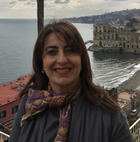
Funzione/Ruolo
Professoressa ordinaria di Metodi e Didattiche delle Attività Motorie presso l'Università Mediterranea di Reggio Calabria
Percorso professionale
Dopo la Laurea in Medicina e Chirurgia conseguita a Napoli presso la Seconda Facoltà di Medicina e Chirurgia (oggi “Luigi Vanvitelli”), nel 2000 consegue prima la Specializzazione in Farmacologia Clinica e poi il Dottorato in Fisiopatologia delle Malattie dell’Apparato Respiratorio. Durante il Dottorato, trascorre un periodo per un Followship presso l’Office of Health Policy and Clinical Outcomes, Thomas Jefferson University, Philadelphia (Pennsylvania). Nel 2002, inizia la sua carriera come Ricercatrice fino a diventare Professoressa Associata Metodi e Didattiche delle Attività sportive presso l'Università di Napoli "Parthenope", per poi entrare nella Commissione Scientifica del Centro Universitario di Ricerca Bioetica (C.I.R.B.) dell'Università Partehnope, nel CUG (Comitato Unico di Garanzia) e nel Collegio docenti per il dottorato di Ricerche in Scienze Motorie e del Benessere.
Nel 2022 consegue l’Abilitazione Nazionale (ASN) di I Fascia per il Settore Concorsuale di Scienze dell’Esercizio Fisico e dello Sport. Dal 2026 è professoressa ordinaria di Metodi e Didattiche delle Attività Motorie presso l'Università Mediterranea di Reggio Calabria.
Fa parte di diverse Comunità scientifiche.
Risultati scientifici
Il principale interesse di ricerca di Filomena Mazzeo riguarda gli aspetti della Farmacologia Clinica, in materia di impiego di farmaci e/o pratiche affini intese ad esaltare le prestazioni o comunque a conseguire un vantaggio nelle attività sportive (doping). Lo studio è diretto a tutte le sostanze farmacologicamente attive, compresi i nutraceutici e agli effetti tossici di tali sostanze, nonché a quelle per il recupero funzionale.
Attività editoriali e pubblicazioni
Filomena Mazzeo ha all'attivo numerose pubblicazioni su riviste nazionali ed internazionali. Di seguito una selezione recente:
(2022) Motti, M. L., Tafuri, D., Donini, L., Masucci, M. T., De Falco, V., & Mazzeo, F. The role of nutrients in prevention, treatment and post-coronavirus disease-2019 (COVID-19).Nutrients, 14(5):1000.
(2021) Mazzeo, F., Santamaria, S., & Onofrio, V. D. Data investigation on the performance-enhancing drugs spread in italy among young athletes: Prevention trough education and the fight against doping in sport. Journal of Human Sport and Exercise, 16(Proc2), 705-715.
(2020) Mazzeo, F., & Ascione, A. New technology and no drugs in sport: Gene doping regulation, education and research. Sport Science, 14, 18-23.
(2020) Mazzeo, F., Santamaria, S., Montesano, P., Rinaldi, M., & Madonna, G.). Updated evidence report for the anti-doping research: Analysis from 2008 to 2018 for performance-enhancing drugs and gene doping test development. Journal of Physical Education and Sport, 20, 2378-2385.
(2020) Filomena Mazzeo& Giuseppe Madonna. Sport, Physical Activity and Education in response to COVID-19. Italian Journal of Health Education, Sports and Inclusive Didactics.
(2020) Montesano P, Masala D, Di Silvestro M, Cipriani G, Tafuri D and Mazzeo F. Effects of combined training program, controlled diet and drugs on middle-distance amateur runners: a pilot study .Sport Science 13 (2020) 1: 17-22.
(2019) Mazzeo Filomena.Nutrition, supplements, and drugs to improve sports performance in order to educate for the correct intake and to promote health in primary school.Formazione & Insegnamento.Vol 17/3: 147-155.
(2019) Mazzeo Filomena.Attitude and practice of substance misuse and dietary supplements to improve performance in sport. Journal of Substance Use 24:6, 581-586.
(2019) Mazzeo, F., Santamaria, S., Donisi A., Montesano, P. Use and attitudes toward dietary supplements and drugs amongst Italian Elite Athletes and its correlation with banned doping substances. J Human Sport Exerc VOLUME 14 | Proc4 | 2019 | S964- 973 ISSN1988-5202
(2019) Mazzeo, F., Santamaria, S., & Montesano, P. Gender difference, nutritional supplements and drug use in sport to enhancing performance: an Italian revision over the last decade. Sport Mont, 17(1), 69-73.
(2019). Montesano, P., & Mazzeo, F.Sports activities in obese teenagers improve social inclusion and health. Sport Mont,17(1), 55-60.
(2018) Mazzeo F,Monda V, Santamaria S, Nigro E, Valenzano A, Villano I, et al. Antidoping program: an important factor in the promotion and protection of the integrity of sport and athlete’s health. J Sports Med Phys Fitness 58(7-8):1135-1145.
Riconoscimenti e premi
1999: Premio “Migliore lavoro scientifico presentato” alla Accademia Pontaniana dalla Società Italiana di Scienze Mediche e Chirurgiche di Napoli
2001: Premio di studio “Biagio Loscalzo”
2002: Borsa di studio della Società Italiana di Farmacologia (SIF) per soggiorno all’estero
2002: Premio di studio “Terme di Castellammare”
2002: Premio studio della SIT (Società Italiana Tossicologia)
2019: Premio Università & Calcio. Cattedra di Teoria, Metodologia & Didattica del calcio. Premio per Tecnici-Docenti che hanno contribuito alla perfetta realizzazione del Corso di TMD degli Sport negli a.c. 2017/2018 e 2018/19 con particolare riferimento alla Disciplina del calcio e alla diffusione dei valori e dei principi educativi dell’educazione motoria. (A.I.A.C & Univ Parthenope)
Riconoscimento 100.000 Top Scientists: primi centomila scienziati mondiali per l'impatto scientifico delle ricerche. Pubblicato sulla rivista internazionale Plos Biology uno studio a guida di John Ioannidis della Stanford University, di Kevin Boyack e Jeroen Baas, che illustra i ricercatori scientifici più citati nel mondo. Lo studio si basa sui dati ricavati a maggio 2020 dall'imponente database per la ricerca scientifica mondiale 'Scopus', dati poi aggiornati con gli indicatori di citazioni standardizzate per l’anno 2019, relativi a ben 7 milioni di ricercatori di università e centri di ricerca di tutto il mondo, in 22 campi scientifici e 176 sottocampi. Per ogni ricercatore viene indicato il settore in cui è attivo e il ranking corrispondente, differenziato tra ranking che includono i riferimenti di auto-citazioni e quelli che non li includono. Nell'elenco elaborato dall'Università di Stanford figurano 10 docenti e ricercatori dell'Università Parthenope fra i centomila scienziati mondiali per l'impatto scientifico delle loro ricerche.
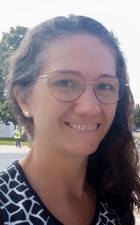
Area Economia e Finanza
Competenze: analisi degli impatti ambientali, economia circolare, sistemi di gestione integrati ambiente e sicurezza, valutazione e gestione della sostenibilità
Parole chiave: certificazioni ambientali, indicatori di gestione integrata, salute e sicurezza sul lavoro, valutazione di ciclo di vita
Regione: Veneto
Funzione/Ruolo
Professoressa associata in Scienze Merceologiche all’Università degli Studi di Padova, Dipartimento di Ingegneria Industriale.
Percorso professionale
Laureata in Ingegneria Gestionale all’Università di Padova nel 1998, inizia subito la sua attività di ricerca presso il Dipartimento di Processi Chimici dell’Ingegneria dello stesso Ateneo; nel 2000 consegue la specializzazione post lauream in Gestione e controllo dell’ambiente presso l’Università di Trento e nel 2005 il Dottorato di Ricerca in Ingegneria Gestionale presso l’Università di Padova. Prosegue la sua attività di ricerca presso il Dipartimento di Ingegneria Industriale dell’Università di Padova e nel 2020 diventa professoressa associata. Nel 2018 fonda il gruppo di ricerca SAM.lab, dove sviluppa metodologie e strumenti a supporto della valutazione e gestione della sostenibilità e formato nuove ricercatrici e nuovi ricercatori nel campo della valutazione di sostenibilità. Oggi insegna in diversi corsi di laurea triennale e magistrale dell’Ateneo patavino, tra cui: “Sistemi di gestione integrata ambiente e sicurezza” nel corso di laurea magistrale in Ingegneria della Sicurezza Civile e Industriale e “Life cycle assessment” nel corso di laurea magistrale in Sustainable Chemistry and Technocologies for Circular Economy.
Risultati scientifici
Ha collaborato alle attività di ricerca in numerosi progetti europei nelle linee di finanziamento Life Environment, Intelligent Energy Europe, CIP Innovation, Interreg, Equal. Dal 2016 ha assunto il coordinamento di un gruppo di lavoro all’interno dell’Associazione Rete Italiana LCA. Nel 2019 è entrata come esperta tecnica nel Comitato Interdisciplinare Rifiuti e Salute nominato dai Ministeri dell’Ambiente e della Salute per definire indicazioni e linee guida nella gestione sostenibile dei rifiuti. Nel 2021 è stata inserita nell’albo REPRISE del Ministero italiano della Ricerca e dell’Università, come esperta scientifica per la valutazione della ricerca. Nel 2022 è stata nominata Membro del Comitato Tecnico CEN UNI/CT 004/GL 15 Climate Change.
Attività editoriali e pubblicazioni
E’ autrice di oltre 160 pubblicazioni, tra cui:
[2021] Mazzi A. Ren J. Circular economy in low-carbon transition. Energies 14, 8061.
[2020] Mazzi A., Spagnolo M., Toniolo S. External communication on legal compliance by Italian waste treatment companies. Journal of Cleaner Production 255, 120325.
[2019] Toniolo S., Mazzi A., Simonetto M., Zuliani F., Scipioni A. Mapping diffusion of Environmental Product Declarations released by European program operators. Sustainable Production and Consumption 17, 85-94.
[2019] Toniolo S., Mazzi A., Mazzarotto G., Scipioni A. International Standards with a life cycle perspective: which dimension of sustainability is addressed?. International Journal of Life Cycle Assessment 24 (10), 1765-77.
[2018] Loss A., Toniolo S., Mazzi A., Manzardo A., Scipioni A., 2018. LCA comparison of traditional open cut and pipe bursting systems for relining water pipelines. Resources, Conservation and Recycling 128, 458-69.
[2017] Mazzi A., Toniolo S., Catto S., De Lorenzi V., Scipioni A. The combination of an environmental management system and life cycle assessment at the territorial level. Environmental Impact Assessment Review 63, 59-71.
[2017] Toniolo S., Mazzi A., Pieretto C., Scipioni A. Allocation strategies in comparative life cycle assessment for recycling: Considerations from case studies. Resources, Conservation and Recycling 117 (B), 249-61.
[2017] Toniolo S., Mazzi A., Fedele A., Aguiari F., Scipioni A. Life Cycle Assessment to support the quantification of the environmental impacts of an event. Environmental Impact Assessment Review 63, 12-22.
[2016] Mazzi A., Toniolo S., Manzardo A., Ren J., Scipioni A. Exploring the direction on the environmental and business performance relationship at the firm level. Lessons from a literature review. Sustainability 8, 1200.
[2016] Mazzi A., Toniolo S., Mason M., Aguiari F., Scipioni A. What are the benefits and difficulties in adopting an environmental management system? The opinion of Italian organizations. Journal of Cleaner Production, 139, 873-85.

Funzione/Ruolo
Direttrice associata per la Robotica e Direttrice del Laboratorio di Soft Robotics Boinispired all'Istituto Italiano di Tecnologia (IIT)
Percorso professionale
Dopo aver conseguito la laurea in Scienze Biologiche presso l'università degli Studi di Pisa nel 1995, entra a far parte dell'Istituto di Biofisica del Consiglio Nazionale delle Ricerche (CNR), dove si occupa di tematiche ambientali e in particolare dell'inquinamento da mercurio. Dal 1997 al 1998 segue un master in Gestione e Controllo dell'Ambiente (EMAS) alla Scuola Superiore Sant'Anna di Pisa (SSSA), con stage presso l'Ufficio Rischi Esteri di Responsabilità Civile e Infortuni, delle Assicurazioni Generali S.p.A. di Trieste. L'anno successivo è assistente di ricerca presso il Centro di Ricerca in Microingegneria (CRIM Lab) della Scuola Superiore Sant'Anna di Pisa, ruolo che ricopre fino al 2004. Dallo stesso anno fino al 2009 è Ricercatrice di Ingegneria Biomedica presso la stessa Scuola Superiore Sant'Anna. Nel novembre 2009 diventa Team Leader al Centro di Micro Bio-Robotica (CMBR) dell'Istituto Italiano di Tecnologia (IIT) di Genova. Nel 2011 consegue un dottorato di ricerca in Ingegneria dei Microsistemi presso l'Università Tor Vergata di Roma. Nello stesso anno diventa coordinatrice del CMBR dell'IIT, posizione che mantiene fino a marzo del 2021, quando diventa Direttrice associata per la Robotica e Direttrice del Laboratorio di Soft Robotics Boinispired, sempre presso l'IIT.
Risultati scientifici
L'ambito di ricerca di Barbara Mazzolai è la robotica soft e bioispirata, un'evoluzione della robotica che prevede l'utilizzo di materiali non rigidi e ispirati al mondo vivente, in particolare agli animali invertebrati e alle piante. Durante il suo periodo al CRIM Lab della Scuola Superiore Sant'Anna, Barbara Mazzolai fonda un nuovo ambito di ricerca specificatamente dedicato alle microtecnologie e alla robotica applicabili all'ambiente e all'agroalimentare, svolge il ruolo di project manager di progetti europei come Octopus, mirato allo sviluppo di un robot soft ispirato all'Octopus vulgaris, e DustBot, una rete di robot autonomi utilizzabili per la raccolta dei rifiuti porta-a-porta e per il miglioramento dell'igiene urbana. Arrivata alla direzione del Centro di Micro Bio-Robotica dell'IIT, fonda una nuova linea di ricerca nel campo della robotica bioispirata e soft robotics denominata "Plantoid", che mira alla realizzazione per la prima volta a livello mondiale di robot ispirati ai movimenti, alle capacità sensoriali e di comunicazione delle piante e delle loro radici per l'esplorazione del suolo e il monitoraggio ambientale.
Attività editoriali e pubblicazioni
Barbara Mazzolai è membro del gruppo editoriale di varie riviste scientifiche, quali Bioinspiration & Biomimetics, Soft Robotics, Biomimetics, Robotics & Automation Letters, Frontiers in Bionics and Biomimetics, Micro-BioRobotics.
È autrice di numerose pubblicazioni su riviste scientifiche internazionali, fra cui:
(2016) Laschi C, Mazzolai B, Cianchetti M. Soft robotics: Technologies and systems pushing the boundaries of robot abilities. Science Robotics, 1:(1).
(2016) Larson C, Peele B, Li S, Robinson S, Totaro M, Beccai L, Mazzolai B, Shepherd R. Highly stretchable electroluminescent skin for optical signaling and tactile sensing. Science, 351(6277): 1071-1074.
(2016) Argiolas A, Puleo GL, Sinibaldi E, Mazzolai B. Osmolyte cooperation affects turgor dynamics in plants. Scientific Reports, 6.
(2016) Mazzolai B, Mattoli V. Robotics: Generation soft. Nature, 536 (7617), 400-401.
(2014) Sadeghi A, Tonazzini A, Popova L, Mazzolai B. A Novel Growing Device Inspired by Plant Root Soil Penetration Behaviors. PLoS ONE, 9:(2).
(2014) Sinibaldi E, Argiolas A, Puleo GL, Mazzolai B. Another lesson from plants: the forward osmosis-based actuator. PLoS ONE, 9(7): e102461.
(2014) Tramacere F, Kovalev A, Kleinteich T, Gorb SN, Mazzolai B. Structure and mechanical properties of Octopus vulgaris suckers. Journal of the Royal Society Interface, 11: 91, 20130816.
(2013) Tramacere F, Beccai L, Kuba M, Gozzi A, Bifone A, Mazzolai B. The Morphology and Adhesion Mechanism of Octopus vulgaris suckers. PLoS ONE, 8(6): e65074.
(2012) Mazzolai B, Margheri L, Cianchetti M, Dario P, Laschi C. Soft robotic arm inspired by the octopus. II. From artificial requirements to innovative technological solutions. Bioinspiration & Biomimetics, 7 025005.
(2011) Mazzolai B, Mondini A, Corradi P, Laschi C, Mattoli V, Sinibaldi E, Dario P. A Miniaturized Mechatronic System Inspired by Plant Roots. IEEE Transaction on Mechatronics, 16(2), 201-212.
Riconoscimenti e premi
Nel 2010 Barbara Mazzolai riceve il premio "Marisa Bellisario" per l'attività scientifica e di gestione del progetto "DustBot", nel 2013 è insignita del Premio Pio Manzù con la Medaglia del Senato della Repubblica italiana per il suo impegno di scienziata per lo sviluppo di tecnologie che aprono nuove strade allo sviluppo sostenibile. Con le stesse motivazioni nel 2015 riceve il premio internazionale Genova: una donna fuori dal coro.
Nel settembre 2021 viene nominata fra le 50 donne italiane di maggiore ispirazione per il mondo della tecnologia con il riconoscimento InspiringFifty for Italy.

Area Politica internazionale
Competenze: dinamiche di polarizzazione e identitarie nel Medio Oriente contemporaneo, geopolitica nell'area euro-mediterranea, minoranze etno-religiose, questioni politiche e sociali nella Libia contemporanea, questioni politiche e sociali nell’Egitto contemporaneo, relazioni internazionali nell'area euro-mediterranea, storia contemporanea del Nord Africa e del Medio Oriente
Parole chiave: autoritarismo, Berberi, Copti, coronavirus, Covid-19, crisi economica, Egitto, geopolitica, Libia, Medio Oriente, minoranze, Nord Africa, repressione, securitizzazione della pandemia, sicurezza, Ucraina
Regione: Lazio
Funzione/Ruolo
Ricercatrice presso il Dipartimento di Scienze Sociali ed Economiche, Università di Roma La Sapienza. Professoressa aggregata di Storia del Nord Africa e del Medio Oriente e di Globalizzazione e Relazioni Internazionali presso il Dipartimento di Scienze Sociali ed Economiche, Università di Roma La Sapienza.
Percorso professionale
Alessia Melcangi si laurea nel 2008 in Storia Contemporanea presso l’Università di Catania. Dopo aver conseguito il dottorato in Pensiero politico e istituzioni nelle società mediterranee, presso la Facoltà di Scienze Politiche dell’Università di Catania nel 2011, svolge diverse missioni di studio e ricerca in Francia, Inghilterra, Egitto e Giordania. Nel 2008 è visiting research fellow presso il Centre d’Études et de Documentation Économiques, Juridiques et Sociales (CEDEJ) e presso il Dominican Institute for Oriental Studies (IDEO) del Cairo. È titolare di un assegno di ricerca dal 2013 al 2014 presso il Dipartimento di Scienze Politiche e Sociali dell’Università di Catania, dal 2017 al 2018 presso il Dipartimento di Scienze Sociali ed Economiche (DiSSE) dell’Università di Roma La Sapienza e responsabile della ricerca su “Stati-nazione e minoranze nei paesi dell’Africa mediterranea” nell’ambito del Programma di Ricerca Scientifica di Rilevante Interesse Nazionale (PRIN), anno 2010-2011 del MIUR.
Dal 2016 collabora con il Centro di Ricerche sul Sistema Sud e il Mediterraneo allargato – CRiSSMA dell’Università Cattolica del Sacro Cuore di Milano ed è docente del Master universitario di I livello “Migrazione e Sviluppo – Migration and Development” del Dipartimento di Scienze Sociali ed Economiche dell’Università di Roma La Sapienza, docente del Master universitario di I livello “Middle Eastern Studies” (MIMES) dell’Università Cattolica del Sacro Cuore di Milano e membro del comitato scientifico di indirizzo di ReaCT-Osservatorio sul Radicalismo e il Contrasto al Terrorismo. Da maggio 2019 è Ricercatrice a tempo determinato B presso il Dipartimento di Scienze Sociali ed Economiche dell’Università di Roma La Sapienza.
Risultati scientifici
Alessia Melcangi si occupa da diversi anni di storia contemporanea del Nord Africa e del Medio Oriente, geopolitica e relazioni internazionali nell’area euro-mediterranea, minoranze etno-religiose, dinamiche di polarizzazione e identitarie nel Medio Oriente contemporaneo (in particolare i copti e i berberi) e di questioni politiche e sociali nell’Egitto e nella Libia contemporanei. In riferimento a questi temi ha pubblicato diverse monografie, articoli e policy papers su riviste e volumi italiani e internazionali.
Ha partecipato alle attività del Centro di Ricerche sul Sistema Sud e il Mediterraneo Allargato (CRiSSMA) nell’ambito delle ricerche sul contesto politico, economico e di sicurezza contemporaneo della Libia; collabora a un progetto sulla libertà e i diritti umani coordinato dal CRiSSMA e dal The Royal Institute for Inter-Faith Studies (RIIFS) di Amman, nell’ambito delle ricerche sul dialogo interreligioso; nell’ambito della difesa e sicurezza svolge attività di indirizzamento e di ricerca presso ReaCT – Osservatorio sul Radicalismo e il Contrasto al Terrorismo.
Attività editoriali e pubblicazioni
[2018] Melcangi A, Statualità e minoranze: meccanismi di resistenza e integrazione in Medio Oriente. Il caso dei cristiani copti in Egitto, Ledizioni.
[2018] Melcangi A, Divide et impera: the political application of sectarianism in the Egyptian context. From the Sadat years to the reign of Mubarak (1970-2011), in Demichelis M (ed.), “Religious Violence, Political Ends. Nationalism, citizenship and radicalizations in the Middle East and Europe”, Georg OLMS Verlag, Hildesheim 2018, pp. 35-53.
[2018] Melcangi A, Fanfani auspica giorni più sereni agli italiani in Egitto. La comunità italiana nell’Egitto di Gamal‘Abdal-Nasser e la visita di Fanfani attraverso l’analisi dei documenti diplomatici italiani, in Ventunesimo Secolo. Rivista di studi sulle transizioni, 43, FrancoAngeli.
[2018] Melcangi A, “Gli aqbāt al-mahjar e l’internazionalizzazione della questione copta dagli anni Settanta al regime di Mubarak”, in El Houssi L (ed.), in Minoranze in Nord Africa e Medio Oriente tra tradizione e modernità, numero monografico di “Ricerche Storiche”, XLVIII, 1, pp. 19-33.
[2017] Melcangi A, I copti nell’Egitto di Nasser. Tra politica e religione (1952-1970), Carocci.
[2017] Melcangi A,“Under the Same Flag”: the Copts of Egypt and the challenges of Nasserist Nationalism”, in Demichelis M, Maggiolini P. (eds.), The Struggle to Define a Nation: Rethinking Religious Nationalism in the Contemporary Islamic World, Gorgias Press, pp. 161-194.
[2016] El Houssi L, Melcangi A, Torelli S, Cricco M (eds.), North African Societies after the Arab Spring: Between Democracy and Islamic Awakening, Cambridge Scholars Publishing.
[2016] Melcangi A, ‘Church, Intellectuals and Youth Movements: Contemporary Understandings of Secularism and Tradition within the Egyptian Coptic Community’, in El Houssi L, Melcangi A, Torelli S, Cricco M.(eds.), North African Societies after the Arab Spring: Between Democracy and Islamic Awakening, Cambridge Scholars Publishing, pp. 102-129.
[2015] Melcangi A, ‘Identità contestata, identità condivisa. I copti tra nazionalismo e rivendicazioni comunitarie nell’Egitto contemporaneo’, in Cresti F. (ed.), Minoranze, pluralismo, stato nell’Africa mediterranea e nel Sahel, Aracne, pp. 155-198.
[2013] Melcangi A., ‘La questione confessionale nell’Egitto post-rivoluzionario’, in Cantaro A (ed.), Dove vanno le primavere arabe?, Ediesse, pp. 83-90.
[2008] Melfa D, Melcangi A, Cresti F. (eds.), Spazio privato, spazio pubblico e società civile in Medio Oriente e in Africa del Nord, Giuffré.
Riconoscimenti e premi
Melcangi è membro del comitato scientifico di diverse organizzazioni (ReaCT – Osservatorio sul Radicalismo e il Contrasto al Terrorismo, The Square – Mediterranean Centre for Revolutionary Studies), associazioni nazionali ed internazionali (Middle East Studies Association, Società Italiana di Storia Internazionale, British Society for Middle Eastern Studies; Società per gli Studi sul Medio Oriente - SeSaMO) e della segreteria scientifica della rivista pubblicata dalla Franco Angeli Storia Urbana, Rivista di studi sulle trasformazioni della città e del territorio in età moderna.
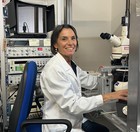
Funzione/Ruolo
Professoressa Ordinaria di Farmacologia dell’Università degli studi di Cagliari
Percorso professionale
Dopo la laurea in Farmacia all’Università di Palermo nel 1993, si è trasferita a Cagliari alla fine del 1994 per imparare le tecniche di elettrofisiologia in vivo presso il Dipartimento di Neuroscienze dell’Università degli studi di Cagliari. Nel 2000 si è trasferita a San Francisco, dove ha svolto attività di ricerca presso il centro “Ernest Gallo Clinic and Research Center” della University of California San Francisco (UCSF). Nel 2011 ha conseguito il dottorato in Neuroscienze a Cagliari e successivamente visitato il Department of Neuroscience presso il Biomedical Center (Lund University, Svezia). Nel 2023 è diventata professoressa ordinaria di Farmacologia al Dipartimento di Scienze Biomediche dell’Università di Cagliari, dove era già professoressa associata dal 2016, e in cui dirige un laboratorio di Neuropsicofarmacologia preclinica.
Risultati scientifici
I principali interessi scientifici di Miriam Melis riguardano lo studio della vulnerabilità ai disturbi mentali attraverso lo sviluppo di modelli murini di alterata funzionalità dei sistemi dopaminergico ed endocannabinoidergico, per comprendere come la loro interazione evolva in condizioni di salute o di malattia nella finestra temporale di sensibilità del neurosviluppo che include l’infanzia e la preadolescenza. Il suo approccio di biologia multiscala attraverso analisi del comportamento, di immunoistochimica, trascrittomica e di chemo- e opto- genetica consente di rispondere, con un’alta risoluzione spazio-temporale e a livello cellulare, alle domande riguardanti i circuiti cerebrali coinvolti negli eetti fisiopatologici osservati a livello comportamentale. La sua ricerca è finanziata da Enti Nazionali (es. MUR, MSAL, RAS, FdB) e Internazionali (es. NIH, ENI CBC MED, UFI/UIF) fra cui la Commissione Europea per la Ricerca che ha finanziato il suo progetto REDIRECT presentato nell’ambito degli ERC Consolidator Grant (call 2022). Nel 2019 è stata eletta coordinatrice della Gordon Research Conference for Cannabinoid Functions in the CNS che ha organizzato in Spagna nel 2023.
Attività editoriali e pubblicazioni
Miriam Melis è autrice di più di 100 pubblicazioni scientifiche, ha curato due libri per le case editrici Elsevier e SpringerLink. La lista completa si può trovare al seguente link istituzionale https://web.unica.it/unica/it/ateneo_s07_ss01_sss05_ssss01.page?contentId=SHD30514.
Riconoscimenti e premi
Per le sue scoperte ha ricevuto diversi premi:
2004: National Institute of Drug of Abuse (NIDA), “Frontiers in Addiction Research: Young Investigators Poster Session” San Diego, CA (USA), 22 ottobre 2004.
2005: Premio 2005 Farmindustria-SIF per le ricerche farmacologiche precliniche. 32° Congresso della Società Italiana di Farmacologia (SIF). Napoli (Italia), 1-4 giugno 2005.
2010: Premio “Talento delle Idee” per migliore idea imprenditoriale innovativa sponsorizzato da Banca Unicredit e Confindustria (Prima classificata nella selezione Macroregioni): Palermo, 31 maggio 2010.
2011: Premio “Work and Learn 36” finanziato dalla Regione Sardegna e l’Università degli studi di Cagliari, Cagliari 16 aprile 2011.
2022: Premio “Gill Award for Transformative Research in Neuroscience” da Gill Center for Biomolecular Science at Indiana University. Bloomington, USA.
2024: Premio “Donna di Scienza” dall’Associazione ScienzaSocietàScienza per il “contribuito a dare prestigio e avanzamenti alla Sardegna in campo scientifico” Sesta Edizione (12 novembre 2024).

Funzione/Ruolo
Vice Presidente BT Security EMEA & APAC at BT
Percorso professionale
Laureata in informatica e matematica alla Bar-Ilan University di Tel Aviv, consegue successivamente un MBA in tecnologie e innovazione al Technion, l’Israel Institute of Technology di Haifa.
Dal 2003 al 2008 lavora in Avnet Information Security & Risk Managementm arrivando a ricoprire il ruolo di VP Products and Services. Nel 2008 lavora in Eurekify, con il ruolo di Vice Presidente EMEA (Europe, Middle East, Africa). Dal 2009 al 2015 è in CA Technogies, con il ruolo iniziale di Direttrice delle vendite EMEA e poi di Capo della Strategia per la sicurezza, sempre in area EMEA. Dal 2016 al 2018 è in HP, dove guida le attività ESS (Enterprise Security Services) in qualità di Responsabile per il Sud dell'area EMEA. Nel marzo 2018 approda in BT, dove guida un team pan-europeo di esperti di sicurezza che proteggono alcune delle più importanti e complesse organizzazioni a livello mondiale contro le sempre più crescenti minacce informatiche.
Risultati scientifici
Nel corso degli anni ha sviluppato significative esperienze nel campo della sicurezza informatica, sia in ambito militare che civile/commerciale, oltre a competenze ed esperienze cyber focalizzate a mitigare le crescenti minacce informatiche. E’ stata tra le prime esperte di sicurezza di sistemi ERP, seguendo in qualità di Security Advisor più di 30 progetti. Una significativa esperienza è stata inoltre maturata sul tema dell’Identity and Access Management, avendo contribuito attivamente alla creazione di una start-up poi acquisita da CA Technogies. In BT ha approfondito tematiche di Cyber Intelligence partecipando attivamente a gruppi di lavoro volti a sfruttare le potenzialità dell'intelligenza artificiale applicata alla Cyber Security.
Grazie alle esperienze e conoscenze maturate figura spesso tra i relatori delle principali conferenze e convegni del mondo sulla sicurezza informatica. Alcuni esempi: RSA conference di San Francisco, Kuppinger Cole EIC conference di Monaco, Cyberweek di Tel Aviv, Security summit di Milano e Forum PA di Roma.
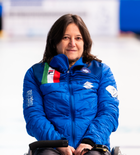
Funzione/Ruolo
Atleta Paralimpica di wheelchair curling, allenatrice di curling 1° livello, Consigliere Atleti in Federazione Italiana Sport Ghiaccio
Percorso professionale
Dopo un incidente d’auto nel centro di Cortina all'età di 15 anni ha iniziato a praticare lo sci di fondo nel 1988 arrivando a partecipare alle Paralimpiadi di Albertville 1992.
Dopo aver abbandonato le competizioni sportive per 10 anni ha dedicato il suo tempo al lavoro e alla famiglia, iniziando le figlie alla pratica sportiva.
Nel 2007 ha iniziato per “gioco” a praticare il wheelchair curling arrivando nel 2010 a partecipare alle Paralimpiadi di Vancouver 2010 nel ruolo di Lead (primo tiratore). conquistando il 5° posto. Ha preso parte ai vari mondiali B e A sempre nel ruolo di Lead. Nella stagione 2020-2021 ha ricoperto il ruolo di Skip (capitano) riportando l’Italia nel gruppo
A dopo ben 10 anni di assenza. Nelle stagioni 2023/2024 e 2024/2025 insieme a Matteo Ronzani ha conquistato il titolo di campionessa Italiana nella specialità del Double Mix.
Ha partecipato ai vari campionati Italiani a squadre dal 2010 a oggi, prima con il Curling Club 66 e poi con il Dolomiti Curling Club.
Dal 2018 è Consigliera Federale in Rappresentanza degli Atleti della Federazione Italiana Sport Ghiaccio.
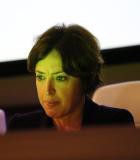
Area STEM: Psicologia e neuroscienze
Competenze: neuropsicologia dello sviluppo
Parole chiave: apprendimento, coronavirus, Covid 19: impatto psicologico su bambini e adolescenti, Covid-19 in età pediatrica, deficit di attenzione e iperattività, dislessia, disturbi dello sviluppo, linguaggio, sindromi genetiche, terapia dislessia
Regione: Lazio
Funzione/Ruolo
Psicologa e Psicoterapeuta presso l'Unità di Neuropsichiatria Infantile dell'Istituto Scientifico di Ricerca e Cura Bambino Gesù di Roma
Percorso professionale
Dopo la laurea in Psicologia dello Sviluppo e dell'Educazione presso La Sapienza di Roma, prosegue la sua formazione con un Perfezionamento in Psicopatologia dell'Apprendimento presso l'Università di San Marino. Dal 1998 svolge attività di ricerca presso l'Ospedale Pediatrico Bambino Gesù. Nel 2004 consegue il Dottorato di Ricerca in Scienze cognitive e della Riabilitazione presso la L.U.M.S.A. di Roma. Nel 2013 ottiene un contratto di assunzione a tempo indeterminato, come Psicologa, Dirigente I livello, presso il Dipartimento di Neuroscienze, U.O.C. Neuropsichiatria Infantile dell'Ospedale Pediatrico Bambino Gesù di Roma, responsabile prof. Stefano Vicari. Nel 2014 ottiene l'abilitazione nazionale come professoressa associata per l'insegnamento di Psicologia Generale, Psicobiologia, Psicometria. Ha insegnato Psicofisiologia e Neuropsicologia e Tecniche di Osservazione del Comportamento Infantile e Neuropsicologia Comportamentale presso l'Università Europea di Roma. E' specializzata in Psicoterapia cognitivo-comportamentale. Svolge attività didattica in diversi Master di Neuropsicologia e Scuole di Specializzazione ad orientamento Cognitivo Comportamentale. Svolge attività clinica di diagnosi dei disturbi dell'apprendimento e dello sviluppo. Coordina un gruppo di ricerca che si occupa della sperimentazione e applicazione di tecniche riabilitative innovative come la stimolazione cerebrale non invasiva per il trattamento di disturbi evolutivi come la dislessia.
Risultati scientifici
I suoi interessi di ricerca riguardano lo studio del profilo neuropsicologico di diversi disturbi dello sviluppo, come i disturbi dell'apprendimento, del linguaggio, il deficit di attenzione e iperattività e la disabilità intellettiva. Il suo ambito di ricerca è lo studio dei correlati neurobiologici e della relazione fra il cervello e il profilo neuropsicologico dei disturbi dello sviluppo. Dal 2012 Deny Menghini e il suo team di ricercatori dell'Ospedale Pediatrico Bambino Gesù di Roma, in collaborazione con il Laboratorio di stimolazione cerebrale della Fondazione Santa Lucia, hanno iniziato ad utilizzare a fini sperimentali una nuova tecnica per il trattamento della dislessia. La tecnica impiegata viene definita stimolazione cerebrale non invasiva e permette di stimolare in maniera indolore e miratamente le aree cerebrali in cui si osserva una minore attività cerebrale nelle persone con dislessia. Visti i risultati preliminari incoraggianti, la ricerca sta proseguendo aumentando il numero di partecipanti coinvolti nello studio e definendo il protocollo più efficace (ad esempio, il numero di incontri necessari, le specifiche aree cerebrali da stimolare e la durata ottimale dell'intervento) in modo da poterlo presto estendere alla pratica clinica.
Attività editoriali e pubblicazioni
Autrice di numerose pubblicazioni scientifiche su riviste nazionali ed internazionali fra cui:
[2018] Costanzo F, Rossi S, Varuzza C, Varvara P, Vicari S, Menghini D. Long-lasting improvement following tDCS treatment combined with a training for reading in children and adolescents with dyslexia. Neuropsychologia.
[2018] Menghini D, Armando M, Calcagni M, Napolitano C, Pasqualetti P, Sergeant JA, Pani P, Vicari S. The influence of Generalized Anxiety Disorder on Executive Functions in children with ADHD. Eur Arch Psychiatry Clin Neurosci. 268(4):349-357.
[2016] Costanzo F, Varuzza C, Rossi S, Sdoia S, Varvara P, Oliveri M, Giacomo K, Vicari S, Menghini D.. Evidence for reading improvement following tDCS treatment in children and adolescents with Dyslexia. Restorative Neurology and Neuroscience, 34(2):215-26.
[2016] Costanzo F, Varuzza C, Rossi S, Sdoia S, Varvara P, Oliveri M, Koch G, Vicari S, Menghini D. Reading changes in children and adolescents with dyslexia after transcranial direct current stimulation. Neuroreport, 27(5):295-300.
[2015] Costanzo F, Menghini D, et al. Transcranial Direct Current Stimulation Treatment in an Adolescent with Autism and Drug-Resistant Catatonia.Brain Stimulation 8(6).
[2015] De Crescenzo F, Licchelli S, Ciabattini M, Menghini D, et al. The use of actigraphy in the monitoring of sleep and activity in ADHD: A meta-analysis. Sleep Medicine Reviews 26.
[2014] Varvara P, Varuzza C, Sorrentino AC, Vicari S, Menghini D. Executive functions in developmental dyslexia. Frontiers in Human Neuroscience, 8:120.
[2013] Costanzo F, Menghini D, Caltagirone C, Oliveri M, Vicari S. How to improve reading skills in dyslexics: the effect of high frequency rTMS. Neuropsychologia, 51(14):2953-9.
[2012] Costanzo F, Menghini D, Caltagirone C, Oliveri M, Vicari S. High frequency rTMS over the left parietal lobule increases non-word reading accuracy. Neuropsychologia, 50(11):2645-51.
[2011] Menghini D, Costanzo F, Vicari S. Relationship between brain and cognitive processes in Down syndrome. Behavior Genetics, 41(3):381-93.
Riconoscimenti e premi
Nel 2010 ha ottenuto un Grant della Fondation Jerome Lejeune per un progetto di ricerca sui correlati cerebrali nella sindrome di Down.
Nel 2012 ha ricevuto un finanziamento dal Ministero della Salute nell'ambito del Young Italian Researchers Grant grazie al quale è nato il gruppo di ricerca per innovazioni terapeutiche nei disturbi dello sviluppo.

Area Politica internazionale
Competenze: cooperazione e sviluppo, economia informale in Asia, Africa e America Latina, economia politica dell'India, economia politica internazionale, globalizzazione e sviluppo, povertà e lavoro, storia del femminismo nello sviluppo
Parole chiave: catene globali di produzione, commercio equo e solidale, coronavirus, Covid-19: impatto sulle ineguaglianze, fabbriche globali, filiera globale del tessile, India, responsabilità sociale di impresa, riproduzione sociale e sviluppo, standard globali sul lavoro
Regione: ESTERO
Funzione/Ruolo
Senior Lecturer in Development Studies alla School of Oriental and African Studies (SOAS) University of London
Percorso professionale
Mezzadri è una economista laureatasi alla Sapienza con 110/100 e lode nel 2000. Dopo esperienze di insegnamento in Italia e Svizzera con la European School of Economics, ottiene un Master e un dottorato di ricerca presso la SOAS di Londra. Nel 2008 viene assunta dalla sua alma mater come docente, e ad oggi viene promossa a professoressa associata.
Risultati scientifici
La ricerca di Mezzadri verte su globalizzazione, mercati del lavoro e povertà. Si occupa prevalentemente di catene globali di produzione nel tessile ed abbigliamento, di standard sul lavoro, responsabilità sociale di impresa e commercio equo. La ricerca di Mezzadri è stata finanziata dalla ESRC e British Academy.
Attività editoriali e pubblicazioni
Selezione di libri
[2017] Mezzadri A, The Sweatshop Regime: Labouring Bodies, Exploitation and Garments Made in India. Cambridge: Cambridge University Press.
Selezione di articoli
[2021] Barnett BS, Carlo AD, Ruwanpura K, Mezzadri A. 'The Invisible People Behind Our Masks'. Annals of Internal Medicine.
[2021] Stevano S, Mezzadri A, Lombardozzi L, Bargawi H. 'Hidden Abodes in Plain Sight: The Social Reproduction of Households and Labour in the COVID-19 pandemic'. Feminist Economics.
[2020] Mezzadri A, Ruwanpura K. How Asia’s clothing factories switched to making PPE – but sweatshop problems live on, SOAS Research Online.
[2020] Mezzadri A, A crisis like no other: social reproduction and the regeneration of capitalist life during the COVID-19 pandemic, SOAS Research Online.
[2017] Mezzadri A, Lulu F, ‘Classes of Labour’ at the Margins of Global Commodity Chains in India and China'. Development and Change, (49) 4, pp 1034-1063.
[2017] Mezzadri A, Prentice R, De Neve G, Ruwanpura K, 'Health and Safety in Garment Workers’ Lives: Setting a New Research Agenda'. Geoforum, (88) Jan, pp 157-160.
[2016] Mezzadri A,'Class, gender and the sweatshop: on the nexus between labour commodification and exploitation'. Third World Quarterly, (37) 10, pp 1877-1900.
[2016] Mezzadri A,The informalization of capital and interlocking in labour contracting networks'. Progress in Development Studies, (16) 2, pp 124-139.
[2015] Mezzadri A,Why inequality matters – for the rich and the poor'. The Conversation UK [Online].
[2015] Mezzadri A,A ‘song of the wage’ for Rana Plaza'. New Internationalist.
[2015] Mezzadri A, 'Free to stitch, or starve capitalism and unfreedom in the global garment industry''. Open Democracy: Beyond Trafficking and Slavery.
[2014] Mezzadri A,'Cambodian sweatshop protests reveal the blood on our clothes'. The Conversation UK.
[2014] Mezzadri A,'Indian Garment Clusters and CSR Norms: Incompatible Agendas at the Bottom of the Garment Commodity Chain'. Oxford Development Studies, (42) 2, pp 217-237.
[2014] Mezzadri A,'Backshoring, local sweatshop regimes and CSR in India'. Competition and Change, (18) 4, pp 327-344.
[2014] Mezzadri A,'Are Ethical Initiatives Successful in the Indian Garment Industry? A Focus on Homeworkers'.Development Viewpoint 83.
Riconoscimenti e premi
Young Scholar Award, Indian Society For Labour Economics.

Area Politica internazionale
Competenze: cooperazione territoriale, politiche europee in tema di migrazioni, politiche internazionali in tema di migrazioni, sistemi di accoglienza e asilo dei migranti
Parole chiave: Africa occidentale, Corno d'Africa, diaspora, migranti, migrazioni, Nord Africa
Regione: Lombardia
Funzione/Ruolo
Direttrice del progetto MENTOR2 e Collaboratrice del thank tank CeSPI (Centro Studi di Politica Internazionale) come esperta senior di migrazioni internazionali e studi sullo sviluppo.
Percorso professionale
Petra Mezzetti ha fatto parte del team che redige il Rapporto sullo Sviluppo Umano (Human Development Report) – HDR 2000-2001 e 2002. Ha collaborato con l’Alto Commissariato per i Diritti dell’Uomo a Ginevra; ha successivamente iniziato a collaborare con il CeSPI (Centro Studi di Politica Internazionale) lavorando su progetti in tema di cooperazione decentrata e territoriale e su migrazioni internazionali per diversi committenti (MAECI; OIM; UNHCR; WB; FIIAP; Ministero dell’Interno; Fondazioni Bancarie, Comune di Milano). Parallelamente ha completato un dottorato di ricerca in studi urbani europei (URBEUR) e svolto attività di consulenza e di valutazione per ICMPD su processi intergovernativi in Africa (i.e. Processo di Rabat). Ha un Dottorato in Studi Europei Urbani (Bicocca, Milano) e un Master in Economia dello Sviluppo (IUSS, Pavia). Si è laureata con lode in Lettere Moderne presso l’Università di Bologna.
E' direttrice di MENTOR2 il progetto del Comune di Milano finanziato dall'Unione Europea, sulla migrazione legale fra Italia, Tunisia e Marocco.
Risultati scientifici
Si occupa di monitoraggio e valutazione del sistema di accoglienza in Italia. Dal 2017, all’interno del progetto MIRECO - Monitoring Improvement of REception COnditions - su fondi FAMI, è responsabile insieme ad un team di esperti per la valutazione e il monitoraggio del sistema di accoglienza italiano (creazione di strumenti, redazione di linee guida, missioni sul campo) in collaborazione con UNHCR e la committenza, in particolare Ministero dell’Interno DLCI e le Prefetture.
Dal 2014 al 2019 all'interno dell'Iniziativa Fondazioni for Africa Burkina Faso, finanziata da ACRI (Associazione di Fondazioni e di Casse di Risparmio) è responsabile di diverse azioni di formazione, progettazione, facilitazione di partenariati e capitalizzazione che hanno visto il coinvolgimento diretto delle associazioni della diaspora burkinabè residente in Italia in diverse regioni. In particolare è responsabile per la selezione, accompagnamento e monitoraggio di alcuni proposte progettuali sviluppate da organizzazioni burkinabè e associazioni del Terzo settore in alcuni contesti locali in Italia in diverse regioni, per l'organizzazione di seminari di riflessione e di una pubblicazione in corso.
All’interno del progetto MENTOR - MEditerranean Network for Training Orientation to Regular migration, finanziato dall'UE attraverso la Mobility Partnership Facility implementata da ICMPD (International Center for Migration and Policy development), con capofila Comune di Milano, ha svolto (2017-2018) il ruolo di ricercatrice senior per la redazione di Linee Guida sul funzionamento del meccanismo per tirocini per giovani tra Italia-Tunisia e Marocco, come misura di sviluppo locale e di migrazione legale e circolare.
Attività editoriali e pubblicazioni
[2019] Mezzetti P., Ceschi S. (a cura di), Ripartire dall'Africa. Esperienze e iniziative di migrazione e di co-sviluppo, Donzelli Editore
[2018] Mezzetti P., "La situazione drammatica, persistente e poco nota degli sfollati interni2, in Frigeri D. e Zupi M. (a cura di), Dall'Africa all'Europa. La sfida politica delle migrazioni, Roma, Donzelli.
[2016] Mezzetti P., "I percorsi e i flussi, al presente e in prospettiva", Prospettive Sociali e Sanitarie, Speciale WelforumEmergenza profughi: quale accoglienza? 1.2-1.3,: 5-9.
[2016] Mezzetti P., Ayuso A., "Tackling Inequality in Cities through Social Innovation" in Call J. (a cura di), Wise Cities. A New Paradigm for Urban Resilience, Sustainability and Well-being, CIDOB, October, Barcelona.
[2016] Mezzetti P., Ayuso A., ‘Tackling Inequality in Cities through Social Innovation’, in Call J. (a cura di), Wise Cities. A New Paradigm for Urban Resilience, Sustainability and Well-being, CIDOB, October, Barcelona.
[2015] Mezzetti P., Ceschi S., The European Union and transnational policy networks in the migration field, in Contemporary Politics, 21(3):1–18.
[2015] Mezzetti P., Coslovi L. e Stocchiero A., Quale spazio per la società civile nel Processo di Khartoum?,Policy brief di Dicembre, Roma, CeSPI.
[2015] Ceschi S., Massimi A., Mezzetti P., Soddu P., La diaspora africana in Italia. Una risorsa nelle relazioni Italia-Africa,Paper redatto per il Seminario Italia-Africa: quale ruolo strategico per la diaspora? - Roma, 15 maggio, Ministero degli Affari Esteri e della Cooperazione Interazionale (MAECI).
[2014] Mezzetti P., Ceschi S., The Senegalese Transnational Diaspora and its role back Home, ITPCM, International Commentary, ISSN. 2239-7949, X, 35, April 2: 13-18.
[2014] Mezzetti P., Saggiomo V., Pirkkalainen P., “Interaction between Somali organisations and Italian and Finnish development actors” in Laakso, L. and Hautaniemi. P. (Eds.) Diasporas for Peace: Case Studies from the Horn of Africa. London: ZED Books.
[2014] Mezzetti P., Bayés Puig S., Andrés Sancho L., Defontaine M., Mato Brey J., Monitoring of the Dakar Strategy Roadmap, Final Report, Processus de Rabat.
[2013] Mezzetti P., Pirkkalainen P., Guglielmo M., Somali Associations’ Trajectories in Italy and Finland: Leaders building trust and finding legitimisation, in JEMS, Journal of Ethnic and Migration Studies, August, 39 (8): 1261-1279.
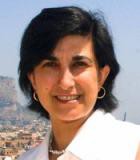
Funzione/Ruolo
Dirigente di Ricerca presso l'Istituto Nazionale di Astrofisica; Direttrice dell'INAF - Osservatorio Astronomico di Palermo
Percorso professionale
Dopo la laurea in Fisica, conseguita presso l'Università degli Studi di Palermo, nel 1983, vince una borsa di studio del CNR grazie alla quale nel 1985 trascorre un periodo presso l'Harvard Smithsonian Center for Astrophysics - una delle principali istituzioni scientifiche mondiali nell'ambito dell'astrofisica - dove partecipa all'analisi dei dati stellari ottenuti con il satellite Einstein lanciato qualche anno prima. Usufruisce poi di una borsa di studio presso l'Istituto per le Applicazioni Interdisciplinari della Fisica del CNR. Nel 1991 consegue il dottorato in Fisica presso l'Università degli Studi di Palermo con una tesi dal titolo: "L'emissione di fondo nella banda 0.16-3.5 keV osservata con l'Imaging Proportional Counter a bordo del satellite Einstein. Il contributo degli AGN e della componente stellare della Galassia". Dopo il dottorato diventa astronoma presso l'Osservatorio Astronomico di Palermo. Trascorre un periodo presso il Dipartimento di Astronomia e Astrofisica dell'Università di Chicago grazie a una borsa di studio CNR/NATO Senior. Oggi è Dirigente di Ricerca e direttrice dell'Osservatorio Astronomico di Palermo, una struttura di ricerca dell'Istituto Nazionale di Astrofisica.
Risultati scientifici
La sua attività scientifica si è focalizzata sullo studio della fisica dell'alta atmosfera stellare e temi correlati. In particolare è stata fra i primi ricercatori a svolgere attività di ricerca sulle corone delle stelle giovani attraverso osservazioni di ammassi aperti e regioni di formazione stellare con missioni spaziali (Einstein, Rosat, Chandra, XMM/Newton), determinando come la radiazione ad alta energia in queste stelle sia molto più alta di quella presente oggi nel Sole. Si è poi occupata di regioni di formazione stellare e dei processi fisici che governano la formazione delle stelle in varie bande di energia, fino allo studio della popolazione stellare giovane nell'intorno solare evidenziando come la regione attorno al Sole sia stata la sede di un episodio di formazione stellare nell'ultimo miliardo di anni. Oggi si occupa di pianeti extrasolari con particolare riferimento alla ricerca di pianeti di piccola massa attorno a stelle più piccole del Sole e alle interazioni con la stella centrale. E' coinvolta dell'utilizzo dello spettrografo HARPS-N (di cui è co-investigator) istallato al Telescopio Nazionale Galileo, che è oggi lo strumento più sensibile per la ricerca di pianeti nell'emisfero Nord. Inoltre è co-principal Investigator e responsabile italiano per la missione ARIEL dell'Agenzia Spaziale Europea per l'osservazione delle atmosfere esoplanetarie, oggi in fase di studio.
Attività editoriali e pubblicazioni
Giuseppina Micela è autrice di oltre 300 pubblicazioni scientifiche su riviste internazionali. Inoltre svolge attività di divulgazione dell'astronomia, e in particolare ha pubblicato il volume Nascita e morte delle stelle per la collana "Farsi un'idea" della casa editrice Il Mulino.
Fra i suoi articoli:
[2016] Affer L, Micela G, Damasso M, Perger M, Ribas I et al. HADES RV program with HARPS-N at the TNG. GJ 3998: An early M-dwarf hosting a system of super-Earths, Astronomy & Astrophysics, 593, 117.
[2015] Reale F, Gambino A F, Micela G, Maggio A, Widemann Th, Piccioni G. Using the transit of Venus to probe the upper planetary atmosphere, Nature Communications, 6, 7563.
[2013] Pepe F, Cameron Collier A, Latham, DW, Molinari E, Udry S, Bonomo A, Buchhave LA, Charbonneau,D, Cosentino R, Dressing CD, Dumusque X, Figueira P, Fiorenzano AFM, Gettel S, Harutyunyan A, Haywood RD, Horne K, Lopez-Morales M, Lovis C, Malavolta L, Mayor M, Micela G et al. An Earth-sized planet with an Earth-like density, Nature, 503, 7476:377-380.
[2012] Caramazza M, Micela G, Prisinzano L, Sciortino S, Damiani F, Favata F, Stauffer JR, Vallenari A, Wolk SJ. Star formation in the outer Galaxy: coronal properties of NGC 1893, Astronomy & Astrophysics, 539, 74.
[2008] Penz T, Micela G, Lammer H. Influence of the evolving stellar X-ray luminosity distribution on exoplanetary mass loss, Astronomy and Astrophysics, 477, 309-314.
[2006] Cecchi-Pestellini C, Ciaravella A, Micela G, Stellar X-ray heating of planet atmospheres, Astronomy and Astrophysics, 458:L13-L16.
[2003] Favata F, Micela, G. Stellar Coronal Astronomy, Space Science Reviews, 108, 577-708.
[1993] Micela G, Sciortino S, Favata F. Stellar birthrate in the Galaxy - Constraints from X-ray flux-limited surveys, Astrophysical Journal, 412:618-624.
[1988] Micela G, Sciortino S, Vaiana GS, Schmitt JHMM, Stern RA, Harnden FR Jr, Rosner R. The Einstein Observatory survey of stars in the Hyades cluster region, Astrophysical Journal, 325:798-819.
[1985] Micela G, Sciortino S, Serio S, Vaiana GS, Bookbinder J, Golub L, Harnden FR Jr, Rosner R. Einstein X-ray survey of the Pleiades - The dependence of X-ray emission stellar age, Astrophysical Journal, 292:172-180.
Riconoscimenti e premi
Giuseppina Micela è stata componente di numerosi team scientifici per lo studio di missioni dell'Agenzia Spaziale Europea (Eddington, Plato, EChO, ARIEL) e di altri progetti nazionali e internazionali da terra e dallo spazio. E' stata responsabile nazionale del progetto PREMIALE, finanziato dal MIUR, "A Way to Other Worlds - WOW". Inoltre è stata vincitrice di alcuni programmi della Commissione Europea, che hanno permesso a diversi ricercatori europei di svolgere la loro attività presso l'Osservatorio di Palermo.
Oggi è membro del patronato della Fundacion Galileo Galilei, che gestisce il telescopio Nazionale Galileo situato nelle isole Canarie, è membro del Consiglio di Amministrazione della fondazione di partecipazione Gal Hassin, e dell'International Advisory Committee dell' Institute of Space Sciences (IEEC-CSIC), in Barcellona. Infine è membro del collegio dei docenti in Fisica dell'Università di Palermo.

Funzione/Ruolo
Professoressa di Management all'Università LUMSA di Roma. Membro del board della Società Italiana di Management.
Percorso professionale
Neolaurata fonda una startup nel settore Digital dove diventa responsabile dello Usability Lab seguendo clienti come Vodafone e Fineco Bank. Successivamente lavora per alcuni anni nella Direzione Raccolta Fondi Corporate dell’UNICEF, occupandosi della gestione dei progetti di partnership con grandi imprese multinazionali.
Dal 2013 è professoressa di Economia e Gestione delle Imprese presso l’Università LUMSA dove insegna Business Model Innovation e Digital Marketing.
Coordina per l’Unità LUMSA il progetto europeo COST “Sharing is Caring” sul tema della sharing economy ed Elanet dedicato all’imprenditorialità sociale.
Dal 2019 è componente del board della Società Italiana di Management. Ideatrice e coordinatrice del progetto “Make IT a Case” una competizione nazionale rivolta agli studenti di management d’Italia volto alla promozione e valorizzazione del made in Italy.
Risultati scientifici
Svolge attività di ricerca e didattica sui seguenti temi: social and frugal innovation, sharing economy, sustainability ed economia circolare, food waste.
Attività editoriali e pubblicazioni
Laura Michelini è autrice di oltre 50 pubblicazioni scientifiche, alcune di queste pubblicate su Ecological Economics, Journal of Cleaner Production, British Food Journal, Nonprofit and Voluntary Sector Quarterly.
Riconoscimenti e premi
2010: Premio AIDEA “Paper Giovani Ricercatori”
2012: Selected paper “Sinergie-SIMA Conference”
2016: Selected paper “Sinergie-SIMA Conference”
2021: Best Referee Award SINERGIE - Italian Journal of Management

Funzione/Ruolo
Segretaria Generale ANAOAI (Associazione Nazionale Atleti Olimpici Azzurri d’Italia),
Percorso professionale
Giada Michetti è laureata in Filosofia presso l’Università’ degli Studi di Roma “La Sapienza”.
Nel 1972 riceve la prima convocazione dalla FIPAV per la Nazionale maggiore e per la Nazionale juniores.
Ha partecipato a corsi di Business Administration presso la Canning Scholl di Londra.
Dal 1990 ha lavorato presso la Promotor International S.p.A, organizzatore del Motor Show di Bologna e del Salone dell’Auto di Torino.
Dal 1999 al 2016 ha ricoperto la carica di Vice Presidente e Amministratrice Delegata di Lingotto Fiere S.p.A., che è stato venue per la stampa nelle Olimpiadi Invernali di Torino del 2006.
Nel 2000 viene eletta Consigliera Federale della FIPAV per il triennio 2000/2003, coinciso con la prima vittoria di un Campionato Mondiale Femminile di Pallavolo.
Dal 2004 al 2006 Consigliera di Amministrazione di Fiera di Roma S.p.A.
Dal 2007 Amministratrice Delegata e Consigliera del CdA di GL-events S.p.A. (società multinazionale quotata alla borsa di Parigi) ed Amministratrice Delegata di Padova Fiere S.p.A..
Dal 2010 è Consigliera di Amministrazione di Rimini Fiere SpA e di Bologna Fiere S.p.A.
Nel 2017 assume la carica di Project Manager di Foto Industria, Biennale di Fotografia dell’Industria e del Lavoro per la Fondazione MAST.
Nel 2018 è nominata Consigliera di Amministrazione di Vivaticket S.p.A. e Consigliereadi Amministrazione di NTV (Italo Treni – Nuovo trasporto viaggiatori S.p.A.) e Presidente del Comitato Nomine e Remunerazioni.
Da aprile 2021 è eletta Segretaria Nazionale dell’ANAOAI - Associazione Nazionale Atleti Olimpici Azzurri d’Italia.
Riconoscimenti e premi
Nel 1975 Premio Unione Italiana sport popolare alla miglior schiacciatrice
Nel 1976 Premio CUS come miglior giocatrice
Nel 1979 Premio Trofeo Vianello come miglior giocatrice
Nel 1995 Premio Panthlon Roma
Nel 1999 Premio Quattro Ruote per Motorshow Bologna
Nel 2003 Premio “Marisa Bellisario” – Sport Donna più che mai.
Nel 2008 Premio Campione nello Sport Campione nella Vita (CONI)
Nel 2010 Premio Motor Interview come Amministratore Delegato GL-events.

Funzione/Ruolo
Ricercatrice dell'Unità di Farmacologia dell'Università di Camerino
Percorso professionale
Dopo aver conseguito la laurea in Farmacia presso l'Università di Camerino nel 2008 e l'abilitazione all'esercizio della professione di farmacista, prosegue i suoi studi attraverso un dottorato di ricerca in Chemical, Pharmaceutical Sciences and Biotechnology, che consegue nel 2012, nello stesso ateneo, dopo aver trascorso l'ultimo anno presso l'Università di Zurigo . Attualmente svolge attività di ricerca nell'Unità di Farmacologia dell'Università di Camerino.
Risultati scientifici
I principali interessi di ricerca di Maria Vittoria Micioni Di Bonaventura si concentrano sullo studio dei disordini alimentari. Già durante il suo dottorato di ricerca si occupa di studi di farmacologia comportamentale volti allo sviluppo di nuove strategie terapeutiche per il trattamento degli espisodi di binge eating, ovvero abbuffate compulsive di cibo, presenti nei soggetti che soffrono di problemi di alimentazione come la bulimia, il disturbo da alimentazione incontrollata (binge eating disorder) e l'anoressia del sottotipo binge eating-purging type. Lo scopo degli studi è indagare il ruolo delle restrizioni caloriche e dello stress per la comparsa e lo sviluppo del disordine, testando diversi composti che possono influenzare tali sistemi in un modello preclinico. Uno dei principali obiettivi di Maria Vittoria Micioni Di Bonaventura è individuare le cause scatenanti di questi disturbi così da poter sviluppare una terapia farmacologica efficace. Il suo ultimo progetto di ricerca è proprio incentrato sullo sviluppo di un nuovo approccio farmacologico per il trattamento dell'obesità e dei disturbi alimentari correlati all'alimentazione incontrollata e compulsiva, che intende ottenere studiando il ruolo svolto nel sistema cerebrale dall'adenosina (un importante modulatore nel sistema nervoso centrale e periferico).
Attività editoriali e pubblicazioni
Autrice di numerose pubblicazioni scientifiche fra cui:
(2018) Pucci M, Micioni Di Bonaventura MV, Zaplatic E, Bellia F, Maccarrone M, Cifani C, D'Addario C. Transcriptional regulation of the endocannabinoid system in a rat model of binge-eating behavior reveals a selective modulation of the hypothalamic fatty acid amide hydrolase gene. International Journal of Eating Disorders, 52(1):51-60.
(2018) Micioni Di Bonaventura MV, Ubaldi M, Giusepponi ME, Rice KC, Massi M, Ciccocioppo R, Cifani. Hypothalamic CRF1 receptor mechanisms are not sufficient to account for binge-like palatable food consumption in female rats. International Journal of Eating Disorders, 50(10):1194-1204.
(2017) Micioni Di Bonaventura MV, Lutz TA, Romano A, Pucci M, Geary N, Asarian L, Cifani C. Estrogenic suppression of binge-like eating elicited by cyclic food restriction and frustrative-nonreward stress in female rats. International Journal of Eating Disorders, 50(6):624-635.
(2016) Pucci M, Micioni Di Bonaventura MV, Giusepponi ME, Romano A, Filaferro M, Maccarrone M, Ciccocioppo R, Cifani C, D'Addario C. Epigenetic regulation of nociceptin/orphanin FQ and corticotropin-releasing factor system genes in frustration stress-induced binge-like palatable food consumption. Addiction Biology, 21(6):1168-1185.
(2016) Romano A, Tempesta B, Micioni Di Bonaventura MV, Gaetani S. From Autism to Eating Disorders and More: The Role of Oxytocin in Neuropsychiatric Disorders. Frontiers in Neuroscience, 9:497.
(2015) Pucci M, Micioni Di Bonaventura MV, et al. P.1.a.021 Genetic and epigenetic regulation of cannabinoid receptor type-1 in obesity. European Neuropsychopharmacology, 25, 2, S169-S170.
(2015) Cifani C, Micioni Di Bonaventura MV, Pucci M, D'Addario C. Regulation of hypothalamic neuropeptides gene expression in diet induced obesity resistant rats: Possible targets for obesity prediction?. Frontiers in Neuroscience, 9, 187.
(2015) Bedse G, RomanoA, [...] Micioni di Bonaventura MV, et al. Inhibition of Anandamide Hydrolysis Enhances Noradrenergic and GABAergic Transmission in the Prefrontal Cortex and Basolateral Amygdala of Rats Subjected to Acute Swim Stress. Journal of Neuroscience Research, 93(5):777-87.
(2014) Di Francesco A, Falconi A, Di Germanio C, Micioni di Bonaventura MV, et al. Extravirgin olive oil up-regulates CB1 tumor suppressor gene in human colon cancer cells and in rat colon via epigenetic mechanisms. The Journal of Nutritional Biochemistry, 26(3):250-8.
(2014) D'Addario C, Micioni Di Bonaventura MV, Pucci M, Romano A, Gaetani S, Ciccocioppo R, Cifani C, Maccarrone M. Endocannabinoid signaling and food addiction. Neuroscience & Biobehavioral Revviews, 47:203-24.
(2014) Micioni Di Bonaventura MV, Ciccocioppo R, Romano A, Bossert JM, Rice KC, Ubaldi M, St Laurent R, Gaetani S, Massi M, Shaham Y, Cifani C. Role of bed nucleus of the stria terminalis corticotrophin-releasing factor receptors in frustration stress-induced binge-like palatable food consumption in female rats with a history of food restriction. Journal of Neuroscience. 20;34(34):11316-24.
Riconoscimenti e premi
Maria Vittoria Micioni Di Bonaventura ha ricevuto numerosi riconoscimenti per la sua carriera accademica nazionale ed internazionale. Nel 2013 riceve il premio Farmindustria- Società Italiana di Farmacologia (SIF) per la sua produzione scientifica in ambito farmacologico.
Nel 2014 vince tre travel awards per i lavori presentati a due congressi: il 9th Federations of European Neuroscience Societies (FENS) Forum of Neuroscience e l'European College of Neuropsychopharmacology (ECNP) Workshop for Junior Scientists in Europe e la XII International Summer School of Neuroscience "Dopamine", della Federation of European Pharmacological Societies (EPHAR), della SIF e dell'Italian Society of Neuropsychopharmacology (SINPF).
Nel 2014 è stata anche selezionata per il programma International Brain Research Organization (IBRO) InEurope Short Stay Program che ha svolto a Zurigo, per studiare l'influenza degli ormoni ovarici durante gli episodi di binge eating.
Nel 2015 viene premiata sia durante il Joint Meeting European Behavioural Pharmacology Society (EBPS) - European Brain and Behaviour Society (EBBS) per i risultati ottenuti durante il periodo di ricerca a Zurigo, sia al 9th World Congress IBRO a Rio de Janeiro, per lo studio presentato nel corso del congresso sul ruolo dell'adenosina nel controllo degli episodi di binge eating.
Nel 2016 vince il Premio "L'Oréal-UNESCO per le Donne e la Scienza 2016" nell'ambito del Programma "For Women in Science" della "Fondation l'Oréal" in collaborazione con L'Oréal Italia e l'UNESCO.
Nel 2015 riceve l'EBPS Travel Award for Joint Meeting EBPS (European Behavioural Pharmacology Society)-EBBS (European Brain and Behaviour Society), per i risultati ottenuti durante il periodo di ricerca a Zurigo, e l'IBRO PERC-FENS World Congress Travel Grants FOR 9th World Congress of the International Brain Research Organization (IBRO), per i risultati presentati durante il congresso sul ruolo dell'adenosina nel controllo degli episodi di abbuffate.
Nel 2017 riceve dalla Società di Farmacologia Italiana il "Merck Sharp Dohme corporation award" per i miglior 5 progetti di ricerca farmacologica.

Funzione/Ruolo
Professoressa associata di Fisica sperimentale presso l'Università degli studi di Messina e Visiting Professor presso l'Université Paris-Sud
Percorso professionale
Dalla laurea in Fisica nel 1998 all'età di 22 anni, il Dottorato di Ricerca in Fisica e il Dottorato Europeo per User of Large Experimental Systems a Grenoble (Francia) nel 2002, svolge le sue ricerche presso diversi laboratori internazionali. Nel 2003 è ricercatrice ATER presso l'Università di Lille (Francia), dove dal 2008 al 2010 è borsista internazionale UNESCO-L'Oréal For Women in Science. Nel 2011 acquisisce la "qualification aux fonctions de professeur des universités" nella sezione 28 e nel 2016 nella sezione 64 in Francia. Nel 2012 è borsista internazionale European Molecular Biology Organisation presso l'Institut de Biochimie et Biophysique Moléculaire et Cellulaire, Université de Paris-Sud XI (Francia). Nel 2013 acquisisce l'abilitazione scientifica nazionale come Professoressa di prima fascia in Fisica Sperimentale della Materia, divenendo nel 2015 Professoressa di seconda fascia di Fisica Sperimentale presso l'Università degli Studi di Messina. Da Luglio 2016 è Visiting Professor presso l'Institut de Biologie Intégrative de la Cellule, CEA-CNRS-Université Paris Sud (Francia).
Risultati scientifici
Federica Migliardo è una biofisica che svolge le proprie ricerche nel dominio delle scienze della vita nell'ambito di diverse collaborazioni internazionali. La sua attività di ricerca si focalizza principalmente sullo studio di processi biologici quali la bioprotezione, la denaturazione e la stabilizzazione delle biomolecole, e, più recentemente, di alcune malattie infettive (tubercolosi e schistosomiasi) e neurodegenerative (Parkinson), con il fine di determinarne i meccanismi molecolari e comprendere il ruolo dei bioprotettori naturali.
L'idea forza della ricerca nasce dall'osservazione che diversi organismi "estremofili" (che amano l'estremo) mostrano straordinarie capacità di sopravvivenza in condizioni ritenute proibitive grazie a un particolare zucchero, il trealosio, che può essere usato come agente naturale e innovativo per proteggere e stabilizzare sistemi di interesse biomedico e farmaceutico, come proteine, cellule staminali, plasma, anticorpi e vaccini. Gli studi sperimentali, condotti mediante l'applicazione sinergica di tecniche complementari, come la spettroscopia di neutroni e di luce, hanno mostrato che lo zucchero deforma la struttura dell'acqua impedendo la formazione del ghiaccio, proteggendo così gli esseri viventi dal congelamento, e che è anche capace di rivestire le molecole biologiche creando un ambiente rigido che le protegga da condizioni ambientali avverse. La conoscenza approfondita delle proprietà uniche del trealosio ha aperto la strada a nuovi studi su alcune malattie per le quali non esiste ancora oggi una cura. Il trealosio può essere impiegato nella cura di malattie neurodegenerative, in quanto è capace di inibire l'aggregazione delle proteine, come l'alfa-sinucleina nel Parkinson, che in tali malattie mostrano comportamenti anomali, migliorando le funzioni motorie e innalzando le aspettative di vita. D'altra parte, il trealosio si trova legato a dei particolari acidi grassi nella membrana esterna del batterio della tubercolosi, membrana che crea una sorta di barriera tra il batterio e gli antibiotici, incrementandone la resistenza; l'obiettivo di questa ricerca è rendere questa barriera più fragile e dunque più permeabile ai farmaci che così saranno molto più efficaci. La stessa filosofia è impiegata nello studio della schistosomiasi, parassitosi che rappresenta la seconda malattia tropicale, dal momento che i parassiti si proteggono dagli attacchi del nostro sistema immunitario grazie a una membrana esterna molto particolare che fa passare i nutrienti ma non i farmaci.
Attività editoriali e pubblicazioni
È coautrice di oltre 170 articoli scientifici pubblicati su riviste internazionali, tra cui:
[2017] Migliardo F, Angell CA, Magazù S. Contrasting dynamics of fragile and non-fragile polyalcohols through the glass, and dynamical, transitions: A comparison of neutron scattering and dielectric relaxation data for sorbitol and glycerol, Biochimica Biophysica Acta - General Subjects, 1861, 3540.
[2015] Migliardo F, Salmeron C, Bayan N. Mobility and temperature resistance of trehalose mycolates as key-characteristics of the outer membrane of Mycobacterium tuberculosis, Journal of Biomolecular Structure and Dynamics, 33, 447.
[2014] Bousset L, Brewee C, Melki R, Migliardo F. Dynamical Properties of -Synuclein in Soluble and Fibrillar Forms by Quasi Elastic Neutron Scattering, BBA - Proteins and Proteomics, 1844, 1307.
[2014] Migliardo F, Tallima H, El Ridi R. Is There a Sphingomyelin-Based Hydrogen Bond Barrier at the Mammalian Host-Schistosome Parasite Interface?, Cell Biochemistry and Biophysics, 68, 359.
[2013] Fenimore PW, Frauenfelder H, Magazù S, McMahon BH, Mezei F, Migliardo F, Young RD, Stroe I. Concepts and Problems in Protein Dynamics, Chemical Physics, 424, 2.
[2011] Magazù S, Migliardo F, Parker SF. Vibrational Properties of Bioprotectant Mixtures of Trehalose and Glycerol, Journal of Physical Chemistry B, 115, 11004.
[2007] Lishchuk SV, Lokotosh TV, Magazù S, Malomuzh NP, Migliardo F. Role of the orientation disorder in the formation of fragility of glassy water and glycerol-like liquids, Physical Review E, 76, 061504.
[2007] Magazù S, Migliardo F, Ramirez-Cuesta AJ. Concentration Dependence of Vibrational Properties of Bioprotectant/Water Mixtures by Inelastic Neutron Scattering, Journal of Royal Society Interface, 4, 167.
[2005] Lerbret A, Bordat P, Affouard F, Descamps M, Migliardo F. How Homogeneous are the Trehalose, Maltose and Sucrose Water Solutions? An Insight from Molecular Dynamics Simulations, Journal of Physical Chemistry B, 109, 11046.
[2003] Vertessy BG, Magazù S, Mangione A, Migliardo F, Brandt A. Structure of Escherichia coli dUTPase in Solution: A Small Angle Neutron Scattering Study, Macromolecular Bioscience, 3, 477.
Riconoscimenti e premi
Federica Migliardo ha ricevuto diversi premi e riconoscimenti internazionali e nazionali, quali il Premio Internazionale BioVision for Life Sciences 2011, le Borse di Studio Internazionale 2008 e Nazionale 2005 UNESCO-L'Oréal For Women in Science, il Premio Internazionale EUWIIN (European Union Women Inventors and Innovators Network) Special Recognition Award 2007, il Premio Sapio per la Ricerca Italiana 2006, il Premio per la miglior tesi di dottorato in spettroscopia neutronica dell'Istituto Nazionale di Fisica della Materia 2003 e il Premio per il miglior laureato in Italia della Società Italiana di Fisica 2001.

Area Storia e Filosofia
Competenze: storia, storia della comunicazione visiva, storia della fotografia, storia dell'architettura contemporanea, storia dell'arte, studi di genere
Parole chiave: archivi fotografici, comunicazione visiva, decostruzione dell’immaginario di genere, etica e fotografia, fotografia e femminismi, gender public history
Regione: Emilia-Romagna
Funzione/Ruolo
Professoressa incaricata di Storia della Fotografia, presso l'Università ISIA di Urbino. Responsabile Sezione Media Moda, Centro Studi e Archivio della Comunicazione, presso l'Università di Parma.
Percorso professionale
Dopo la laurea all’Università di Parma e la specializzazione alla scuola di Perfezionamento in Storia dell’Arte Moderna, Lucia Miodini consegue il PhD in Storia dell’Arte. Collabora con il Centro Studi e Archivio della Comunicazione dell’Università di Parma, di cui dal 1989 al 1996 è membro del Comitato esecutivo, dal 1993 si occupa di curatela di mostre, di conservazione e tutela del patrimonio archivistico. Svolge attività di studio e ricerca sui fondi del CSAC, dove è responsabile della Sezione Media e Moda e delegata per la didattica e la Public History. Dal 2000 svolge con continuità attività didattica, ha insegnato Storia dell’Architettura Contemporanea e Storia della Fotografia all’Università di Parma e alla Scuola di Specializzazione in Storia dell’Arte Moderna. Docente al Master Universitario in Tutela e valorizzazione del Patrimonio Culturale Italiano all’estero, ICoN (Italian Culture on the Net)-Università di Parma, dal 2010 al 2012. Ha tenuto corsi in diversi atenei italiani, attualmente insegna Storia della Fotografia all’Università ISIA di Urbino, dove dal 2014 al 2016 ha coordinato la laurea Triennale in Progettazione Grafica e Comunicazione visiva.
Ha partecipato a convegni nazionali e internazionali e curato numerose mostre; pubblicato saggi e volumi monografici nell’ambito dei visual studies.
Fa parte del Comitato Scientifico del Centro Italiano della Fotografia d’autore di Bibbiena (Arezzo), dal 2005, anno della costituzione.
Nel 2013 entra nel Comitato tecnico-scientifico dell’Archivio Architetto Cesare Leonardi (Modena).
Dal 2013 al 2016 è nel Comitato Scientifico del premio Tempo ritrovato. Fotografie da non perdere, I-VI edizioni, MIA Photo Fair, in collaborazione con il Museo di Fotografia Contemporanea di Cinisello Balsamo e Io Donna, ideatrice del Premio, con il patrocinio di Regione Lombardia.
Dal 2014 è associata alla Società Italiana delle Storiche. Dal 2015 membro dell'AAA, Associazione nazionale Archivi Architettura contemporanea, del Comitato Scientifico della Fondazione Nino Migliori, Bologna, e nel Consiglio Direttivo della SISF, Società Italiana per lo Studio della Fotografia
Dal 2021 aderisce all’Associazione Archivio per la Memoria e la Scrittura delle donne “Alessandra Contini Bonacossi” ed è membro del Consiglio Direttivo dell’AIPH- Associazione Italiana di Public History.
Risultati scientifici
Lucia Miodini ha rivolto la propria attenzione critica a diversi settori di ricerca, tenendo conto dei rapporti stretti tra i vari strumenti del comunicare, arte, media, progetto, fotografia. Le sue principali aree di ricerca sono lo studio dell’immaginario di genere nel sistema della comunicazione visiva, in questa direzione ha ideato e organizzazione progetti didattici. Ha coordinato e partecipato a percorsi formativi sulla rappresentazione di uomini e donne nell’arte, nei media e new media. Ed ha approfondito i diversi aspetti del nesso tra fotografia e femminismo dagli anni Settanta al nuovo millennio. Altro ambito d’interesse è lo studio degli archivi fotografici e degli archivi personali femminili, sia nelle raccolte pubbliche che private.
Ha aderito fin dal suo nascere all’Associazione Italiana Public History, indagando in particolare il rapporto fra storia e fotografia, l’importanza della formazione e delle questioni di metodo delle pratiche di Public History, lavorando per rafforzare la presenza della storia delle donne e dei gender studies in progetti di divulgazione e trasmissione dei saperi femminili.
Ha indagato gli elementi visivi del progetto d’architettura, offrendo nuove letture delle interazioni tra rappresentazione del progetto e fotografia. Un tema al quale ha dedicato significativi contributi è la storia del progetto domestico nella cultura mediterranea. Altro ambito di studi è la lettura integrata del rapporto tra fotografia, rappresentazione del paesaggio e vie di comunicazione. Nell’ambito della storia contemporanea si è interessata delle poetiche verbo-visuali.
Attività editoriali e pubblicazioni
[2021] Miodini L. “Carla Cerati. Raccontare le donne fra reportage e sperimentazione narrativa”, in Fotografia e femminismo nell’Italia degli anni Settanta. Rispecchiamento, indagine critica e testimonianza, a cura di C. Casero, Milano, Postmedia Books, 60-75.
[2019] Miodini L. ”Professione fotografa. Percorsi di sguardi e trame narrative”, in Davanti a una fotografia. Immagini, metodi d'analisi, interpretazioni, a cura di Giacomo Daniele Fragapane e Giovanni Curtis, Acireale, Bonanno editore, 131-156.
[2019] Miodini L. “Gio Ponti y Bernard Rudofsky. La memoria de los lugares y el proyecto del paisaje/ Gio Ponti and Bernard Rudofsky. Memory of places and the landscape project”, in Imaginando la casa mediterranea. Italia Y España en los años 50/ Imagining the Mediterranean house. Italy and Spain in the 50’s, a cura di A. Pizza, Madrid, Fundaciòn ICO, Madrid, Ediciones asimétricas, pp. 20-31.
[2017] Miodini L. “Misurare uomini e donne. Strumenti, teorie e pratiche dell’antropometria”, in “Progetto Grafico” 31, Intorno al corpo. Around the body, Rivista internazionale di grafica. International graphic design magazine, Primavera Spring 2017, 24-33.
[2017] Miodini L. “Il progetto domestico della casa all’italiana e il dibattito sulle origini mediterranee dell’abitazione moderna”, in Immaginare il Mediterraneo. Arti Architettura Fotografia, Atti del convegno Internazionale, a cura di Andrea Maglio, Fabio Mangone, Antonio Pizza, Napoli, Palazzo Gravina, 16-17 gennaio 2017, Napoli, artstudiopaparo, 167-177.
[2017] Miodini L. “L’elaborazione dell’immagine. Riflessioni su nuovo-pittorialismo e post pittorialismo”, in Il Pittorialismo italiano e l’opera fotografica di Peretti Griva, catalogo della mostra, Torino, Mole Antonelliana, Museo Nazionale del cinema, 8 febbraio-8 maggio 2017, Milano, Silvana Editoriale, 218-229.
[2017] Miodini L., Memorie familiari, a cura di Lucia Miodini in Questioni di famiglie, catalogo della mostra, Bibbiena, Centro Italiano della Fotografia d’Autore, 17 giugno-3 settembre 2017, Torino, FIAF, 2017, 26-29.
[2016] Miodini L. “Storie di sguardi e visioni: autoritratti tra percorsi identitari e frame narrativi”, in Autoritratti in assenza, catalogo della mostra, a cura di Giovanna Calvenzi, Lucia Miodini, Cristina Paglionico, Claudio Pastrone, Bibbiena, Centro Italiano della Fotografia d’Autore, Riflessioni, Arezzo.
[2015] Miodini L. “Immaginario bellico e costruzione dell’identità di genere”, In Etica e fotografia. Potere, ideologia, violenza dell’immagine fotografica, a cura di Raffaella Perna e Ilaria Schiaffini, Roma, DeriveApprodi, 64-78.
[2014] Miodini L. “Generazioni (2005-2006) Sperimentazione e ricerca tra materia e memoria”, in Paola Binante. Generazioni Pluralità al femminile, catalogo della mostra, Roma, Museo di Roma in Trastevere, 7 marzo - 1 giugno 2014, Artigrafiche Stibu, Urbania, 13-19.
[2013] Miodini L., “Uomini e donne al lavoro. Senza pericolo?”, in Senza Pericolo. Costruzioni e sicurezza. Building and safety, sezione fotografica a cura di Lucia Miodini, catalogo della mostra, con il Patronato del Presidente della repubblica, a cura di Federico Bucci, Triennale di Milano, 3 maggio - 1 settembre 2013, Bologna, Compositori, 184-190.
[2012] Miodini L., Uliano Lucas, Milano, Bruno Mondadori.
Riconoscimenti e premi
Nel 2012 al 19° Trofei Internazionali della Fotografia, le è attribuito il Trofeo Nazionale per la Critica, a cura del Circolo Fotografico Sannita con il riconoscimento del Presidente della Repubblica, del Presidente del Senato e del Presidente della Camera dei Deputati.
Nel 2013 riceve la menzione speciale per le migliori soluzioni adottate nella produzione, Premio OMI dedicato alle monografie d’Impresa, assegnato al volume Ifi. 50 anni con il nostro territorio, curatela della parte fotografica e redazione dei saggi critici, 2013.
Fa parte del Comité de investigaciòn y produciòn de la esposiciòn, Imaginando la casa mediterranea. Italia Y España en los años 50/ Imagining the Mediterranean house. Italy and Spain in the 50’s, Madrid, Fundaciòn ICO, 2019.

Funzione/Ruolo
Professoressa Ordinaria di Genetica Medica all'Università degli Studi di Milano La Statale, Dipartimento di Scienze della Salute.
Direttrice della Struttura Complessa di Genetica Medica, ASSt Santi Paolo e Carlo, Milano.
Percorso professionale
Nel 1987 si laurea in Scienze Biologiche, Facoltà di Scienze Matematiche, Fisiche e Naturali Università degli Studi di Milano. Nel 1993 si specializza in Genetica Medica, Facoltà di Medicina e Chirurgia, Università degli Studi di Milano. Nel 1999 consegue il Dottorato di Ricerca in Biologia Cellulare e Molecolare, Facoltà di Scienze Matematiche, Fisiche e Naturali, Università degli Studi di Milano. Dal 1987 al 1995 è ricercatrice AIRC, presso il Dipartimento di Oncologia Sperimentale, IRCCS Istituto Nazionale Tumori, Milano.
Nel 1999 diventa ricercatrice universitaria a tempo indeterminato, presso l'Università degli Studi di Milano, dove avvia la sua carriera accademica, prima come professoressa associata e poi ordinaria
Dal 2011 al 2021 presta servizio in regime di Convenzione presso la Fondazione IRCCS Ca’ Granda Ospedale Maggiore Policlinico, Milano.
Dal 2011 al 2017 è direttrice della Scuola di Specializzazione in Genetica Medica.
Dal 2012 è responsabile della Unità “Coordinamento Laboratori di Ricerca, Piattaforma di Genomica e di Bionformatica, Direzione Scientifica, Fondazione IRCCS Ca’ Granda Ospedale Maggiore Policlinico, Milano.” Area di ricerca: sequenziamento di nuova generazione per lo studio di condizioni genetiche senza diagnosi clinica e rare; realizzazione della biobanca di materiale biologico da più di 2000 gravidanze; studi epigenetici sull’effetto dell’alimentazione materna in gravidanza e sulla crescita fetale.
Dal 2016 è membro del Comitato Etico come esperta di genetica all'Istituto nazionale Tumori, Milano.
Nel 2019 ottobre-novembre è Visiting Professor presso la Columbia University, New York, NY, Mailman School of Public Health nell’ambito del progetto Rise Cross Neurod, Motor neuron center.
Dal 2020 è membro del coordinamento scientifico della fondazione onlus FAST Italia (associazione di pazienti sindrome di Angelman) per la creazione della prima biobanca europea di materiale biologico di pazienti con sindrome di Angelman e dei loro genitori, in collaborazione con l’Istituto “C. Besta” di Milano e New York University, Center for Neural Science (prof.ssa C. Alberini).
Risultati scientifici
La prof.ssa Miozzo si occupa di predisposizione genetica al cancro, di alterazioni genomiche nei tumori, di difetti genomici della placenta associati a difetti di crescita intrauterina.
Attività editoriali e pubblicazioni
E’ autrice di oltre 140 pubblicazioni scientifiche peer-reviewed presenti in PubMed e Scopus
Academic Editor di PloS One dal 2012 e componente dell’Editorial Board della rivista International Journal of Pediatrics and Child Health dal 2020.
Pubblicazioni a maggior impatto
[1992] Sozzi, G, Miozzo, M., Donghi, R. Delia Porta, G.Pierotti, M.A Deletions of 17p and p53 Mutations in Preneoplastic Lesions of the Lung. Cancer Research, 52(21),6079-82.
[1992] Pierotti, M.A., Santoro, M., Jenkins, R.B. et al. Characterization of an inversion on the long arm of chromosome 10 juxtaposing D10S170 and RET and creating the oncogenic sequence RET/PTC. Proceedings of the National Academy of Sciences of the United States of America, 89(5):1616-20.
[1995] Sozzi, G, Miozzo, M., Pastorino, U., Porta, G.D., Pierotti, M.A. Genetic Evidence for an Independent Origin of Multiple Preneoplastic and Neoplastic Lung Lesions. Cancer Res, 55:135-40
[2002] Miozzo M, Simoni G. The role of imprinted genes in fetal growth. Biol Neonate. 81(4):217-28.
[2004] Invernizzi, P., Miozzo, M., Battezzati, P.M., Gershwin, M.E., Podda, M. Frequency of monosomy X in women with primary biliary cirrhosis. Lancet, 363(9408): 533-35.
[2004] Sirchia SM, Tabano S, Monti L, Recalcati MP, Gariboldi M, Grati FR, Porta G, Finelli P, Radice P, Miozzo M. Misbehaviour of XIST RNA in breast cancer cells. PLoS One. 24(5):e5559.
[2007] Miozzo, M., Selmi, C., Gentilin, B., Podda, M., Invernizzi, P.Preferential X chromosome loss but random inactivation characterize primary biliary cirrhosis. Hepatology.46(2):456–62.
[2019] Paganini L, Hadi LA, Chetta M, Rovina D, Fontana L, Colapietro P, Bonaparte E, Pezzani L, Marchisio P, Tabano SM, Costanza J, Sirchia SM, Riboni L, Milani D, Miozzo M. A HS6ST2 gene variant associated with X-linked intellectual disability and severe myopia in two male twins. Clin Genet. 95(3):368-74.
[2020] Ellinghaus, D., Degenhardt, F. et al Genomewide association study of severe covid-19 with respiratory failure. New England Journal of Medicine, 383:1522-34
[2020] Marfia G, Navone S, Guarnaccia L, Campanella R, Mondoni M, Locatelli M, Barassi A, Fontana L, Palumbo F, Garzia E, Ciniglio Appiani G, Chiumello D, Miozzo M, Centanni S, Riboni L. Decreased serum level of sphingosine-1-phosphate: a novel predictor of clinical severity in COVID-19. EMBO Mol Med. 14:e13424.
[2020] Fontana L, Bedeschi MF, Cagnoli GA, Costanza J, Persico N, Gangi S, Porro M, Ajmone PF, Colapietro P, Santaniello C, Crippa M, Sirchia SM, Miozzo M, Tabano S. (Epi)genetic profiling of extraembryonic and postnatal tissues from female monozygotic twins discordant for Beckwith-Wiedemann syndrome. Mol Genet Genomic Med. 8(9):e1386.
[2021] Rondinone O, Murgia A, Costanza J, Tabano S, Camanni M, Corsaro L, Fontana L, Colapietro P, Calzari L, Motta S, Santaniello C, Radaelli T, Ferrazzi E, Bosari S, Gentilini D, Sirchia SM, Miozzo M. Extensive Placental Methylation Profiling in Normal Pregnancies. International Journal of Molecular Sciences. 22(4):2136-55
Riconoscimenti e premi
Nel 2009 ha ricevuto il Premio Isimbardi “Giornata della Riconoscenza" Provincia di Milano conferito per la carriera scientifica e di insegnamento.
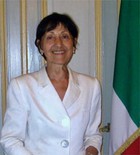
Funzione/Ruolo
Ambasciatrice, Diplomatica
Percorso professionale
Diplomatica in carriera dal 1974. Dopo le sue prime assegnazioni in Somalia e a Dublino è stata alla Direzione Generale per gli Affari Economici del Ministero Affari Esteri nell’ufficio per gli Affari Esterni dell’Europa, rappresentando l’Italia in tutti i Gruppi di Lavoro a Bruxelles e coordinando le Amministrazioni italiane coinvolte fino al 1983, quando ha raggiunto il grado di Funzionaria Reggente dell’Ufficio. In ragione dell’esperienza in tal modo acquisita, è stata assegnata alla Rappresentanza Permanente ONU a Ginevra con il mandato di rappresentare l’Italia in tutti i Gruppi di Lavoro del negoziato ‘Uruguay Round’ del GATT per la liberalizzazione internazionale dei commerci e dei servizi. In questo contesto ha esercitato le funzioni di Presidenza europea nel semestre italiano del 1990.
Nel gennaio del 1992 è nominata Incaricata d’Affari a Belgrado, all’inizio delle guerre balcaniche, ruolo che ricoprirà per tre anni assicurando la protezione della residua presenza ed interessi italiani, contribuendo a definire la politica italiana nel quadro europeo, per fermare il conflitto, conseguire una stabilizzazione democratica della regione, e promuovere la ripresa di un dialogo tra le parti in causa.
Al rientro a Roma nel 1995, viene nominata Capo dell’Unità Balcani/Mediterraneo Orientale (inclusiva di Albania, Turchia, Grecia, Cipro) della Direzione Generale degli Affari Politici ove rimane per oltre cinque anni, partecipando come portavoce dell’Italia nei Gruppi di Lavoro a Bruxelles sui Balcani e Mediterraneo Orientale, coordinando le altre Direzioni Generali del MAE e le altre Amministrazioni italiane, e contribuendo a definire la posizione italiana all’ONU, NATO, OSCE e altre OO.II. Nel 1996, esercita le funzioni di Presidenza della UE durante il semestre italiano e partecipa, sempre come portavoce dell’Italia, alle riunioni internazionali formali e informali per la Bosnia fino al raggiungimento degli Accordi di Dayton.
Nel 1997, quando l’Albania crolla sotto l’urto della crisi politico-economico-finanziaria, contribuisce alla definizione della politica italiana di soccorso al Paese e alla gestione politica dell’“Operazione Alba” di peace-keeping, sicurezza, e ricostruzione, sotto egida dell’ONU. Il successo dell’operazione italiana è universalmente riconosciuto, in primis dalle Nazioni Unite, e viene tuttora citato internazionalmente come esemplare.
Nel 1999 rappresenta l’Italia alla Conferenza di Rambouillet e all’intero negoziato per la gestione della crisi del Kosovo.
Nel 2000, è nominata Ambasciatrice a Damasco (Siria), dove presta servizio per 4 anni con il compito di favorire la pacificazione della regione del Medio Oriente. Rientrata a Roma, nel 2006 viene nominata Direttrice Generale per i Paesi dell’Europa. La “circoscrizione” di competenza si estende da Lisbona a Vladivostok, includendo, oltre ai paesi Europei, i paesi dei Balcani, i tre paesi del Caucaso, le cinque Repubbliche centro-asiatiche, e la Russia. Nel 2008 viene promossa al grado di Ambasciatrice e nel 2009 viene destinata a Ginevra come Rappresentante Permanente d’Italia presso le Nazioni Unite e le Organizzazioni Internazionali per 4 anni.
Risultati scientifici
Attività diplomatica in Medio Oriente, nei Balcani, in Russia, Asia Centrale e Caucaso e Nazioni Unite.
Attività editoriali e pubblicazioni
Mirachian L, Siria e Vicinato, Università Cattolica.
Mirachian L, Siria perché, Guerini
Collaborazione (inter alia): Istituto Affari Internazionali (IAI), quotidiano La Stampa
Riconoscimenti e premi
Il 2 giugno 1991 viene nominata Ufficiale dell'Ordine al merito della Repubblica Italiana su proposta della Presidenza del Consiglio dei Ministri.
Il 10 novembre viene nominata Commendatore dell'Ordine al merito della Repubblica Italiana di iniziativa del Presidente della Repubblica.
il 27 dicembre 2008 è nominata Grande Ufficiale dell'Ordine al merito della Repubblica Italiana su proposta della Presidenza del Consiglio dei Ministri.
Nel 2008 riceve anche il Premio Minerva Una Donna per la Pace.

Funzione/Ruolo
Fondatrice di the breakaway, società di consulenza specializzata nella creazione di modelli di business per la crescita dello sport femminile.
Percorso professionale
Laureata in storia presso l’Università degli Studi di Padova nel 2006 e con un Master in Gestione d’Impresa presso la Fondazione CUOA ottenuto l’anno successivo, Elena Mirandola ha iniziato la sua carriera professionale in una realtà della grande distribuzione italiana all’interno dell’ufficio marketing, per poi trasferirsi a Londra nel 2008 dove è entrata da subito a contatto con il mondo del digital marketing e media, ricoprendo il ruolo di Client Partner presso Unique Digital, agenzia del gruppo WPP.
Dopo sei anni in Inghilterra, si è trasferita a Dubai per intraprendere una nuova sfida professionale come Deputy Head MENA per Artefact, società di consulenza francese con sedi in tutto il mondo con forte orientamento alle tematiche del digitale. In questa sede, ha avuto l’opportunità di lavorare con alcuni dei maggiori brands al mondo, tra cui Emirates Airline.
Nel 2017, Elena si è trasferita a Kuala Lumpur, Malesia, per conto di Artefact, con il ruolo di Managing Director e l’obiettivo di inaugurare la presenza in Asia della società, aprendo uffici a Hong Kong, Kuala Lumpur, Singapore e Melbourne.
Tra il 2020 e il 2021 è stata Director of Business Development APAC per Expedia Group con sede a Singapore, e nel 2021 ha deciso di rientrare in Italia con il ruolo di Managing Director per Alkemy Spa, società italiana quotata leader nel settore dei servizi di consulenza digitale alle imprese.
Durante la stagione 2024-25 è stata Amministratrice delegata di F.C. Como Women, club di calcio che compete in Serie A femminile.
A settembre 2025 ha fondato the breakaway, una boutique di consulenza specializzata nell'affiancare leaders di club, leghe, federazioni e fondi di investimento a livello internazionale, in progetti di crescita e sviluppo dello sport femminile, con particolare attenzione al modello di business.
È inoltre speaker internazionale sui temi della commercializzazione e dello sviluppo del valore nello sport femminile, ed è regolarmente invitata da aziende e organizzazioni a intervenire su leadership, innovazione e trasformazione.
Riconoscimenti e premi
Ha ricevuto il Google Squared Award come “The Big Thinker” ed è stata nominata Inspiring Fifty Italy nel 2021, entrando nella Top 50 delle donne più ispiratrici nel settore tech in Italia.

Funzione/Ruolo
Professoressa ordinaria di Econometria presso il Dipartimento di Scienze Economiche dell’Università di Bologna
Percorso professionale
Consegue la Laurea in Scienze Statistiche ed Economiche presso l’Università di Padova nel 1992 e il Dottorato di ricerca in Economia presso l’Istituto Universitario Europeo nel 1997. Dal 2001 è ricercatrice, dal 2005 è professoressa associata e dal 2017 professoressa ordinaria di Econometria a Bologna. Ha un’ampia esperienza didattica di econometria a livello di corsi di laurea triennali, magistrali e di dottorato, caratterizzata dall’integrazione di contenuti teorici e applicati. È affiliata a diversi centri di ricerca: Institute for the Study of Labor (IZA, Bonn); Centre for Household, Income, Labour and Demographic Economics at Collegio Carlo Alberto (CHILD‐CCA, Torino); Health, Econometrics and Data Group (HEDG, York). E’ stata recentemente membro di diversi comitati scientifici di convegni internazionali (European Society for Population Economics, 2016) e nazionali (Italian Workshop of Econometrics and Empirical Economics, 2018 e Italian Congress of Econometrics and Empirical Economics, 2017). E’ attualmente Co-Editor della rivista internazionale Review of Economics of the Household.
Negli ultimi anni ha fatto parte dei seguenti gruppi di ricerca che hanno ottenuto finanziamenti competitivi: 2018-2019: principal investigator dell’unità di Bologna del progetto europeo H2020 “European Cohort Development Survey”, coordinato dalla Manchester Metropolitan University; 2013-2016: co-leader esterna, insieme a Daniela Del Boca, del Work Package “Childcare arrangement determinants and consequences” (project partner: Collegio Carlo Alberto, Torino), nell’ambito del progetto europeo Fp7 “Families and Societies –Changing families and sustainable societies: Policy contexts and diversity over the life course and across generations”, coordinato dall’Università di Stoccolma.
Si interessa di servizi e politiche per l’infanzia e l’adolescenza ed è attualmente membro del Consiglio di Amministrazione dell’Istituzione Educazione e Scuola (IES) del Comune di Bologna.
Risultati scientifici
Chiara Monfardini è esperta di metodi micro-econometrici per l’analisi di dati individuali e di modelli con variabile dipendente limitata. I suoi attuali interessi di ricerca applicata riguardano principalmente le determinanti dello sviluppo cognitivo e non cognitivo di bambini e adolescenti, con particolare attenzione alle conseguenze dell’uso del tempo.
Attività editoriali e pubblicazioni
Negli ultimi 15 anni ha pubblicato i seguenti lavori:
(2017) Del Boca D, Monfardini C. and Nicoletti C. Parental and child time investments and the cognitive development of adolescents.Journal of Labor Economics,35, 2:565-608.
(2017) Mancini AL, Monfardini C. and Pasqua S. (2017): Is a Good Example the Best Sermon? Children's Imitation of Parental Reading.Review of Economics of the Household,15:965–993.
(2016) Geraci A, Fabbri D. and Monfardini, C. (forthcoming) Testing exogeneity of multinomial regressors in count data models: does two-stage residual inclusion work? Journal of Econometric Methods. Published online November 2016. DOI: 10.1515/jem-2014-00.
(2016) Fabbri D, Monfardini C, Castaldini I. and Protonotari A. Cesarean section and the manipulation of exact delivery time. Health Policy, 120(7):780-789.
(2016) Bellettini G, Berti Ceroni C, and Monfardini C. Socio-Economic Heterogeneity and Electoral Turnout: An Aggregate Analysis with Precinct-Level Data. Electoral Studies, 42:146-156.
(2016) Fabbri D. and Monfardini C. Opt Out or Top Up? Voluntary Healthcare Insurance and the Public vs. Private Substitution. Oxford Bulletin of Economics and Statistics, 78, 1:75-93. Published online July 2015.
(2016) Monfardini C. and See SG. Birth Order and Child Cognitive Outcomes: an Exploration of the Parental Time Mechanism. Education Economics,24, 5:481-495.
(2010) Cardoso A R, Fontainha E. and Monfardini C. Children's and Parents' Time Use: Empirical Evidence on Investment in Human Capital in France, Italy and Germany. Review of Economics of the Household,8, 4:479-504.
(2010) Miniaci R, Monfardini C. and Weber G. Is there a Retirement Puzzle in Italy? Empirical Economics, 38: 257-280.
(2009) Fabbri D. and Monfardini C. Rationing the public provision of healthcare in the presence of private supplements: evidence from the Italian NHS. Journal of Health Economics, 28:290-304.
(2009) BardasiE. and MonfardiniC. Women's Employment, Children and Transition: an Empirical Analysis on Poland. Economics of Transition, 17,1:147-173.
(2008) Lu M, Mizon G.E. and Monfardini C. Simulation Encompassing: Testing Non-nested Hypotheses. Oxford Bulletin of Economics and Statistics, 0 (s1): 781 - 806.
(2008) Fabbri D. and Monfardini C. Style of Practice and Assortative Mating: a Recursive Probit Analysis of Cesarean Section Scheduling in Italy. Applied Economics, 40:1411- 1423.
(2008) Monfardini C. and Santos Silva J.M.C. What Can We Learn about Correlations from Multinomial Probit Estimates? Economics Bulletin, 3, 28: 1-9.
(2008) Monfardini C. and Radice R. Testing Exogeneity in the Bivariate Probit Model: a Monte Carlo Study. Oxford Bulletin of Economics and Statistics, 70, 2: 271-282.
(2003) Fabbri D. and Monfardini C. PublicversusPrivate Health Care Services Demand in Italy. Giornale degli Economisti e Annali di Economia, 62, 1:93-123.
(2003) Monfardini C. An Illustration of Cox’s Non-Nested Testing Procedure to Logit and Probit Models. Computational Statistics and Data Analysis, special issue on Computational Econometrics, 42:425-444.
(2003) Giannelli G. and Monfardini C. (2003) Joint Decisions on Household Membership and Human Capital Accumulation of Youths: The role of expected earnings and labour market rationing. Journal of Population Economics, 16, 2:265-285.
Secondo i rankings del database RePEC (Research Papers in Economics), risulta nel top 9% degli autori italiani, nel top 11% di quelli europei , nel top 13% di tutti gli autori, e nel top 8% di tutte le autrici donne (dati relativi a Febbraio 2018).

Area STEM: Ingegneria
Competenze: complessità applicata, design sistemico, energie alternative, extreme project management, gestione della diversità, leadership, logistica, project management, sostenibilità, team management
Parole chiave: Antartide, energie alternative, esploratrice, innovazione, management, progetti complessi, sostenibilità, spedizione in Antartide, strategia, tecnologie digitali
Regione: Lazio
Funzione/Ruolo
Interface Manager Cherenkov Array Telescope gGmbH. Prima italiana a capo di una spedizione in Antartide. Esperta di extreme project management
Percorso professionale
Dopo la laurea in Ingegneria Civile presso l’Università di Pisa, prosegue la sua formazione con un master in Management conseguito nel 2010 presso il MIP (Graduate School of Business del Politecnico di Milano). Dal 2002 al 2008 è Energy Manager e Interface Manager per il PNRA (Programma Nazionale di Ricerche in Antartide), dove si occupa sostenibilità e di organizzare le missioni scientifiche in Antartide. Dal 2008 al 2010 è a capo della Missione Europea alla base di ricerca Concordia in Antartide. Nel 2013, per l'istituto polare francese, è a capo della logistica sempre nell’ambito della spedizione Europea in Antartide. Dal 2015 al 2016 dirige la missione di ricerca Belga in Antartide alla stazione Princess Elizabeth (primo Zero Emission Building dell'Antartide). Oltre alle esperienze polari, ha lavorato in United Kingdom nel Broadcasting e Start-up digitale; in Italia come consulente sulle strategie per la sostenibilità e, più di recente, sullo sviluppo delle partnership strategiche per l’innovazione tra Italia e Cina. Ha condotto ricerca in Teoria dell’Organizzazione preso il Politecnico di Milano e presso il Centro per la Complessità di Bergamo.Ha fondato “Complexity aware”: società di consulenza che supporta le aziende interessate a risvegliare il cosiddetto “Antarctic Mindset” (ovvero la capacità di creare strategie per prosperare nell’incertezza) e propone un metodo ideato insieme al filosofo della scienza Gianluca Bocchi
Attualmente è consulente e interface manager presso Cherenkov Array Telescope Observatory gGmbH.
Risultati scientifici
Durante le cinque spedizioni antartiche cui ha partecipato (la si può definire una esploratrice del XXI secolo) Chiara Montanari si è occupata della supervisione delle operazioni scientifiche, dell’organizzazione delle risorse umane, ma anche dei voli e delle operazioni di emergenza, ed è stata il principale contatto per i rapporti coi media. Grazie alle sue capacità di management anche di progetti complessi (e una spedizione al Polo Sud richiede particolare abilità di organizzazione e coordinazione), Montanari ha risposto a tutte le necessità legate al funzionamento del programma. In particolare, nel corso delle spedizioni alla base Concordia (una stazione di ricerca italo-francese situata sull’altipiano antartico a 3300 m di altitudine e a 1200 km dalla costa) e nel corso dell'ultima spedizione alla base di ricerca Princess Elisabeth (una stazione sabotata prima dell'arrivo del team), si è trovata a gestire situazioni ad alto rischio con forte pressione sul raggiungimento del risultato. In ogni missione ha coordinato da un lato il gruppo scientifico, con il proprio background e i propri obiettivi di missione, e dall’altro il team degli esperti di logistica, che ha competenze altrettanto strategiche: l’installazione delle complicate attrezzature scientifiche, l’approvvigionamento in viveri, materiali, carburante e la gestione degli spostamenti all’esterno. Montanari li ha fatti dialogare e lavorare insieme, agevolando anche i rapporti personali spesso non facili in un team multidisciplinare e multiculturale confinato a convivere in un microcosmo isolato. Sulla base di queste esperienze sul campo e degli studi sulla complessità applicata, Montanari oggi si occupa di trasferire alle aziende le competenze chiave per lo sviluppo di un team capace di resilienza e di agire efficacemente anche nel mondo del business contemporaneo, caratterizzato da elevata complessità, incertezza e cambiamento continuo.
Attività editoriali e pubblicazioni
Nel 2015 pubblica Cronache dai ghiacci. 90 giorni in Antartide, in cui narra l'esperienza della spedizione del 2013 alla stazione Concordia e propone il vivere e lavorare in ambiente estremo come metafora del mondo contemporaneo.
Riconoscimenti e premi
È la prima italiana a capo di una spedizione in Antartide.
Nel 2014 vince l'Ambrogino D'Oro dal Comune di Milano per l'impegno nell'innovazione, il trasferimento tecnologico e nella ricerca.

Area STEM: Informatica
Competenze: capacità e pianificazione, CRM e piattaforme di personalizzazione, gestione costi e fornitori, intelligenza artificiale, IT portfolio management, mercato Telco corporate, metodologie e modelli operativi Agile, processi operativi del cliente, project management, reti di telecomunicazioni fisse e mobili, sistemi digitali, strategie IT, Telco (aziende di telecomunicazioni), trasformazione digitale
Parole chiave: digitalizzazione, innovazione, intelligenza artificiale generativa, marketing, processi di automazione tecnologica, process mining, Robotic Process Automation (RPA), Telco B2B e B2C, women in tech
Regione: Lombardia
Funzione/Ruolo
IT Strategy and Project Management Director
Percorso professionale
Dopo la laurea in Scienze dell’Informazione e la specializzazione in Telecomunicazioni è entrata a far parte di importanti aziende corporate con ruoli di crescente responsabilità. Ha contribuito al lancio di numerosi prodotti nei mercati Telco e Media sia in ambito B2B che B2C. Entra, dopo 17 anni di esperienza in Vodafone, in Sky Italia dove ricopre diversi ruoli a partire da quello di Delivery Program Manager per il lancio di Sky Wifi, responsabile delle attivazioni dei clienti broadband, da 3 anni è in staff al CIO come Direttrice dell’area Stategy, Portfolio e Project Management.
Risultati scientifici
Segue presso Infostrada il lancio della rete fissa come responsabile dei processi e sistemi di Assurance; lancia in Vodafone l’UMTS e successivamente la rete fissa B2C e Business; sempre in Vodafone si occupa di digital transformation creando e gestendo l’app My Vodafone e il team digital; si occupa dello sviluppo dei prodotti e servizi del mercato Vodafone Enterprise; in Sky guida il piano e il progetto Sky Wifi nella divisione technlogy e ora guida nel dipartimento IT i maggiori progetti strategici quali ad esempio il lancio della app My Sky e il progetto di lancio di Sky Mobile.
Riconoscimenti e premi
2014 Migliore App servizio clienti

Funzione/Ruolo
Professoressa associata di Scienza Politica e Relazioni Internazionali presso il Dipartimento di Scienze Politiche e delle Relazioni Internazionali dell’Università di Palermo.
Percorso professionale
Dopo la laurea in Scienze Politiche presso l’Università di Palermo (1995), ha conseguito un M.A. in International Relations and European Studies presso l’Università del Kent a Canterbury (UK) e il dottorato in Relazioni Internazionali presso l’Università di Milano (2001). Fa parte della Società Italiana di Scienza Politica, dell’International Studies Association, della European International Studies Association e della Transatlantic Studies Association. È stata vincitrice di una borsa Fulbright-Schuman (ricerca su International Security, Multilateral Intervention, and the Question of Legitimacy: The Role of Cooperation Between the US and the EU) e visiting scholar presso la Columbia University (Saltzman Institute of War and Peace Studies e Institute on Western Europe) e la Georgetown University (USA). Ha partecipato a diversi gruppi di ricerca nazionali e internazionali, tra gli altri sul ruolo degli Stati Uniti nel sistema internazionale, sulla politica estera italiana, sull’impatto della crisi economica sulla de-europeizzazione della politica estera degli stati dell’Europa meridionale e sulle basi americane in Europa. Ha tenuto lezioni sulla sicurezza ed il cambiamento globale presso l’Istituto di Alti Studi per la Difesa del Centro Alti Studi per la Difesa nell’ambito delle Sessioni di studio IASD (2017, 2018 e 2019). Attualmente insegna Scienza Politica e Relazioni Internazionali presso l’Università di Palermo, e coordina (con Vittorio Parsi) lo Standing Group di Relazioni Internazionali della Società Italiana di Scienza Politica.
Risultati scientifici
L’attività di ricerca si è concentrata su quattro filoni principali:
- la sicurezza e le sue articolazioni, analizzando il concetto e le dimensioni (militari e non militari) della sicurezza e la loro evoluzione, i legami interno-esterno, le politiche e gli strumenti, gli attori (in particolare, USA e UE) e le istituzioni principali (in particolare, le istituzioni multilaterali e le comunità pluralistiche di sicurezza);
- il multilateralismo, analizzando la sua evoluzione (con particolare attenzione al ruolo all’interno dell’ordine egemonico americano e al rapporto con gli Stati Uniti), le sue istituzioni (in particolare, il Consiglio di Sicurezza) e le relative politiche;
- la politica estera e di sicurezza italiana, analizzando le variazioni nella sua europeizzazione e in relazione agli Stati Uniti (con attenzione sia all’ordine egemonico americano sia alle basi americane in Italia) e a Russia e Cina;
- la relazione tra i comportamenti coalizionali degli stati e i cambiamenti nell’organizzazione del sistema politico internazionale.
È componente dell’editorial board del Journal of Transatlantic Studiese referee per numerose riviste scientifiche internazionali.
Attività editoriali e pubblicazioni
[2019] Monteleone, C., Italy in Uncertain Times: Europeanizing Foreign Policy in the Declining Process of the American Hegemony, Lanham, Boulder, New York and London, Lexington Books, 2019.
[2019] Monteleone, C., The United Nations (UN) and the European Union, in Oxford Encyclopedia of European Union Politics, Oxford University Press.
[2019] Monteleone, C., I diritti umani come tema conflittuale nel Consiglio di Sicurezza delle Nazioni Unite, in Ragion pratica, vol. 52, n. 1, pp. 35-50.
[2018] Monteleone, C., Spatial Fragmentation of, and US Support for, the Main Multilateral Institutions of the Western Order, in Clementi, M., Pisciotta B., and Dian, M., (eds.), US Foreign Policy in a Challenging World. Building Order on Shifting Foundations, Springer, London and Milan.
[2016] Monteleone, C., Do terrorism, organized crime (drug production), and state weakness affect contemporary armed conflicts? An empirical analysis, in Global Change, Peace & Security, vol. 28, n. 1, 2016.
[2015] Monteleone, C., Beyond Material Factors? Identity, Culture and the Foreign and Security Policy of the EU, in Cladi L. and Locatelli A. (eds.), International Relations Theory and European Security. We Thought We Knew, Routledge, 2015.
[2015] Monteleone, C., Coalition Building in the UN Security Council, in International Relations, vol. 45, n. 1, pp. 45-68.
[2014] Monteleone, C., Crisi e ordine globale. Verso il declino dell’ordine multilaterale occidentale?, in Atlante Geopolitico Treccani, Roma, Istituto della Enciclopedia Italiana Treccani.
[2012] Monteleone, C., Politiche di sicurezza e cambiamento globale(ed.), Milan, FrancoAngeli.
[2011] Monteleone, C., The Enabling Factor: The Influence of US-EU Cooperation on UN Peace Operations, in European Security, vol. 20, n. 2, pp. 265-289.
[2009] Monteleone, C., The End of the Euro-Atlantic Pluralistic Security Community? The New Agenda of Transatlantic Security Relations in the Global Political System, in N. Fernandez Sola and M. Smith (eds.), Perceptions and Policy in Transatlantic Relations: Prospective Visions from the US and Europe, Routledge.
[2007] Monteleone, C., The Evolution of the Euro-Atlantic Pluralistic Security Community: Impact and Perspectives of the Presence of American Bases in Italy, in Journal of Transatlantic Studies, vol. 5, n. 1, pp. 63-87.
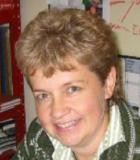
Funzione/Ruolo
Responsabile del Laboratorio Micro e Nanostrutture per la Fotonica presso il Centro Ricerche ENEA di Frascati (RM)
Percorso professionale
Dopo aver conseguito la laurea in Fisica nel 1984 all'Università di Roma "La Sapienza", e' assunta nella Divisione Studi presso Telespazio S.p.A. per le Telecomunicazioni Spaziali di Roma. Dal 1988 è ricercatrice presso il Centro Ricerche ENEA di Frascati (RM), dove dal 2010 è responsabile del Laboratorio Micro e Nanostrutture per la Fotonica. Nell'agosto 2008 è stata Visiting Researcher presso l'Università Federale Tecnologica del Paranà, in Brasile. Nel 2013 ha conseguito l'abilitazione scientifica nazionale alle funzioni di Professoressa Universitaria di prima fascia per Fisica Sperimentale della Materia.
Risultati scientifici
Rosa Maria Montereali è specializzata nell'indagine delle proprietà ottiche di difetti puntiformi in materiali isolanti per la realizzazione di micro-dispositivi ottici, sorgenti di luce miniaturizzate e laser a stato solido per la fotonica e di rivelatori di radiazione innovativi a lettura ottica per imaging-X e dosimetria, applicati in ambito scientifico, medicale e nucleare.
Partecipa all'indagine spettroscopica di nuovi materiali fotoluminescenti in forma di cristalli, polveri nanometriche, colloidi metallici e film sottili di semiconduttori organici di basso peso molecolare, utilizzati con successo per la realizzazione di diodi elettroluminescenti (OLED), in configurazione di risonatori compatti ed efficienti - microcavità ottiche verticali, guide d'onda planari, etc. - attività che svolge in collaborazione con università, enti di ricerca e industrie italiane ed estere, nell'ambito di progetti regionali, nazionali ed europei.
Nell'ambito delle attività di ricerca e sviluppo sulle applicazioni in ottica integrata dei film sottili di fluoruri, trattati con tecniche litografiche, laser e radiazioni ionizzanti di varia natura per la realizzazione di dispositivi fotonici miniaturizzati non-ibridi completamente ottici, il contributo innovativo è stato maggiormente apprezzato in ambito nazionale ed internazionale tramite l'assegnazione di relazioni su invito in prestigiosi congressi e conferenze. È co-inventrice di alcuni brevetti nazionali ed internazionali.
Attività editoriali e pubblicazioni
È autrice di più di 200 pubblicazioni su riviste scientifiche internazionali e/o con referee, tra cui:
[2017] Piccinini M, Nichelatti E, Ampollini A, Picardi L, Ronsivalle C, Bonfigli F, Libera S, Vincenti MA and Montereali RM. Proton beam dose-mapping via color centers in LiF thin film detectors by fluorescence microscopy, Europhysics Letters, 117:37004-1-5.
[2016] Montereali RM, Bonfigli F, Piccinini M, Nichelatti E, Vincenti MA. Photoluminescence of colour centres in lithium fluoride thin films: from solid-state miniaturised light sources to novel radiation imaging detectors, Journal of Luminescence, 170:761-769.
[2016] Fastampa R, Missori M, Braidotti MC, Conti C, Vincenti MA, Montereali RM. Temperature behaviour of optical absorption bands in colored LiF crystals, Results in Physics, 6:74-75.
[2015] Piccinini M, Ambrosini F, Ampollini A, Picardi L, Ronsivalle C, Bonfigli F, Libera S, Nichelatti E, Vincenti MA and Montereali RM. Photoluminescence of radiation-induced color centers in lithium fluoride thin films for advanced diagnostics of proton beams, Applied Physics Letters, 106: 261108_1_4.
[2014] Chiamenti I, Bonfigli F, Gomes ASL, Michelotti F, Montereali RM and Kalinowski HJ. Optical characterization of femtosecond laser induced active channel waveguides in lithium fluoride crystals, Journal of Applied Physics, 115, 2:023108-1-7.
[2013] Francini R, Montereali RM, Nichelatti E, Vincenti MA, Canci N, Segreto E, Cavanna F, Di Pompeo F, Carbonara F, Fiorillo G, Perfetto F. Optical characterization at liquid Argon temperature of Tetraphenyl-butadiene films on glass and specular reflector substrates in the VUV-VIS range of wavelengths, Journal of Instrumentation, JINST 8:P09006.
[2012] Montereali RM, Bonfigli F, Menchini F and Vincenti MA.Optical spectroscopy and microscopy of radiation-induced light-emitting point defects in lithium fluoride crystals and films, Low Temperature Physics 38, 8:779-785, doi: 10.1063/1.4740241; Fizika Nizkikh Temperatur 38, 8:976-984.
[2010] Montereali RM, Almaviva S, Bonfigli F, Cricenti A, Faenov A, Flora F, Gaudio P, Lai A, Martellucci S, Nichelatti E, Pikuz T, Reale L, Richetta M, Vincenti MA. Lithium Fluoride Thin Films Detectors for Soft X-Ray Imaging at High Spatial Resolution, Nuclear Instruments and Methods, A, 623:758-762.
[2007] Sekatskii SK, Dietler G, Bonfigli F, Loreti S, Marolo T, Montereali RM. Subwavelength-Size Local Fluorescent Sources based on Color Centers in LiF for Scanning Near-Field Optical Microscopy, Journal of Luminescence, 122-123:362-364.
[2004] Montereali RM, Gambino S, Loreti S, Gagliardi S, Pace A, Baldacchini G, Michelotti F. Morphological, Electrical and Optical Properties of Organic Light-Emitting Diodes with a LiF/Al Cathode and an Al-Hydroxyquinoline/Diamine Junction, Synthetic Metals, 143: 171-174.
Riconoscimenti e premi
È membro permanente dell'International Advisory Committee della serie di conferenze DIM (Defects in Insulating Materials).

Funzione/Ruolo
Professoressa ordinaria di Storia medievale all'Università di Messina.
Percorso professionale
Marina Montesano si laurea in Lettere e Filosofia presso l'Università di Bari nel 1990 con 110 e lode con una tesi in Storia medievale. Lo stesso anno vince una borsa di dottorato triennale a Bari in Storia socio- economica e religiosa dell’Europa, e contemporaneamente una borsa di dottorato quadriennale a Firenze, per un dottorato in Storia medievale, e sceglie quest’ultima.
Nel 1994, grazie a una nuova borsa, è visiting scholar del Department of History della Brown University di Providence (Rhode Island).
Nel 1995, su invito del Dipartimento di lingua e cultura italiana dell'Università di Turku (Finlandia), svolge un corso per gli studenti iscritti al Corso di laurea in Lingua e cultura italiana sul tema della Cultura dotta e cultura popolare nel Rinascimento italiano. Rientrata in Italia, consegue il dottorato nel 1996 e nello stesso anno vince una borsa di studio annuale presso l'Accademia della Crusca. Dal 1999 al 2000 è fellow di Villa I Tatti (Harvard University – Fondazione Berenson, Firenze). Nel 2000 ha intanto assunto il ruolo di ricercatrice di Storia medievale presso l'Università di Genova. A Milano, negli anni tra il 2009 e il 2015, insegna come professoressa a contratto di Storia medievale presso la Facoltà di Filosofia dell'Università Vita-Salute San Raffaele. Nel frattempo diventa responsabile dell'Unità di ricerca di Genova per il PRIN 2007 sul tema “Relazioni mercantili, diplomatiche e culturali tra Mediterraneo occidentale e Oriente”.
Il 30 marzo 2011 è assunta come professoressa associata di Storia medievale presso l'Università di Messina. Nella medesima Università ottiene l’abilitazione scientifica nazionale, vince il concorso come professoressa ordinaria nel 2015, e tutt’ora insegna.
Dal 2018 è membro del comitato scientifico della International Society For Cultural History. Dal 2020 membro del comitato scientifico dell’Istituto storico italiano per il Medioevo – sede di Barletta.
Risultati scientifici
Marina Montesano ha approfondito con passione molti aspetti della cultura medievale e del Rinascimento, con particolare attenzione ai temi della stregoneria e della questione delle donne, ma anche al tema dei viaggi e ad aspetti particolari della vita sociale come, tra l’altro, il crossdressing. Le sue ricerche sono presentate in convegni nazionali e internazionali e veicolate attraverso cicli di conferenze in varie città del mondo presso gli Istituti italiani di cultura: al Cairo, ad Amburgo, a Rio de Janeiro, Buenos Aires, Istanbul e presso la Pontificia Università Cattolica di Lima. In seguito a questa sua presenza, dal 2013 entra a far parte del Directorio de evaluadores de la Pontificia Universidad Católica del Perú (PUCP).
Attività editoriali e pubblicazioni
[1997] Montesano M. La cristianizzazione dell'Italia nel Medioevo, prefazione di A. Paravicini Bagliani, Roma- Bari, Laterza (Il Quadrante).
[1999] Montesano M. “Supra acqua et supra ad vento”. Superstizioni, maleficia e incantamenta nei predicatori francescani osservanti (Italia, sec. XV), Roma, Istituto Storico Italiano per il Medio Evo (Nuovi Studi Storici – 46).
[2000] Montesano M. “Fantasima, fantasima che nella notte vai”. La cultura magica nelle novelle toscane del Trecento, prefazione di G. Airaldi, Roma, Città Nuova (I volti della storia).
[2003] Montesano M, “…Sacro alle nursine grotte”. Storie di fate, cavalieri, ‘negromanti’ nei Monti Sibillini, Ascoli Piceno, Istituto superiore di studi medievali “Cecco d’Ascoli”.
[2005] Montesano M., Cardini F. La lunga storia dell'Inquisizione, Roma, Città Nuova.
[2010] Montesano M, Da Figline a Gerusalemme. Viaggio del prete Michele in Egitto e in Terrasanta (1489-90), (studio e edizione critica del ms Riccardiano 1923) Roma, Viella.
[2012] Montesano M. Caccia alle streghe, Roma, Salerno Editrice.
[2014] Montesano M. Marco Polo, Roma, Salerno Editrice.
[2015] Montesano M., Cardini F. "Arte gradita agli déi immortali". La magia fra mondo antico e Rinascimento, Torino, Yume.
[2018] Montesano M. Classical Culture and Witchcraft in Medieval and Renaissance Italy, London, Palgrave/MacMillan.
[2020] Montesano M. Cardini F, L'uomo dalla barba blu. Gilles de Rais e Giovanna d'Arco nel labirinto delle menzogne e delle verità, Firenze, Giunti.
[2020] Montesano M. Dio lo volle? 1204: la vera caduta di Costantinopoli. Roma, Salerno Editrice.
Tra le sue attività editoriali, oltre alla saggistica, la collaborazione con le pagine culturali del Manifesto e con la rivista “Storica National Geographic”.
Riconoscimenti e premi
Nel 2000 Montesano ha ricevuto il premio “Lila Wallace Reader's Digest Publications Subsidy” di 5000 USD erogato dalla Wallace Foundation.
Fra il marzo 2001 e il marzo 2002 ha usufruito di un fondo di 10 milioni di lire nell’ambito del progetto per il finanziamento a ricerche di singoli e/o giovani ricercatori.
Le sono inoltre stati attribuiti il premio “Anassilaos 2017 “ e il premio “La tela di Penelope” nel 2019

Funzione/Ruolo
Ex atleta, calciatrice capitana della Nazionale italiana. Allenatrice e docente di calcio.
Percorso professionale
Carolina Morace debutta con la Nazionale italiana nel 1978 contro la Jugoslavia; da allora scende in campo con la maglia azzurra per 153 volte segnando un totale di 105 reti. Inoltre sfiora la vittoria del Campionato europeo in due occasioni, nel 1993 e 1997 (secondo posto in entrambe le occasioni). Dopo 19 anni dalla sua prima partita in Nazionale decide di ritirarsi nel 1998. In carriera vince un totale di 12 scudetti, 2 Coppe Italia e 1 Supercoppa italiana. Per 12 stagioni è la miglior marcatrice della Serie A (11 consecutivamente).
Conclusa l'attività agonistica nel 1998, intraprende da subito la carriera di allenatrice guidando il settore femminile della Lazio. Nell'estate 1999 passa alla Viterbese in Serie C, diventando così la prima donna a guidare una formazione maschile in ambito professionistico. Dal 2000 al 2005 guida la Nazionale femminile italiana di calcio e dal 2008 al 2009 la rappresentativa parlamentare. Nel febbraio 2009 diventa allenatrice della Nazionale femminile canadese di calcio e si aggiudica il titolo continentale (CONCACAF Women’s Championship) nel 2010 in Messico eliminando la Nazionale USA. Nel 2014 diventa la prima donna a entrare nella Hall of Fame del calcio italiano, nella categoria “Calciatrice italiana”. Dal 2016 al 2018 guida la Nazionale femminile di Trinidad e Tobago.Nella stagione 2018/2019 assume la guida della neoistituita squadra del Milan femminile, conquistando il terzo posto in Serie A. Il 31 gennaio 2021 torna alla Lazio femminile, squadra militante in Serie B, in qualità di prima allenatrice. Dal suo arrivo sulla panchina biancoceleste scala la classifica dalla 5ª posizione conquistando la vetta e, a due giornate dalla fine, l’aritmetica promozione in Serie A. Nella stagione successiva, nel novembre 2021, interrompe i rapporti con la Lazio femminile.
Nel 2024 viene eletta al Parlamento europeo, dove, tra l'altro, è Membro della Commissione per i diritti delle donne e l'uguaglianza di genere.
Attività editoriali e pubblicazioni
Carolina Morace è autrice di due libri: La Prima Punta (2019) e Fuori dagli schemi (2020)
Riconoscimenti e premi
1995: Riceve il premio a Olso (Norvegia) come migliore giocatrice del mondo
1997: vince il premio UEFA Golden Player all’Europeo disputato in Norvegia e Svezia
1998: viene nominata seconda miglior giocatrice europea del secolo e quarta del mondo dal IFFHS
2015: entra come prima donna nella Hall of Fame della FIGC
2019: riceve il riconoscimento internazionale “Golden Foot Legend” e nella Promenade di Montecarlo viene impressa l’impronta dei suoi piedi.

Funzione/Ruolo
Avvocata, Procuratrice Federale FIDAL (Federazione Italiana Atletica Leggera)
Percorso professionale
Laureata in Giurisprudenza all'Università LUMSA di Roma, è avvocata, iscritta all'Albo dell'Ordine degli Avvocati di Roma dal 2011. Il suo percorso professionale è totalmente incentrato sul diritto della persona, sul diritto della famiglia e sul diritto sportivo. Attualmente è Procuratrice Federale della FIDAL (Federazione Italiana Atletica Leggera), nonché componente del Tribunale Federale della FPI (Federazione Pugilistica Italiana). E' Responsabile del Coordinamento regionale Lazio e della Commissione minori e sport dell'Associazione Italiana Avvocati dello Sport.
Partecipa abitualmente come relatrice a conferenze, anche a livello internazionale.
Attività editoriali e pubblicazioni
Maria Cecilia Morandini è autrice di diverse pubblicazioni fra cui, in materia di diritto sportivo, le seguenti:
IUS SOLI sportivo: novità ed aspettative di una legge tanto attesa, in "Rivista Diritto ed Economia dello Sport", Vol. XII, Fascicolo 1, 2016.
Trasferimento dei minori nel calcio: casi recenti ed esigenze di tutela, in "Giustizia Sportiva" n. 3/2015.
La Federazione Internazionale di Pugilato (A.I.B.A.), in "La Giustizia Sportiva", a cura di Michele Colucci e Salvatore Civale, SLPC 2015.
La buona fede e l’ignoranza scusabile dell’atleta escludono la violazione dell’art. 2.3 del Codice WADA per mancanza dell’elemento soggettivo – Nota a lodo arbitrale CAS 2008/A/1557 WADA v/ CONI, FIGC, Daniele Mannini & Davide Possanzini, 27 luglio 2009, in "Rivista della Giustizia Sportiva" n. 2 del 15 settembre 2009.

Funzione/Ruolo
Consigliera Nazionale della Federazione Italiana Rugby, rappresenta l’Italia nella Federazione mondiale World Rugby. Founder di Wo*men's sport land of freedom. Campionessa di rugby, ex giocatrice della Nazionale.
Percorso professionale
Erika Morri è un'ex atleta, giocatrice di rugby. Nel corso della sua carriera sportiva durata 21 anni, di cui 12 nella nazionale, ha partecipato a 2 Coppe del mondo e 7 Campionati europei. Terminata la sua attività agonistica, si dedica alla politica con un'esperienza come Consigliera Regionale Emilia Romagna, e poi all'attività federale come Consigliera Nazionale Federazione Italiana Rugby, fino al 2021. Nel 2019 fa parte del Comitato di Rugby Europe, per lo sviluppo del rugby femminile in Europa.
Nel 2022 fonda “Wo*men’s rugby land of freedom:chi semina sport raccoglie futuro”, progetto internazionale che si basa su 4 Obiettivi di sviluppo sostenibile dell’Agenda ONU 2030 (istruzione di qualità/salute e benessere/parità di genere/pace) e che sostiene tramite diverse attività, come lo sport sia uno strumento fondamentale per la crescita di tutta la comunità.
Formatrice aziendale e coach, ha tenuto un corso sperimentale “LE SOFT SKILLS PRENDONO CORPO tra arte contemporanea e rugby” per l’Università di Padova, sostenendo che “IL CORPO” sia un linguaggio di apprendimento. Lavora per inserire la “competenza motoria” come nona, alle 8 competenze chiave europee (alfabetica funzionale, multilinguistica, matematica, digitale, sociale, civica, imprenditoriale, consapevolezza ed espressione culturali).
È ideatrice del progetto Rugby e metaverso: un viaggio nelle emozioni, primo torneo al mondo di rugby a "tecniche miste" giocato metà in reale e metà nel metaverso. Progetto scolastico su 250 alunni delle scuole superiori in collaborazione con l'Università di Bologna, il Cluster Innovation ER, il Bologna rugby club, le Fondazioni Olitec, Cassa di Risparmio, Binnova, AlmaGi, che ha come obiettivo il far comprendere agli/alle alunne la diversità delle emozioni nel relazionarsi di persona o in virtuale.
Non un "meglio di ma un diverso da", che verrà discusso in un convegno finale per comprendere come il corpo tra sport e tecnologia, possa essere di supporto ad una didattica, che ha la relazione come strumento di apprendimento.
Attività editoriali e pubblicazioni
Ideatrice ed intervistatrice nel Progetto internazionale “La libertà non ti viene solo donata, “si allena” dentro di te”: 70 Video-Interviste a rugbiste di tutto il mondo (35 Nazioni) più la nazionale femminile su come il mindset del rugby abbia impattato nella vita quotidiana, 12 interviste sono state trasmesse su SKY SPORT durante i mondiali.
https://www.youtube.com/@womensrugbylandoffreedom
Ideatrice ed intervistatrice rubrica “Sorelle di Sport: le donne fanno squadra” in onda su MS Channel – Sky 814.
https://www.youtube.com/watch?v=1iN5EfU6MoU
Scrive sulla rivista “VITA MAGAZINE” la rubrica “La bellezza della forza” raccontando lo sport come connessione tra mente – anima e corpo.
Nel 2022 ha commentato per Sky Sport la Coppa del mondo di rugby femminile.
Nel 2023 ha commentato per Sky Sport la partita "Inghilterra - Francia" del 6 Nazioni femminile di Rugby.
Nel 2025 grazie all’ampliamento del progetto di interviste di rugbiste da tutto il mondo trasformato in “RUGBY: l’ottavo continente, la storia rivoluzionaria di uno sport declinato al femminile”, ha scritto insieme all’Università di Bologna, il libro “EMPOWERMENT PER LA VITA: la meta del rugby femminile” edito da Armando Editore. In questo testo parte della collana “i futuri della didattica”, si condivide la ricerca del dipartimento di Scienze dell’Educazione, che studiando le interviste di Erika Morri alle 135 rugbiste di 60 Paesi diversi, attesta che il rugby impatta sulla vita quotidiana in maniera positiva, dando una maggior consapevolezza della propria forza e della capacità di incidere sulla propria vita.
Riconoscimenti e premi
INCREDIBol 2012 Le migliori 10 aziende creative innovative – Comune di Bologna.
Med Red 2014 Innovation, creativity, and start-up in the Mediterranean area" - Aster award.
Ovale d'oro e Ovale d'argento 2021 - Federazione Italiana Rugby.
Tina Anselmi 2021 alla carriera sportiva – Premio del Comune di Bologna.
Milone d'oro 2022 – Opes Italia.
Unstoppable Women. 1000 donne che stanno cambiando l’Italia 2023 (da Startup Italia).

Funzione/Ruolo
Professoressa ordinaria di Fisiologia Umana dell'Università di Pisa
Percorso professionale
Dopo la laurea in Fisica nel 1977 presso l'Università di Pisa, prosegue la sua formazione sia nelle discipline fisiche sia biologiche. Questo iniziale interesse multidisciplinare, che coniuga un approccio quantitativo e computazionale allo studio dei processi sensoriali neuronali e percettivi, è elemento caratterizzante dell'attività scientifica svolta, portandola a raggiungere risultati importati riconosciuti in campo internazionale. Nel 1981 svolge un perfezionamento in Biofisica presso la Scuola Normale Superiore. Successivamente passa circa 5 anni presso il dipartimento di Psicologia dell'Università Western Australia, completando la sua formazione nel campo delle scienze comportamentali. In questo periodo di post dottorato si rafforza in lei l'interesse per la comprensione dei meccanismi percettivi e la loro simulazione con metodi matematici e computazionali. Dal 1987 si stabilisce a Pisa dove continua la propria attività di ricerca, prima come ricercatrice di Fisica Generale della Scuola Normale Superiore e in seguito come Prima Ricercatrice dell'Istituto di Neurofisiologia del CNR. Nel 2000 diventa professoressa ordinaria di Psicobiologia presso la facoltà di psicologia della Libera Università Vita-Salute S Raffaele. Fonda il Corso di laurea specialistica in Neuroscienze Cognitive, unico in Italia, per le Facoltà di Psicologia, Filosofia e Medicina. Dal 2008 è professoressa di Fisiologia Umana presso la Facoltà di Medicina dell'Università di Pisa.
Risultati scientifici
L'attività di ricerca di Maria Concetta Morrone riguarda principalmente lo studio dei meccanismi neuronali nell'essere umano per l'esplorazione e la rappresentazione dello spazio e del tempo. In particolare ha studiato come il cervello possa conferire stabilità percettiva al mondo nonostante questo sia percepito attraverso degli organi straordinariamente mobili, come gli occhi. Gli studi effettuati mostrano una forte interazione fra lo spazio e il tempo percepito, analogamente ai fenomeni della fisica. La conoscenza dei circuiti e dei meccanismi operanti nei sistemi nervosi ha due importanti connessioni con le scienze applicate: da un lato le ricerche transazionali in medicina (nella quale le ipotesi teoriche possono trovare un'immediata possibilità di sperimentazione pratica e dove l'esperienza clinica fornisce indicazioni e supporto continuo alla ricerca), dall'altro le ricerche nell'ambito della robotica. Entrambe le discipline rientrano negli interessi delle ricerche effettuate e hanno portato alla messa a punto di metodi diagnostici per la medicina e allo sviluppo di modelli computazionali per il riconoscimento di immagini e la rappresentazione dello spazio percettivo, utili nei sistemi di visione artificiali.
Attività editoriali e pubblicazioni
Concetta Morrone ha pubblicato oltre 180 articoli scientifici in riviste internazionali come Nature cluster, Neuron, Current Biology, Trends in Neurosciences, PLoS and Journal of Neuroscience, as well as dozens in archival specialized journals like Vision Research e Journal of Vision.
Di seguito una selezione:
(2015) Biagi L, Crespi SA, Tosetti M, Morrone MC. BOLD Response Selective to Flow-Motion in Very Young Infants. PLoS Biology, 13(9):e1002260.
(2007) d'Avossa G, Tosetti M, Crespi D, Biagi L, Burr DC, Morrone MC. Spatiotopic selectivity of BOLD responses to visual motion in human area MT.Nature Neuroscience, 10(2):249-55.
(2000) Morrone MC, Tosetti M, et al. A cortical area that responds specifically to optic flow, revealed by fMRI.Nature Neuroscience, 3:1322-1328.
(1998) Neri P, Morrone MC, Burr DC. Seeing biological motion. Nature, 395(6705):894-6.
(1997) Ross J, Morrone MC, Burr DC. Compression of visual space before saccades.Nature, 386(6625):598-601.
(1995) Morrone MC, Burr DC, Vaina LM. Two stages of visual processing for radial and circular motion.Nature, 376(6540):507-9.
(1994) Burr DC, Morrone MC, Ross J. Selective suppression of the magnocellular visual pathway during saccadic eye movements. Nature, 371(6497):511-3.
(1988) Morrone MC, Burr DC. Feature detection in human vision: a phase-dependent energy model.Proceedings of the Royal Society of London B: Biological Sciences, 235(1280):221-45.
(1986) Morrone MC, Ross J, Burr DC, Owens R. Mach bands are phase dependent. Nature, 324: 250-253.
(1986) Morrone MC, Burr DC. Evidence for the existence and development of visual inhibition in humans. Nature, 321(6067):235-7.
Riconoscimenti e premi
Per le ricerche effettuate sono stati conferiti a Maria Concetta Morrone premi e numerosi riconoscimenti, come il Premio Nazionale del Ministero per i Beni Culturali e Ambientali, conferito dal Presidente della Repubblica Italiana presso l'Accademia Dei Lincei di Roma nel 2002 per la Fisiologia e Patologia, la Medaglia di Koffka conferita per le ricerche sullo Sviluppo e sulla Percezione dall'Università di Giessen nel 2011. È stata nominata Socia Corrispondente dell'Accademia dei Lincei - Classe di Scienze di Fisiche, Matematiche e Naturali nel 2014. Ha ricevuto l'Advanced Grant della European Research Council. Nel 2019 ha ricevuto la Medaglia Ken Nakayama 2019 per l'eccellenza nella scienza della visione.

Area STEM: Scienze biomediche e biotecnologie
Competenze: metodi della ricerca clinica, qualità della vita, trasferimento delle informazioni scientifiche
Parole chiave: alfabetizzazione sanitaria, empowerment and engagement della popolazione, salute pubblica, trasferimento informazioni scientifiche
Regione: Lombardia
Funzione/Ruolo
Già Responsabile del Laboratorio di ricerca per il coinvolgimento dei cittadini in sanità del Dipartimento di Epidemiologia Medica dell’IRCCS Istituto di Ricerche Farmacologiche Mario Negri di Milano
Percorso professionale
Dopo la laurea in Scienze Biologiche conseguita presso l’Università degli Studi di Milano nel 1982, si specializza in Ricerca Farmacologica presso il Mario Negri. Ricercatrice dapprima nei settori della Farmacologia Clinica e della Epidemiologia Clinica, dal 1987 è stata coinvolta in progetti sulla partecipazione attiva dei cittadini e pazienti nel dibattito sulla salute, sull’informazione e formazione medico-scientifica e in progetti di ricerca e partnership con associazioni di volontariato.
Dal 2006 al 2009 è stata componente del Comitato Etico dell’IRCCS Multimedica, dal 2007 al 2013 presidente del Comitato Etico dell’Azienda USL di Bologna e nel 2013 del Comitato Etico Provinciale di Reggio Emilia.
Paola Mosconi è stata socia fondatrice, vice-presidente e delegata europea di EUROPA DONNA Italia, un movimento di opinione per la lotta contro il tumore al seno, presente in 46 paesi europei. È stata presidente della Fondazione Nerina e Mario Mattioli Onlus per la ricerca nel settore della ginecologia oncologica. È stata vice-presidente dell’Associazione Alessandro Liberati - Network Cochrane Italiano, associazione fondata per contribuire alla diffusione e crescita della cultura dell’efficacia e appropriatezza in campo sanitario. È stata componente del Consiglio di Fondazione AIOM, EUPATI Italia, Fondazione Pofferi. E’ componente del Comitato Tecnico Scientifico di Acto-Alleanza contro il tumore ovarico e di diversi gruppi di lavoro, dal 2025 consulente della Fondazione Italiana Sclerosi Multipla ETS.
Risultati scientifici
Come capo del “Laboratorio di ricerca sul coinvolgimento dei cittadini in sanità” dell’Istituto Mario Negri di Milano, Paola Mosconi si è occupata della pianificazione, del coordinamento e dell’analisi di risultati di differenti attività di ricerca mirate al coinvolgimento e alla partecipazione della popolazione in generale, o di gruppi di pazienti specifici e loro rappresentanze, nelle scelte e nelle decisioni in tema di salute pubblica. È stata responsabile di unità operative in programmi di ricerca medico-scientifica, finalizzati, per esempio, alla diagnosi precoce del tumore al seno, tramite promozione della corretta informazione sullo screening mammografico, alla promozione di un modello informativo per persone affette da sclerosi multipla sull’uso di farmaci ed esami a scopo diagnostico e prognostico, al coinvolgimento delle persone affette da AIDS/HIV per la messa a punto di un’agenda di priorità in materia di interventi sanitari, assistenza, prevenzione, informazione e ricerca.
In particolare, Paola Mosconi è esperta di metodologia della ricerca (conferenze di consenso, giurie dei cittadini, linee guida, indagini ad hoc con associazioni, indagini su conoscenze/ attitudini/comportamenti di cittadini/pazienti, registri di patologia, revisioni), informazione (valutazione del tipo di informazione fornita e da fornire su screening, malattie e trattamenti, modalità di comunicazione di informazioni di salute anche attraverso lo sviluppo di siti internet, sviluppo di strumenti decisionali, sviluppo di opuscoli divulgativi per la popolazione generale), formazione (corsi di metodologia della ricerca clinica per attivisti di associazioni di volontariato), ideazione di progetti di valutazione della qualità della vita e della salute dei cittadini e del grado di soddisfazione del Servizio Sanitario Nazionale.
Attività editoriali e pubblicazioni
Paola Mosconi ha svolto funzioni di referee per diverse riviste scientifiche e ha pubblicato numerosi articoli su riviste nazionali e internazionali. Di seguito una selezione:
(2025) MosconiP, Folli S, ∙ Miceli R, Appierto V, Di Cosimo S, Apolone G. Health-related quality of life and fear of recurrence after early breast cancer treatment: Results from a cross-sectional survey. The Breast,85, 104647
(2024) Lepore V, Paletta P, Bosetti C, Santucci C, Ponzio M, Pupillo E, Leone M A, Bergamaschi R, Mosconi P, Italian Multiple Sclerosis and Related Disorders Register Centers Group, Scientific Committee of the Italian Multiple Sclerosis and Related Disorders Register. Temporal and spatial patterns in the prescriptions of disease-modifying therapies for multiple sclerosis. Results from the Italian Multiple Sclerosis and Related Disorders Register. Mult Scler Relat Disord 2024; 87: 105638
(2023) Mosconi P, Colombo Cinzia, Paletta P, et al. Public and patient involvement: a survey on knowledge, experience and opinions among researchers within a precision oncology European project. BMC Cancer 2023; 23: 814
(2023) Mosconi P, Guerra T, Paletta P, D'Ettorre A, Ponzio M, Battaglia MA, Amato MP, Bergamaschi R, Capobianco M, Comi G, Gasperini C, Patti F, Pugliatti M, Ulivelli M, Trojano M, Lepore V, Italian Multiple Sclerosis and Related Disorders Register Centres Group. Data monitoring roadmap. The experience of the Italian Multiple Sclerosis and Related Disorders Register. Neurol Sci 2023; 44: 4001-4011
(2022) Mosconi P, Roberto A, Cerana N, Colombo N, Didier F, D'Incalci M, Lorusso D, Peccatori F, Network of Clinicians and Participants. Knowledge and attitudes towards clinical trials among women with ovarian cancer: results of ACTO study. J Ovarian Res 2022; 15: 45
(2017) Roberto A, Colombo Cinzia, Candiani G, Giordano L, Mantellini P, Paci E, Satolli R, Valenza M, Mosconi P. Personalised informed choice on evidence and controversy on mammography screening: protocol for a randomized controlled trial. BMC Cancer, 17:429.
(2016) Mosconi P, Colombo C, Satolli R, Carzaniga S. Involving a citizens’ jury in decisions on individual screening for prostate cancer. PLOS One; 11: e0143176.
(2016) Mosconi P, Antes G, Barbareschi G, Burls A, Demotes-Mainard J, Chalmers I, Colombo C, Garattini S, et al. A European multi-language initiative to make the general population aware of independent clinical research: The European Communication on Research Awareness Need project. Trials, 17:19.
(2015) Mosconi P, Castellani C, Villani W, Satolli R. Cystic fibrosis: to screen or not to screen? Involving a Citizens’ jury in decisions on screening carrier. Health Expectations, 8: 1956.

Funzione/Ruolo
Capo unità ad interim della Task Force Ripresa a Resilienza, Segretariato Generale, Commissione europea
Percorso professionale
Adelaide Mozzi è capo unità ad interim della Task force per la Ripresa e la Resilienza della Commissione Europea, che lavora sotto la guida della presidente von der Leyen per attuare il programma Next Generation EU. È responsabile della gestione dell'unità delle questioni fiscali e dei piani di ripresa e resilienza di Italia, Finlandia, Danimarca e Lettonia. In precedenza ha lavorato come Capo del Settore Economico della Rappresentanza in Italia della Commissione Europea e presso la Direzione Generale della Concorrenza della Commissione Europea a Bruxelles, occupandosi di fusioni e acquisizioni in diversi settori, in particolare quello finanziario. Prima di diventare funzionaria europea, ha lavorato nel Gabinetto del Presidente Mario Monti al Senato, occupandosi di affari economici ed europei, e nel Parlamento dello Stato di New York. All'inizio della sua carriera professionale, ha lavorato nel settore privato per una società di consulenza strategica a Milano. Ha conseguito una laurea con lode in Economia presso l'Università Bocconi di Milano e un Master in Pubblica Amministrazione (MPA) presso la State University di New York.
Risultati scientifici
Presso la Commissione europea, è stata coinvolta principalmente nelle seguenti attività:
· Valutazione e coordinamento di casi in materia di concorrenza, in particolare nel campo del controllo delle fusioni, contribuendo all'autorizzazione o al divieto di operazioni di fusione e acquisizione
· Analisi dell'economia italiana e delle strategie di policy nel contesto del Semestre Europeo/Unione Economica e Monetaria
· Contributo alla valutazione e attuazione del Piano Nazionale di Ripresa e Resilienza italiano da parte della Commissione
· Coordinamento e comunicazione sui dossier relativi alle politiche economiche europee.
Attività editoriali e pubblicazioni
[2016] Mozzi A, Meregaglia M, Lazzaro C, Tornatore V, Belfiglio M, Fattore G. A comparison of EuroQol 5-Dimension health-related utilities using Italian, UK, and US preference weights in a patient sample. ClinicoEconomics and Outcome Research, 2016(8):267-274.

Funzione/Ruolo
Group Leader al Max Planck Institute for Mathematics in the Sciences (Germania).
Percorso professionale
Dopo la laurea magistrale in Matematica all'Università di Bonn, nel 2020 ottiene il dottorato di ricerca presso il Max Planck Institute for Mathematics in the Sciences (MPI MiS). Dopo un postdoc all’Alan Turing Institute di Londra, vince una Minerva Fast Track Fellowship della Max Planck Society, e nel 2021 torna all’MPI MiS per guidare un gruppo di ricerca che studia grafi e ipergrafi. Da marzo 2023 sarà Assistant Professor in matematica applicata alla Vrije Universiteit Amsterdam.
Risultati scientifici
L'attività di ricerca di Raffaella Mulas si focalizza sulla teoria delle reti, e in particolare sulla teoria spettrale di grafi e ipergrafi. I suoi risultati sono principalmente di matematica pura, ma ha diverse collaborazioni interdisciplinari che le permettono di lavorare anche su applicazioni, ad esempio di fisica e di biologia.
Attività editoriali e pubblicazioni
[2022] Mulas R, Horak D, Jost J. Graphs, Simplicial Complexes and Hypergraphs: Spectral Theory and Topology. In: Higher-Order Systems, Understanding Complex Systems, F. Battiston and G. Petri (eds.), Springer.
[2022] Mulas R, Kuehn, C, Böhle T, Jost J. Random walks and Laplacians on hypergraphs: When do they match?. Discrete Applied Mathematics, 317:26-41.
[2022] Galuppi F, Mulas R, Venturello L. Spectral theory of weighted hypergraphs via tensors. Linear and Multilinear Algebra, DOI: 10.1080/03081087.2022.2030659.
[2021] Mulas R, Zhang D. Spectral theory of Laplace operators on oriented hypergraphs. Discrete Mathematics, 344(6):112372.
[2021] Mulas R. A Cheeger Cut for Uniform Hypergraphs. Graphs and Combinatorics, 37: 2265-2286.
[2021] Abiad A, Mulas R, Zhang D. Coloring the normalized Laplacian for oriented hypergraphs. Linear Algebra and Its Applications, 629:192-207.
[2021] Mulas R, Casey MJ. Estimating cellular redundancy in networks of genetic expression. Mathematical Biosciences, 341:108713.
[2020] Mulas R, Kuehn C, Jost J. Coupled dynamics on hypergraphs: Master stability of steady states and synchronization. Physical Review E, 101(6):062313.
[2019] Jost J, Mulas R. Hypergraph Laplace operators for chemical reaction networks. Advances in Mathematics, 351:870–896.
Riconoscimenti e premi
Nel 2020, ha vinto il Premio Donna di Scienza Giovani, dell'associazione Scienza Società Scienza. Nel 2021, ha vinto una Minerva Fast Track Fellowship della Max Planck Society, e dallo stesso anno è Membro eletto dell’Elisabeth-Schiemann-Kolleg.
Inoltre, per le sue attività di divulgazione ha vinto un premio al Science Slam del Max Planck Society PhD-net nel 2018. Con una sua illustrazione, nel 2021 ha vinto il primo premio alla Mathematics and Diversity Art Competition dell’Università di Southampton.

Funzione/Ruolo
Ricercatrice Junior presso i programmi “Sicurezza” e “Difesa” dell’Istituto Affari Internazionali (IAI)
Percorso professionale
Prima di iniziare il percorso come ricercatrice, Karolina Muti gestisce le relazioni internazionali di una piccola azienda marchigiana (2013-2014) e lavora in una ONG che si occupa di richiedenti asilo politico (2014). Nel 2017 si laurea con lode in Politica e sicurezza internazionale presso la facoltà di Scienze internazionali e diplomatiche dell’Università di Bologna (sede di Forlì) con una tesi sulla difesa europea. Durante il suo percorso accademico svolge lezioni di Storia e istituzioni dell’Ue nelle scuole primarie, medie e superiori come formatrice europea con il Centro d’eccellenza Jean Monnet di Forlì ed è vincitrice di due borse di studio grazie alle quali compie periodi di studio a Santiago del Cile e Mosca. Nel 2017 entra a far parte dell’Istituto Affari Internazionali (IAI) come tirocinante e assistente di progetto, per poi entrare a far parte nel 2018 del team di ricerca nei programmi “Sicurezza” e “Difesa” dell’Istituto. Karolina Muti ha svolto attività di ricerca su temi relativi alla difesa e industria della difesa europee, Polonia e strategia di sicurezza polacca, missioni civili dell’UE. Inoltre, si occupa di progetti europei relativi alle minacce non convenzionali NBCR (nucleari, biologiche, chimiche e radiologiche) e ha contribuito alla creazione del primo Cluster italiano dedicato alle minacce NBCR (https://cbrnitalia.it/). Karolina è madrelingua italiana e polacca e parla inglese, spagnolo, e russo.
Risultati scientifici
Karolina ha lavorato a progetti finanziati dalla Commissione Europea (https://www.iai.it/it/ricerche/encircle, https://www.iai.it/it/ricerche/civilnext) e dall’Agenzia di Difesa Europea (EDA) (https://www.iai.it/it/ricerche/european-defence-technological-industrial-base) su tematiche quali i principali e futuri trend nell’industria della difesa europea, la strategia di sicurezza e difesa polacca, le missioni civili dell’Ue, le minacce nucleari, biologiche, chimiche e radiologiche (NBCR). Partecipa inoltre alla creazione e al coordinamento del primo Cluster italiano dedicato alle minacce NBCR (https://cbrnitalia.it/).
A dicembre 2018 Karolina è stata invitata dall’Ambasciata della Repubblica di Polonia a presentare un’analisi su Polonia e difesa europea durante la conferenza per i festeggiamenti del centenario d’indipendenza della Polonia. Ad aprile 2019 è stato presentato presso il Senato uno studio su “Gli italiani e la difesa” al quale ha collaborato (https://www.iai.it/it/eventi/gli-italiani-e-la-difesa-presentazione-dellindagine-iai-laps-sulle-minacce-alla-sicurezza).
I suoi articoli sono stati citati dal German Institute for International and Security Affairs (SWP), (https://www.swp-berlin.org/fileadmin/contents/products/journal_review/2019JR01_lun_sru.pdf), Radio radicale (www.radioradicale.it/scheda / 571749 / rassegna-di-geopoliticala-capita-di-resilienza-due-u-control-le-sovraniste), e nel programma "Il Punto" di Paolo Pagliaro.
Attività editoriali e pubblicazioni
In italiano:
[2019] K.Muti, A.Marrone, “Gli Italiani e la difesa: consenso inatteso su minacce e sicurezza”, in Affarinternazionali.
[2019] (in collaborazione con P.Isernia, A.Marrone et alia), “Gli italiani e la Difesa” (Rapporto di ricerca a cura di Laboratorio di analisi politiche e sociali - LAPS e IAI), Documenti IAI 19|08, Roma.
[2019] K.Muti, “Polonia: garanzia di sicurezza sperasi con Fort Trump”, in Affarinternazionalie Europa Atlantica.
[2018] K.Muti, L.Botti, “La sicurezza dell’Italia e la minaccia nucleare, biologica, chimica e radiologica”, Documenti IAI 18/24, Roma.
[2018] K.Muti, M.Moretti, “Campagna elettorale: linguaggio e scelte retoriche dei candidati” in Affarinternazionali.
In inglese:
[2018] K.Muti, “Poland – the missing link of European defence”, IAI Commentary 18/48, Roma.
[2017] K.Muti, recensione di “The Transformation of Italian Armed Forces in Comparative Perspective” di F. Coticchia e F.N. Moro per The International Spectator.
Riconoscimenti e premi
Nel settembre 2018 viene selezionata dal Ministero di difesa tedesco per svolgere un ciclo di incontri sulle politiche di sicurezza della Germania e dell’Europa a Berlino, con altri esperti e professionisti europei.
Nel marzo 2019 viene selezionata insieme ad altri esperti americani e europei per partecipare a un ciclo di incontri dedicato alla politica estera e alla public diplomacyrussa a Mosca.
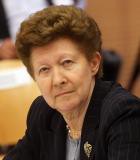
Funzione/Ruolo
Professoressa ordinaria di Storia Economica e Storia di Industria e della Finanza Università di Bologna
Percorso professionale
Laureata in filosofia nel 1966 presso l'Università Cattolica di Milano con 110 e lode con una tesi sulla Pubblicistica cattolica in campo economico e sociale negli anni 1890‑1904, prosegue i suoi studi con un post‑graduate e poi un D.Phil. in Storia economica presso l'Università di Oxford. Inizia la sua carriera accademica all’Università di Trieste, con un insegnamento in Cinematica dei fatti economici e sociali, nel 1976. Nel 1979 si trasferisce alla Facoltà di Scienze Politiche di Firenze dove nel 1982 diventa Professoressa associata di Storia economica. Nel 1987 si trasferisce all’Università di Bologna - prima alla Facoltà di Scienze Politiche, poi di Economia – dove nel 1993 diventa Professoressa ordinaria e dove attualmente continua a insegnare a titolo gratuito Storia Economica e Storia di Industria e della Finanza.
Dal 1973/74 è Visiting professor di Storia economica europea presso il SAIS Europe Center della Johns Hopkins University. Nel 2016, il SAIS Europe ha intitolato una professorship in Development Economics a Vera e al marito Stefano Zamagni, anch’egli economista.
Vera Zamagni è stata segretaria della Società Italiana degli Storici dell'Economia (1989‑1993), membro del Comitato 10 del Consiglio Nazionale delle Ricerche (1994-1999), reggente della filiale di Bologna della Banca d’Italia (1996-2000 e 2011-12), membro del GEV 13 dell’ANVUR (2011-13).
E’ stata vicepresidente della Giunta regionale dell’Emilia-Romagna e assessora alla Cultura, Sport e Rapporti coi Cittadini dal maggio 2000 al dicembre 2002.
E' nel comitato scientifico dell’associazione ASSI per lo Studio della storia d’impresa. E' nel gruppo di lavoro per il settore storico della Casa editrice Il Mulino di Bologna. E’ socia corrispondente della Deputazione di Storia patria per le Province di Romagna. E’ stata nel Consiglio dell’Istituto dell’Enciclopedia Italiana Treccani dal 2006 al 2011.
E’ stata CdA di Banca Carim di Rimini (2012-2017). E’ nel CdA della Datalogic di Bologna. E’ vicepresidente della ONG CEFA di Bologna. E’ presidente dell’Associazione Amici dell’Hospice M.T.Chiantore Seragnoli di Bologna.
Risultati scientifici
Vera Negri Zamagni si occupa da una vita di storia economica italiana dell'età contemporanea, con particolare riferimento agli standard di vita, alla ricostruzione di serie storiche di PIL e debito pubblico, alla ricostruzione di storie di imprese (Italcementi, Finmeccanica/Leonardo), allo sviluppo del Movimento cooperativo italiano. Ha scritto testi disponibili anche in versione inglese sulla Storia economica italiana dall'Unificazione ad oggi, sulla Storia economica europea dalle città-stato italiane ad oggi. Attualmente è impegnata nella stesura di due saggi per la editrice Il Mulino. Il primo su "Forme d'impresa" confronterà la corporation americana con i cluster di piccole-medie imprese, le imprese pubbliche con quelle cooperative e con le imprese sociali (o civili). Il secondo sarà invece un libretto della collana di "Parole controtempo", intitolato "Occidente".
Attività editoriali e pubblicazioni
Vera Negri Zamagni è stata fondatrice e fino al 2001 co-editor della European Review of Economic History, la rivista leader di storia economica europea pubblicata da Cambridge University Press a partire dal 1997. Ha collaborato a Il Sole‑24 Oree a numerose altre riviste e giornali.
Ha pubblicato 140 saggi, 20 volumi e 13 curatele, di cui un buon numero in inglese e alcuni in spagnolo. Di seguito, una selezione:
Dalla periferia al centro. La seconda rinascita economica dell'Italia, 1861‑1981, Bologna, Il Mulino, 1990, 2a ed. 1993 (ed. inglese The economic history of Italy 1860‑1990, Oxford, Clarendon Press, 1993)
Italcementi. Dalla leadership nazionale all’internazionalizzazione, Bologna, Il Mulino, Bologna, 2006.
con S. Zamagni, La cooperazione, Bologna, Il Mulino, 2008 (ed. inglese Cooperative enterprise: facing the challenge of globalization, Elgar, 2010).
L’industria chimica italiana e l’IMI, Bologna, Il Mulino, 2010
Finmeccanica. Competenze che vengono da lontano, Bologna, Il Mulino, 2009.
con S. Zamagni, Famiglia e lavoro. Opposizione o armonia?, Cinisello Balsamo, San Paolo, 2012 (tradotto in spagnolo e portoghese)
Enciclopedia Italiana, Appendice VIII. Il contributo Italiano alla storia del pensiero. Economia, a cura di V. Zamagni e P. Porta, Roma, Treccani, 2012.
Perché l’Europa ha cambiato il mondo. Una storia economica, Bologna, Il Mulino, 2015 (ed. inglese An Economic History of Europe Since 1700, Agenda, 2017)
L’economia italiana nell’età della globalizzazione, Bologna, Il Mulino, 2018 (ed. ingleseThe Italian economy, Agenda, 2018)
con G. De Luca e M. Landoni, Per una Storia della Retribuzione. Lavoro, valore e metodi di remunerazione dall’antichità a oggi, Bologna, Il Mulino, 2018.
Riconoscimenti e premi
Nell’ottobre 2001 ha ricevuto una Laurea honoris causa dall’Università di Umeå (Svezia).
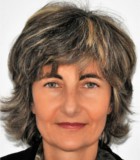
Area Economia e Finanza
Competenze: effetti di regolazione, effetti di tassazione, finanza, scelte di portafoglio
Parole chiave: coronavirus e stabilità finanziaria, diversificazione, gruppi di imprese, incentivi fiscali, insider trading, leverage, liquidità, rendimento, rischio, struttura proprietaria, valutazione di azioni
Regione: Piemonte
Funzione/Ruolo
Professoressa ordinaria di Economia Finanziaria all'Università di Torino
Percorso professionale
Giovanna Nicodano (Ph.D., Princeton University) è professoressa ordinaria all’Università di Torino e fellow del Collegio Carlo Alberto, dove dirige il Master in Finance, Insurance and Risk Management e ha co- fondato il Centre for Research on Pension (CeRP). E’ membro del supervisory board dell’Università di Vienna, School of Business Economics and Statistics, e ha presieduto la prima Commissione di Abilitazione Nazionale di Economia Politica. È stata visiting scholar al CEMFI Madrid, alla London School of Economics, all’Università di Amsterdam, di Haifa e Freiburg. E’ stata coordinatrice nazionale di ricerche finanziate dalla Commissione europea e dalla European Science Foundation. Tiene seminari e lezioni su invito presso istituzioni di ricerca internazionali e occasionalmente partecipa a dibattiti di policy. Dal marzo 2020 fa parte del comitato scientifico dello European Systemic Risk Board.
Risultati scientifici
L’attività di ricerca di Giovanna Nicodano si concentra su tre settori: gestione del portafoglio, finanza aziendale e effetti della regolamentazione.
Nell’ambito della gestione di portafoglio, studia come tenere conto del rischio del reddito da lavoro, misurando l’aumento del benessere del risparmiatore che ne deriva. Ha inoltre studiato gli effetti dell’inserimento nei portafogli di titoli azionari (a) con sottostante immobiliare (b) a bassa capitalizzazione (c) con rendimenti asimmetrici.
Quanto alla finanza aziendale, valuta azioni e debito di società holding e sussidiarie, effetti di carve-out e di spin-off sui prezzi e sulle probabilità di insolvenza. Inoltre valuta il diritto di voto e gli effetti di conversioni/ emissioni di azioni senza diritto di voto.
I suoi studi sugli effetti della regolamentazione mostrano come l’investimento in società high-tech o early-stage da parte del venture capital sia particolarmente sensibile alla tassazione dei capital gains e all’investimento pubblico in R&D, più che a incentivi finanziari. Per quanto concerne l’insider trading, argomenta che non dovrebbe essere vietato se sono concessi gli acquisti di azioni proprie sul mercato secondario, perché il primo riduce meno dei secondi la liquidità.
Attività editoriali e pubblicazioni
Giovanna Nicodano ha all’attivo numerose pubblicazioni. Di seguito le più recenti:
"Life-cycle welfare losses from rules-of-thumb asset allocation," with F. Bagliano and C.Fugazza, Economics Letters, 198(C), 2021
"A Trade-Off Theory of Ownership and Capital Structure", with L. Regis, Journal of Financial Economics, 131 (3), 715-735, 2019.
“Life-Cycle Portfolios, Unemployment and Human Capital Loss”, with F. Bagliano and C. Fugazza, Journal of Macroeconomics, 60, 2019, 325-340.
"Guarantees, Debt and Taxes", with E. Luciano, 2014, Review of Financial Studies 27(9), 2736-2772.
"Projecting Pension Outcomes at Retirement - Towards an Industry Reporting standard", with K. de Vaan, D. Fano, H. Mens, 2015, Bankers Markets and Investors 134, 71-91.
"Equally Weighted versus Long Run Optimal Portfolios" with C. Fugazza and M. Guidolin, 2015, European Financial Management 21, 742-789.
"Optimal Life-Cycle Portfolios for Heterogeneous Workers", with F.C. Bagliano and C. Fugazza, 2014, Review of Finance 18, 2283-2323.
"International diversification and industry-related labor income risk, " with C. Fugazza and M. Giofrè, 2011, International Review of Economics and Finance 20(4), 764-783.
"A reply to Douglas Cumming's 'Review Essay: Public policy and the creation of active venture capital markets", with M. Da Rin and A. Sembenelli, 2011, Venture Capital 13, 95-98.
"Can Pension Funds Hedge Wage Risk?", with C. Fugazza and M. Giofrè, 2009, Rotman International Journal of Pension Management 2(1), 64-70.
"Time and Risk Diversification in Real Estate Investments: the Ex-Post Performance", with C. Fugazza and M. Guidolin, 2009, Real Estate Economics 37(3), 341-381
"Should Insider Trading Be Prohibited when Share Repurchases Are Allowed?", with A. Buffa, 2008, Review of Finance, 12(4), 735-765.
Riconoscimenti e premi
È membro dei comitati (direttivi e/o scientifici) di organismi legati ai tre ambiti di competenza: CEPR Network on Household Finance; Dutch Network for Studies on Pensions, Aging and Retirement (Netspar); European Corporate Governance Institute, Brussels; Future of the Corporation, British Academy, London; Luiss School of Political Economy.
Nel corso della sua carriera ha ricevuto il Premio della Banca Europea degli Investimenti e il CNR-Nato Advanced Research Fellowship.

Funzione/Ruolo
Atleta, pugile del gruppo sportivo Fiamme oro.
Percorso professionale
Rebecca Nicoli inizia la sua carriera nel 2015 presso l'Associazione pugilistica di Pavia. Nel 2017 entra a far parte della Federazione pugilistica italiana. Nel 2019 diventa agente di polizia e atleta del gruppo sportivo Fiamme oro.
Il palmares di Roberta Nicoli include la medaglia di bronzo ai Giochi del Mediterraneo 2022, la medaglia d'argento ai Campionati europei under 22 2019, la medaglia d'oro ai Campionati italiani del 2016 e 2019, la medaglia d'oro ai Campionati europei under 22 del 2018 e il guanto d'oro 2018.
Ha partecipato alle Olimpiadi di Tokio 2020-21.

Funzione/Ruolo
Arbitra di calcio e commentatrice arbitrale in TV. Dirigente d'azienda, coach e formatrice
Percorso professionale
Manuela Nicolosi è una figura di spicco nel mondo dell'arbitraggio calcistico maschile: ha contribuito ad aprire alle donne le porte di un settore storicamente riservato agli uomini, facendo parte delle prima terna femminile nella storia del calcio ad aver arbitrato una finale europea maschile, la Supercoppa tra Liverpool e Chelsea nel 2019.
E' commentatrice arbitrale per DAZN e formatrice su leadership, mindset e gestione della pressione. La sua esperienza non solo sui campo di calcio, ma anche come formatrice e speaker motivazionale, l'ha portata a essere riconosciuta tra le 50 Most Powerful Women di Fortune Italia e a ricevere prestigiosi premi.
Attività editoriali e pubblicazioni
Manuela Nicolosi è autrice del libro Decido io (Roi Edizioni 2024) e coautrice di Biohacking al femminile e No label, entrambi in corso di stampa.
Riconoscimenti e premi
2016: arbitra selezionata per le Olimpiadi di Rio 2016
2019: arbitra selezionata per la finale della Coppa del Mondo femminile FIFA
2019: arbitra designata per la Supercoppa UEFA maschile
2020: arbitra selezionata per le Olimpiadi di Tokyo 2020
2023: inserita fra le 50 Most Powerful Women da Fortune Italia
2024: Premio alla carriera dal Winning Women Institute
2024: "Miglior Arbitro donna" in Serie A femminile
2025: Premio "RomaRose" della Presidenza dell’Assemblea Capitolina

Funzione/Ruolo
Ricercatrice presso l’Università degli Studi di Napoli L’Orientale
Percorso professionale
Studiosa di Turchia contemporanea, insegna Lingua e Letteratura Turca all’Università di Napoli ‘L’Orientale’ nei corsi di laurea triennali e magistrali dal 2007 e collabora come analista politica per diverse testate nazionali e internazionali. Ha conseguito il Dottorato in Storia delle donne e dell’identità di genere nel 2008 con una tesi sulla migrazione operaia turca in Germania occidentale (1961-1984). Precedentemente ha studiato a Berlino (Humboldt Universität, 2005), Istanbul (Bilgi University, Master in Cultural Studies, 2003), Napoli (Laurea in Scienze Politiche, Africa Mediterranea e Medio Oriente, 2002), Parigi (Erasmus, Inalco, 1999). È stata Visiting Research Fellow presso lo Zentrum Moderner Orient (ZMO) di Berlino, il Türkei-Europa-Zentrum (TEZ) di Amburgo.
Risultati scientifici
Lea Nocera è una turcologa contemporaneista. È tra i primi in Italia ad aver associato una competenza areale – conoscenza approfondita del paese, della sua storia, società e cultura e della lingua a livello avanzato – con un’attenzione ai fenomeni più contemporanei e all’analisi dei processi politici. Le sue ricerche sulla Turchia contemporanea si concentrano sulla storia sociale e culturale; studi di genere, studi urbani e mobilitazioni sociali. In particolare, tanto dal punto di vista accademico che professionale, si è occupata di società civile e di diritti delle minoranze; ha approfondito i processi di trasformazione urbana a Istanbul. Si è occupata a lungo di migrazione turca in Europa. Attualmente sta lavorando a un progetto di ricerca sulle relazioni culturali tra Turchia e Europa nel secondo dopoguerra (progetto selezionato nell’ambito delle ERC Starting Grants 2015). Si impegna regolarmente a favore di una alta divulgazione delle conoscenze riguardanti la politica e la società turca in Italia. Nel 2013 ha organizzato il I Convegno di turcologia italiana.
Attività editoriali e pubblicazioni
All’attività accademica affianca da anni un lavoro editoriale: dal 2016 a luglio 2017 è stata coordinatrice scientifica e editoriale della rivista online ResetDOC; fa parte della redazione de Gli Asini, rivista diretta da Goffredo Fofi; è nel comitato editoriale della collana Il Porto delle Idee, L’Orientale University Press, delle riviste accademiche Studi Magrebini edita da Brill e DİYÂR – Zeitschrift für Osmanistik, Türkei- und Nahostforschung / Journal for Ottoman, Turkish and Middle Eastern Studies.
Scrive regolarmente per la testata online Reset.doc. Ha inoltre collaborato con le testate: Lo Straniero, il Corriere della Sera, Pagina99, Micromega, L’Indice dei libri, Arab Media Report, il manifesto.
Come analista politica ha participato a diversi programmi di importanti emittenti radiotelevisive: RAI: Radio1, Radio2, Radio3; Rete Svizzera Italiana/RSI; Radio Radicale; Radio Popolare; Radio Vaticana; RaiNews24; SkyTG24. In Europa per: WDR-Funkhaus Europa, EuradioNantes e Politics.
Ha inoltre realizzato documentari radiofonici sulla Turchia per RadioRai3 e Rsi-Radio Svizzera Italiana. Per RadioRai3 cura, inoltre, come autrice e conduttrice la rubrica ‘La Finestra sul Mediterraneo’ nell’ambito del programma settimanale Zazà.
Nel 2017 ha fondato la rivista online Kaleydoskop – Turchia, cultura e società, di cui è ideatrice.
Tra le sue pubblicazioni: La Turchia contemporanea. Dalla repubblica kemalista al governo dell’Akp (Carocci, 2011); come curatrice Tradurre/Çevirmek. Incontri linguistico-letterari tra Turchia e Italia (L’Orientale Editrice, 2017) e L’impero mediatico di Fethullah Gülen (Arab Media Report/Resetdoc, 2015); come coautrice, #Gezipark. Coordinate di una rivolta (Alegre, 2013),) e The Turkish Touch. Egemonia neo-ottomana e televisione turca in Medio Oriente (Arab Media Report/Resetdoc, 2013).
Il suo libro volume Cercasi mani piccole e abili. La migrazione turca in Germania occidentale, Edizioni Isis, Istanbul è stato tradotto in turco come Manikürlü Eller Almanya’da elektrik bobini saracak dalle edizioni Bilgi Üniversitesi Yayinlari di Istanbul ed è stato inserito nella lista dei migliori 50 libri pubblicati in Turchia nel 2018 del quotidiano Hürriyet.
È inoltre traduttrice di narrativa turca e autrice di numerosi articoli su riviste accademiche.
Riconoscimenti e premi
La sua tesi di dottorato ha ricevuto il Primo premio Franca Pieroni Bortolotti, riconoscimento rilasciato dalla Società italiana delle Storiche in collaborazione con il Comune di Firenze alle migliori ricerche nell’ambito degli studi in Storia delle donne. Nel 2016 è stata selezionata come Young Leader per lo Young Leader Program (YLP), promosso dal Consiglio per le relazioni tra Italia e Stati Uniti. Nel 2018 ha conseguito l'abilitazione Anvur come Professore Associato (II fascia) nel settore 10/N1 - Culture del Vicino Oriente Antico, del Medio Oriente e dell'Africa, dopo aver già ottenuto nel gennaio 2015 lo stesso titolo in Storia contemporanea.

Funzione/Ruolo
Filosofa morale, direttrice scientifica del Festival Filosofi lungo l’Oglio e presidente dell’omonima Fondazione.
Percorso professionale
Francesca Nodari si laura in Filosofia all’Università degli Studi di Parma e si specializza in Filosofia e linguaggi della modernità nell’Ateneo di Trento. Dopo il Dottorato di ricerca in Filosofia presso l’Università degli Studi di Trieste, sotto la guida del Prof. Bernhard Casper (Università di Friburgo), collabora con la facoltà di Filosofia dell’Università Milano-Bicocca.
Nel 2014 consegue l’abilitazione nazionale di seconda fascia nel settore di Filosofia morale. Attualmente è Direttrice scientifica del Festival Filosofi lungo l’Oglio. Attiva nel dialogo ebraico-cristiano, ha diretto per sette anni il Festival Fare memoria e promosso l’istituzione, rispettivamente nel 2013 e nel 2015, del Giardino dei Giusti di Brescia sito nel Parco cittadino Tarello e del Giardino dei Giusti di Orzinuovi collocato all’interno del Parco Alcide De Gasperi.
Dirige, presso Mimesis, le collane «Chicchidoro» e «Tempo della Memoria». Collabora con riviste («Studium» e «Humanitas», «Nuova Secondaria», «Intersezioni», «Freiburger Zeitschrift für Philosophie und Teologhie», «Iride») e testate giornalistiche tra cui l’inserto culturale «Domenica» de «Il Sole 24Ore».
Risultati scientifici
Collocandosi nel solco tracciato dal suo Maestro Bernhard Casper, il cui pensiero si impernia su due linee metodiche costanti: quella fenomenologico-ermeneutica (Heidegger) e quella del nuovo pensiero (Rosenzweig), Francesca Nodari si occupa di questioni che ruotano attorno allo statuto della soggettività e dell’alterità cercando di farne emergere, grazie agli stimoli legati in particolare al pensiero di Levinas, la dimensione incarnata, temporale e finita. Di qui il costante riferimento al plesso: tempo e linguaggio e la problematizzazione del soggetto disorientato contemporaneo riflettendo su questioni cruciali che vanno dalla grande domanda sul male e sulla sofferenza alla responsabilità, dalla crisi etica dell’umanità alla fecondità dell’accadimento del dialogo fino al rapporto Maestro-allievo e alla grande sfida dell’educazione come questione morale. Nella sua ricerca è costante il richiamo alla tradizione ebraico-cristiana e, nell’orizzonte di una fenomenologia evenemenziale dell’accadimento dialogico, v’è lo sforzo di problematizzarne gli esiti anche sul piano del dialogo interreligioso.
Attività editoriali e pubblicazioni
[2020] Nodari F., Narrare il nome, in P. De Benedetti, La memoria di Dio, a cura di F. Nodari, Milano-Udine:Mimesis: 5-34.
[2019] Nodari F., Introduzione a M. Augé, Condividere la condizione umana. Un vademecum per il nostro presente, tr. it. e cura di F. Nodari, Milano-Udine: Mimesis: 7-44.
[2019] Nodari F., Farsi-ostaggio-per-l’altro, in B. Casper, Emmanuel Levinas. La scoperta dell’umanità nell’inferno dello Stalag 1492, a cura di F. Nodari, Milano-Udine: Mimesis: 5-19.
[2019] Nodari F., Adieu à Rav Laras. Polvere e cenere in G. Laras, Il comandamento della memoria a cura di F. Nodari, Milano-Udine: Mimesis: 5-30; Ricordare per ricostruire in ivi_ 31-39.
[2018]Nodari F., La preghiera come accadimento estremo della ragione pura pratica. Freiburger Zeitschrift für Philosophie und Theologie 65/1: 98-11.
[2018] Nodari F., Altrimenti che Sartre e al di là di Heidegger. Dal Dasein all’être juif. Iride, XXXI: 67-85.
[2017] Nodari F., Temporalità e umanità. La diacronia in Emmanuel Levinas, Firenze: Giuntina.
[2017] Nodari F., Premessa, in B. Casper, Levinas pensatore della crisi dell’umanità, tr. it. di L. Bonvicini, a cura di F. Nodari, Brescia: La Scuola: 5-10.
[2016 ]Nodari F., Storia di Dolores. Lettera al padre che non ho mai avuto, Milano-Udine: Mimesis.
[2013] Nodari F., Il bisogno dell’Altro e la fecondità del Maestro. Una questione morale, Firenze: Giuntina.
[2011] Nodari F., Il pensiero incarnato in Emmanuel Levinas, Brescia: Morcelliana.
[2008] Nodari F., Il male radicale tra Kant e Levinas, Firenze: Giuntina.
Riconoscimenti e premi
Nel 2012 ha ricevuto il «Premio Donne Leader 2012» dall’Associazione internazionale EWMD – Delegazione di Brescia.
Nel 2015 ha ricevuto il «Premio Donne che ce l’hanno fatta».
Il 2 giugno 2019 è stata insignita della carica di Cavaliere dell’Ordine al Merito della Repubblica Italiana, con Decreto del Presidente della Repubblica Sergio Mattarella.

Funzione/Ruolo
Professoressa ordinaria di Chimica Industriale e Tecnologia e Prorettrice Delegata presso il Politecnico di Milano.
Percorso professionale
Si laurea in Ingegneria Chimica al Politecnico di Milano, poi continua la sua formazione con un dottorato di ricerca in Chimica Industriale presso l'Università di Milano, e con un post dottorato al Politecnico di Milano. Nel 2002 diventa assistente presso il Dipartimento di Ingegneria Chimica del Politecnico di Milano. Nel 2007 diventa professoressa associata, e dal 2008 passa al Dipartimento di Energia, dove ora è professoressa ordinaria.
Dal 2018 è coordinatrice del Consiglio di Corso di Laurea in Ingegneria Chimica (livello Bachelor e Master) e Ingegneria della Prevenzione e della Sicurezza nell'Industria di Processo (livello Master) del Politecnico di Milano. Dal 2019 è Vice Preside della Scuola di Ingegneria Industriale e dell'Informazione del Politecnico di Milano. Dal febbraio del 2023 è Prorettrice delegata all'Attuazione del piano strategico.
Risultati scientifici
I processi catalitici ambientali e le fonti di energia sono tra i principali interessi scientifici di Isabella Nova. In particolare, studia le tecnologie catalitiche per il controllo delle emissioni inquinanti dai gas di scarico a combustione magra, i processi foto-elettrochimici per la scissione dell'acqua in idrogeno e ossigeno, e la conversione dell'anidride carbonica in combustibili e prodotti chimici.
Attualmente lavora con Daimler AG (DE), MTU (DE), FPT (I), Johnson Matthey (UK), Politecnico di Milano e in progetti EU-H2020.
Attività editoriali e pubblicazioni
È autrice di più di 130 articoli scientifici nazionali e internazionali, di 4 brevetti internazionali, coeditrice di 6 numeri speciali di Catalysis Today (Elsevier) e 1 libro (Springer), coautrice di più di 250 comunicazioni a congressi.
È stata invitata a presentare i risultati del suo lavoro a più di 20 università o centri di ricerca nazionali e internazionali, e a fare da relatore principale o plenario in più di 10 conferenze internazionali.
Riconoscimenti e premi
Il suo lavoro scientifico nell'ambito della catalisi ambientale ha portato a diversi riconoscimenti, quali l'invito a dare conferenze a importanti conferenze internazionali e presso centri di ricerca di università e società internazionali, l'invito a fungere da editore per diversi volumi dedicati allo studio di processi catalitici per la rimozione di sostanze inquinati (Catalysis Todat, Elsevier Ed.) e di un libro dedicato alla tecnologia SCR per il controllo delle emissioni di NOx a bordo di veicoli (Springer), alla partecipazione all' Editorial Board della rivista Applied Catalysis B: Environmental" (Elsevier).
Ha inoltre, ricevuto alcuni premi, tra i quali il Premio Giovani Scienziati all'interno del tredicesimo International Congress on Catalysis, a Parigi (2004), il Glenn Award for the San Diego Meeting of the Fuel Chemistry Division (2005), il K-idea award dal Kilometro Rosso e l'Energy award dalla Schneider Electric per il brevetto "Apparatus and process for reducing the content of nitrogen oxides in exhaust gases of combustion systems" (2009). Fa inoltre parte del Centro di Eccellenza MIUR per l'Ingegneria dei Materiali e delle Superfici Nanostrutturati (NEMAS), dell'Associazione Italiana di Ingegneria Chimica, della Società Chimica Italiana e dell'American Chemical Society, Fuel Division.
Nel 2018 è stata inclusa nella Inspiring 50 Italy list.

Funzione/Ruolo
Professoressa ordinaria di Storia contemporanea e Storia dello Stato sociale nel Dipartimento di Scienze Politiche e Sociali dell'Università di Cagliari.
Percorso professionale
Nel 1988 ha conseguito il titolo di Dottore di ricerca in Storia dei movimenti politici e il Post Dottorato nel 1992, presso l’Università di Roma Tre. Nel 1979 si è laureata in Scienze Politiche all’Università di Roma “La Sapienza” e nel 1989 in Scienze religiose presso la Pontificia Università Gregoriana. Dal 2010 al 2015 è stata presidente del corso di laurea in Scienze Politiche e dal 2015 dirige il Dipartimento di Scienze Sociali e delle Istituzioni. Attualmente insegna Storia contemporanea e Storia dello stato sociale. Da quattro anni tiene anche un Laboratorio di Public History. Da molti anni è socia della Società Italiana di storia contemporanea (SISSCO) e dalla sua fondazione, avvenuta nel 2015, anche della Associazione italiana della Public History che si propone di allargare i confini della storia al di fuori dell’ambito ristretto dell’accademia.
Risultati scientifici
Cecilia Novelli ha lavorato principalmente sui temi della storia contemporanea “non politica” ma sociale, educativa, economica, comportamentale e della mentalità. In particolare la storia delle donne e della famiglia nella Chiesa e nel movimento cattolico. Il periodo è quello tra la seconda metà dell’Ottocento e tutto il Novecento, con particolare riguardo ai decenni tra le due guerre e al secondo dopoguerra. Dal 2000 al 2010 ha diretto un progetto di ricerca dal titolo “Coloni senza colonie” sull’esito dell’impegno coloniale italiano. Dal 2000 è anche la storica di riferimento della Federazione Nazionale Cavalieri del lavoro, per i quali al momento dirige un progetto dal titolo Atlante storico degli imprenditori italiani dal decollo industriale alla Prima guerra mondiale.
Attività editoriali e pubblicazioni
[2020] Dau Novelli C., La storia dipinta: i murales di Orgosolo, in La storia liberata. Nuovi sentieri di ricerca, Mimesis, pp. 101- 119.
[2020] Dau Novelli C., Nascita di una capitale. Roma dal mito alla realtà (1870-1915), Castelvecchi.
[2019] Dau Novelli C., Famiglia, matrimonio e divorzio, in L’Italia e gli italiani dal 1948 al 1978, Rubbettino, pp. 341-367.
[2018] Dau Novelli C., Sergio Mattarella, in I Presidenti della Repubblica. Il Capo dello Stato e il Quirinale nella storia della democrazia italiana, Il Mulino, pp. 477-517.
[2018] Dau Novelli C., Moro, le politiche familiari e dei diritti, in Aldo Moro nella storia della Repubblica, Il Mulino, pp. 81-94.
[2017] Dau Novelli C., Italy and the memory of colonialism in the seventies, in Images of colonialism and decolonisation in the Italian Media, Cambridge Scholars Publishing, pp. 248-264.
[2017] Dau Novelli C., Storie di imprenditori, lavoro, invenzioni avventure e tragedie, in Public History. Discussioni e pratiche, MIMESIS, pp. 157-173.
[2017] Dau Novelli C., Matrimonio e famiglia nel magistero dei pontefici del ‘900, “Rivista di Storia della Chiesa in Italia”, n. 1, pp. 131-145.
[2016] Dau Novelli C., Le donne in Italia nella Prima guerra mondiale, in “Inutile strage” I cattolici e la Santa sede nella Prima guerra mondiale, Editrice vaticana, pp. 409-424.
[2015] Dau Novelli C., Erasure and denial of the past: the long and winding road of Italian colonial historiography, in Colonial and National identity, Cambridge Scholars Publishing, pp. 8- 25.
[2011] Dau Novelli C., La città nazionale. Roma capitale di una nuova élite, Carocci.
[2010] Dau Novelli C., Il neofemminismo: riflessioni critiche, in Culture politiche e dimensioni del femminile nell’Italia del ‘900, Rubbettino, pp. 39- 62.
Riconoscimenti e premi
Cecilia Novelli fa parte delle due più importanti società storiche del mondo anglosassone, la Association for the Study of Modern Italy e la Society for Italian Studies.
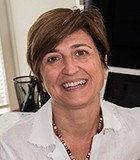
Funzione/Ruolo
Professoressa di Economia, titolare della cattedra George J. Records 1956 al Dartmouth College (USA)
Percorso professionale
Dopo aver conseguito la laurea in Statistica presso l'Università di Roma “La Sapienza” nel 1994, prosegue la sua formazione con il dottorato in Economia presso la University of Pennsylvania di Philadelphia (USA). Dal 2001 è Assistant Professor, e dal 2008 al 2015 Associate Professor (with tenure) alla Boston University di Boston (USA), dove nel 2015 diventa Full Professor e insegna fino al 2019, anno in cui si trasferisce al Dartmouth College, dove attualmente è George J. Records 1956 Professor of Economics. E’ stata Radcliffe Fellow al Radcliffe Institute della Harvard University dal 2005-2006.
Risultati scientifici
L’attività di ricerca di Claudia Olivetti si svolge nel campo dell’economia del lavoro e della famiglia, con attenzione all’interazione tra sviluppo economico, tecnologia, istituzioni e norme sociali in una prospettiva spesso storica e comparativa.
Un suo filone di ricerca si è focalizzato sul ruolo delle donne nel mercato del lavoro analizzando determinanti e conseguenze di divari salariarli, partecipazione alla forza lavoro e percorsi di carriera. Il suo lavoro più recente analizza l’intersezione fra norme di genere tradizionali e sviluppo economico nell’influenzare le scelte educative delle donne.
Un altro filone di ricerca, complementare ai precedenti, studia il ruolo del matrimonio per la mobilità intergenerazionale.
Attività editoriali e pubblicazioni
Claudia Olivetti è autrice di numerose pubblicazioni, tra cui:
(2017) Goldin C, Kerr S, Olivetti C. and Barth E. The Expanding Gender Earnings Gap: Evidence from the LEHD-2000 Census. American Economic Review P&P, 107 (5): 110-114.
(2017) Olivetti C, Petrangolo B. The Economic Consequences of Family Policies: Lessons From a Century of Legislation in High-Income Countries. Journal of Economic Perspective, 31(1): 205-230.
(2016) Olivetti C, Petrangolo B. The Evolution of the Gender Gap in Industrialized. Annual Review of Economics, 8: 405-434.
(2016) Albanesi S, Olivetti C. Gender Roles and Medical Progress. Journal of Political Economy,124 (3): 650-695.
(2015) Paserman D, Olivetti C. In the Name of the Son (and the Daughter): Intergenerational Mobility in the United States, 1850-1940. American Economic Review, 105(8): 2695-2724.
(2014) Olivetti C. The Female Labor Force and Long-run Development: The American Experience in Comparative Perspective. Chapter 5 in (L. Platt Boustan, C. Frydman and R.A. Margo eds.) Human Capital in History: The American Record, University of Chicago Press.
(2009) Albanesi S, Olivetti C. Home Production, Market Production, and the Gender Wage Gap: Incentives and Expectations. Review of Economic Dynamics, 12(1): 80–107.
(2008) Olivetti C, Petrangolo B. Unequal Pay or Unequal Employment? A Cross-Country Analysis of Gender Gaps.Journal of Labor Economics, 26(4): 621-654.
(2006) Olivetti C. Changes in Women's Hours of Market Work: The Role of Returns to Experience. Review of Economic Dynamics, 9 (4): 557-587.
(2004) Fernández R. Fogli A, Olivetti C. Mothers and Sons: Preference Development and Female Labor Force Dynamics.Quarterly Journal of Economics, 119(4): 1249-1299.
Riconoscimenti e premi
Claudia Olivetti è Research Associate del National Bureau of Economic Research nei gruppi di Labor Studies and Development of the American Economy e fellow di Global Labor Organization.
È Associate Editor della European Economic Review.È membro del committee dell’Economic History Association’s Alice Hansen Jones Prize che assegna, ogni 2 anni, il premio al miglior libro di storia economica Nord Americana.
È stata invitata a tenere la Fellows Lecture al 2017 annual meeting della Society of Labor Economist (Raleigh Durham USA), e la Keynote Lecture alla Italian conference in Econometrics and Empirical Economics (ICEEE) nel 2013 5th Annual Workshop on “Gender Equality,” Bocconi University nel 2015.
Ha ricevuto una Radcliffe Institute for Advanced Studies Fellowship, Harvard University nel 2005-2006 e vinto premi per l’insegnamento fra cui il Gitner Teaching Award, Boston University. La sua ricerca e’ stata finanziata dalla National Science Foundation e dal Research Council of Norway.

Funzione/Ruolo
Direttrice di ricerca CNRS, all'Institut Nicod all'Ecole Normale Supérieure di Parigi (PSL).
Percorso professionale
Gloria Origgi si laurea in Filosofia all’università di Milano. Dopo il dottorato in Filosofia e scienze cognitive all’Ecole Polytechnique di Parigi, insegna all’Università di Bologna prima di vincere un concorso al CNRS francese, dove attualmente è direttrice di ricerca. E’ stata visiting professor in numerose università: Columbia Unversity, New York, Bielefeld University, Germania, Università san Raffaele, Milano, Universidad UNISINOS, Porto Alegre, Brasile.
Risultati scientifici
Gloria Origgi si occupa di teoria della conoscenza, epistemologia, epistemologia sociale e del ruolo di Internet nel cambiamento del nostro rapporto con il sapere. Più recentemente ha sviluppato una teoria della reputazione, per comprendere come viene usata la reputazione degli altri per selezionare l’informazione (Origgi, 2018). Ultimamente si occupa del ruolo delle emozioni politiche nella conoscenza e nella mobilitazione collettiva (Origgi, 2019).
Attività editoriali e pubblicazioni
Libri:
[2019] Origgi G. (a cura di) Passions Sociales, PUF, Paris : https://www.amazon.fr/Dictionnaire-Passions-Sociales-Origgi-Gloria/dp/2130798810
[2019] Origgi G. Reputation. What it is and Why it matters, Princeton University Press.
Articoli e capitoli di libri:
[in corso di pubblicazione] T. Branch-Smith, T. Morissau, G. Origgi, “Trust in Experts. The case of chloroquine”, Social Epistemology.
[2021] Origgi G. “The social virtues and vices of curiosity” in M. Alfano (a cura di) The Routledge Handbook of Social Virtues Epistemology.
[2021] Origgi G. “Ground Zero. Il triangolo dell’umiliazione” in F. Piazza (a cura di) Il prisma delle passioni, UniPa Press.
[2020] Origgi G, Chiril P, Moriceau V, Benamara F, Mari A, Origgi G, Coulomb-Gully M. An Annotated Corpus for Sexism Detection in French Tweets, Proceedings of the 12th Conference on Language Resources and Evaluation (LREC 2020), pp.1397–1403.
[2020] Origgi G. “Trust and Reputation” in J. Simon (a cura di) Routledge Handbook of the Philosophy of Trust, Routledge, London, pp. 88-96.
[2019] Origgi G. “Trust and Reputation as Filtering Mechanisms of Knowledge” in P. Graham (a cura di) Routledge Handbook of Social Epistemology, Routledge, London.
[2019] Origgi G. “Reputation in Moral Philosophy and Epistemology” in F. Giardini, R. Wittek (a cura di) The Oxford Handbook of Gossip and Reputation, Oxford University Press, pp. 69-81.
[2018] G. Origgi, “La democrazia può sopravvivere a Facebook? Egualitarismo epistemico, vulnerabilità cognitiva e nuove tecnologie”, in Ragion pratica, 2: 445-458, doi: 10.1415/91549.
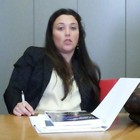
Area Politica internazionale
Competenze: analisi dei mercati energetici, analisi delle strategie di impresa anche in relazione al tema climatico, comunicazione e media in ambito energetico e ambientale
Parole chiave: assicurazioni e clima, disinvestimenti mondiali dal carbone, investimenti O&G, petrolio, scenari di mercato, scenari di prezzo, scenari energetici e investimenti, strategie di impresa
Regione: Emilia-Romagna
Funzione/Ruolo
Economista, analista senior dei mercati energetici con focus su quelli petroliferi presso la società di ricerca e consulenza RIE (Ricerche Industriali ed Energetiche) di Bologna
Percorso professionale
Lisa Orlandi si forma presso la Facoltà di Economia dell’Università del Bologna dove nel 2000 consegue la laurea in Economia Aziendale (vecchio ordinamento) cum laude. Subito dopo entra nel team di ricerca di RIE dove, in qualità di analista senior, partecipa a progetti e analisi di mercato relativi al settore energetico nazionale ed internazionale. Segue costantemente il mercato petrolifero con l’elaborazione di diversi articoli su testate di settore; si occupa di analisi degli scenari e degli investimenti energetici, nonché delle strategie aziendali e di comunicazione delle compagnie Oil&Gas. Negli ultimi anni si è dedicata all’analisi della strategia climatica di importanti compagnie di assicurazioni italiane. Coordina la programmazione settimanale delle analisi pubblicate sul portale RiEnergia https://rienergia.staffettaonline.com/ - di cui è direttore Responsabile - un portale dedito alle tematiche energetiche. Ha svolto negli anni diverse lezioni frontali sui mercati dell’energia presso master universitari ed enti formativi privati e pubblici. Dal 2001 al 2014 è stata anche docente a contratto presso la Facoltà di Economia dell’Università di Bologna svolgendo attività di supporto alla didattica per gli insegnamenti di Economia Industriale ed Economia dei servizi di pubblica utilità.
Risultati scientifici
Nell’ambito della sua attività lavorativa presso il RIE, Lisa Orlandi segue diverse linee di ricerca tra cui: lo sviluppo delle risorse di petrolio e gas a livello nazionale, filone che ha portato alla redazione di diversi paper sul tema e alla realizzazione di un libro dal titolo “La coesistenza tra Idrocarburi e Territorio in Italia”, di cui è stata curatrice insieme al Professore Alberto Clo nonché autrice e co-autrice di alcuni capitoli. Coordina report periodici dedicati all’analisi degli scenari e degli investimenti energetici e le attività di assistenza a compagnie di assicurazione impegnata nella realizzazione della loro strategia climatica.
Attività editoriali e pubblicazioni
Lisa Orlandi è Direttrice Responsabile della rivista online RiEnergia https://rienergia.staffettaonline.com/ e fa parte del comitato di redazione della rivista trimestrale Energia. Ha inoltre pubblicato numerosi articoli in testate specializzate, alcuni dei quali sono di seguito riportati:
[2018] Orlandi, L., L’apparente equilibrio del mercato petrolifero mondiale, newsletter GME n. 114, aprile.
[2017] Orlandi, L., Il braccio di ferro tra OPEC e shale USA, newsletter GME n. 104, maggio 2017.
[2016] Orlandi, L., Il mercato petrolifero nel 2016: l’illusione della stabilità, newsletter GME n. 96, dicembre.
[2015] Orlandi, L., Clô, F., Oil market, un anno dopo il crollo: un nuovo punto di equilibrio?, newsletter GME n.84 luglio, pubblicato anche su Medenergie in lingua francese.
[2014] Orlandi, L., Olio: raffinazione, logistica, rete carburanti, in Caprara G. (a cura di), Energia per l'Italia, Bompiani, Milano, pp. 186-201.
[2014] Orlandi, L., A. Clô (a cura di), La Coesistenza tra Idrocarburi e territorio in Italia, Editrice Compositori (Bologna), maggio.
[2014] Orlandi, L. Il calo delle quotazioni oil non si arresta: diversi paesi a rischio, pubblicato su Agi Energia, 10 dicembre.
[2014] Orlandi, L., 2014: un nuovo disegno dell’oil market?, in Agi Energia, 1 ottobre.
[2014] Orlandi, L., Tra novità e aspettative il petrolio non scende, in Agi Energia, 27 febbraio.
[2013] Orlandi, L., Scenari energetici: tra vecchie conferme e nuove tendenze, newsletter GME n. 66, dicembre.
[2013] Orlandi, L., Il mercato petrolifero tra cambiamenti strutturali e prezzi sempre elevati, newsletter GME n. 62, luglio.
[2011] Orlandi, L., Un prezzo del barile superiore ai 90 dollari: in linea con i livelli pre-crisi ma lontano dal mercato, newsletter GME n. 34, gennaio.
[2009] Orlandi, L., Clô, A., Petroleum Economics, in Petroleum Engineering-Upstream, in Encyclopedia of Life Support Systems (EOLSS), Developed under the Auspices of the UNESCO, Eolss Publishers, Oxford, UK, www.eolss.net.
[2003] Orlandi, L., Clô, A., I numeri dell’Eni, in Eni 1953-2003, Editrice Compositori (Bologna).

Funzione/Ruolo
Storica.
Percorso professionale
Dopo la laurea in Storia, conseguita con la votazione di 110/110 con lode, presso La Sapienza Università di Roma, Rossella Pace, presso la stessa Università, consegue il Dottorato di Ricerca in Storia dell’Europa. Durante il dottorato, svolge periodi di ricerca presso la Fondation Charles de Gaulle di Parigi. Nello stesso periodo, svolge attività di ricerca per il Dipartimento di Scienze Documentarie, Linguistico-Filologiche e Geografiche della Sapienza e sempre per lo stesso dipartimento è stata borsista per il progetto MAGISTER. Dopo il dottorato è post-doc presso la Fondazione Sapienza, ed è Cultrice della materia in Storia Contemporanea presso l’Università Suor Orsola Benincasa di Napoli e Cultrice della materia in Storia delle relazioni Internazionali presso Sapienza Università di Roma. Attualmente è assegnista di ricerca presso l’Università Suor Orsola Benincasa di Napoli. È stata Segretaria Generale dell’Istituto Storico per il Pensiero Liberale, del quale è Socia Fondatrice, e Segretaria Generale della Fondazione Giacomo Matteotti di Roma e Segretaria del Comitato Nazionale per le celebrazioni del Centenario della morte di Giacomo Matteotti. È consulente presso l’Archivio Storico del Senato della Repubblica.
Risultati scientifici
L'attività di ricerca di Rossella Pace si è concentrata finora principalmente sul periodo a cavallo delle due guerre mondiali, ed in particolare sulla guerra di liberazione nazionale. Più specificamente, essa si è soffermata sul ruolo svolto nel movimento antifascista da alcune esponenti femminili di grandi famiglie dell'aristocrazia e della borghesia liberale. Nella tesi di dottorato ha esaminato il contributo dato alla Resistenza dal Partito liberale attraverso l'Organizzazione Franchi guidata da Edgardo Sogno, e all'interno di esso il ruolo delle donne appartenenti a questa compagine politica. L’originalità della ricerca ha portato alla pubblicazione della tesi in una monografia da parte dell’editore Rubbettino. Attualmente sta studiando la biografia politica e culturale di Edgardo Sogno nel corso della guerra fredda, in particolare in relazione al dissenso nei paesi satelliti dell’ Urss a partire dagli anni '50. Nella sua ricerca si è avvalsa spesso della consultazione di archivi familiari privati, rimasti fino ad ora sconosciuti.
Attività editoriali e pubblicazioni
[2022] I liberali non hanno canzoni. Maria Giulia Cardini, Storia di una partigiana, Rubbettino.
[2021] Storie di guerra fredda, Il movimento di Pace e libertà, in Variazioni geoculturali europee, a cura di Walter Montanari, Shirin Zakeri, Vol. I, Edizioni Nuova Cultura, pp.235 -246.
[2020] Partigiane liberali. Organizzazione, guerra, cultura e azione civile,Rubbettino.
[2020] Noi, le altre. Le donne del partito liberale nella Resistenza: una minoranza nella minoranza in «Prospettiva Persona»,113 -114, [2]:62 -66.
[2020]Dai salotti alla lotta armata. Note sulla resistenza liberale e la rete di Edgardo Sogno, in Le Formazioni autonome della Resistenza, a cura di Tommaso Piffer, Marsilio, pp.76 -92.
[2020] "1945, Cristina Casana, la“protezione delle giovani fanciulle”e l’impegno europeo", Stati Uniti d’Europa, 41, on line.
[2019] L’immagine della donna in trincea,in La fatalità della guerra e la volontà di vincerla, a cura di Rossella Pace, Rubbettino, pp.275 -286.
[2019] "La diplomazia come mezzo per immaginare il futuro. Roberto Ducci e il processo di integrazione europea negli anni 60 -70", in Guido Lenzi, Luciano Monzali, Rossella Pace (a cura di) La diplomazia parallela. La politica estera italiana nelle Lettere e negli Scritti di Roberto Ducci (1970-1975), Aracne, pp.101 – 115.
[2018] "Enrico Serra", in Dizionario Biografico degli Italiani, Treccani, Roma.
[2018] Una vita tranquilla. I liberali e la lotta di liberazione nazionale nelle memorie di Cristina Casana, Rubbettino.
[2016]"La fuga dal “recinto”: la trincea e la follia", in XXI Secolo. Rivista di studi sulle transazioni, 38, [XV] pp. 172 -188.
[2016] Interesse nazionale e diplomazia multilaterale: dal Congresso di Vienna (1815) all'Atto Finale di Helsinki (1975). La tradizione diplomatica italiana, Rubbettino.
Riconoscimenti e premi
Nel 2019 riceve la Menzione di Merito al premio Minerva alla Ricerca Scientifica.
Nel 2021 riceve la Menzione di Merito al premio Augusto Monti per il volume Partigiane liberali.
Nel 2022 è finalista al premio Fiuggi Storia con il volume I liberali non hanno canzoni.
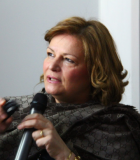
Funzione/Ruolo
Professoressa associata di Oftamologia all'Università di Roma La Sapienza e Dirigente di primo livello al Pronto Soccorso Oculistico del D.A.I. Testa Collo, Policlinico Umberto I di Roma
Percorso professionale
Dopo la laurea in Medicina e Chirurgia all’Università degli Studi di Bari nel 1988, prosegue gli studi attraverso la specializzazione in Oftalmologia all’Università La Sapienza di Roma. Nel 1993 vince una borsa di studio triennale dell’Istituto Superiore di Sanità per la ricerca sulla lotta all'AIDS all’estero (Barcellona, Spagna).
Nel 1996 si diploma all’European Board of Ophthalmology. Contemporaneamente prosegue la sua formazione e le sue ricerche prima come professoressa a contratto, poi nel 1998 come ricercatrice.
Dal 2011 è professoressa associata di Oftalmologia all’Università di Roma “Sapienza”, dove svolge anche attività di ricerca ed è responsabile del percorso didattico formativo degli studenti della Facoltà di Medicina e Farmacia e degli specializzandi in oftalmologia. Sempre nel 2011 diventa dirigente di primo livello al Policlinico Umberto I, dove attualmente è responsabile dell’UOD di Pronto Soccorso Oculistico.
È referee di progetti di ricerca Cineca per le seguenti riviste: Clinical Ophthalmology, Clinical Interventions in Aging, International Medical Case Reports Journal, Clinical Optometry, Patient Preference and Adherence, Therapeutics and Clinical Risk Management.
Risultati scientifici
Gli interessi scientifici sono stati inizialmente orientati sulle terapie farmacologiche delle complicanze oculari da HIV e sull’impiego delle tecnologie laser per la correzione delle ametropie. Attualmente i suoi studi sono particolarmente incentrati sui ruoli fisiopatologici delle terapie intravitreali dell’edema maculare diabetico e da occlusione vascolare retinico che regolano i fattori vascolari di crescita nell’ambito di un Clinical Trials.gov NCT02257333 Registro nazionale trombosi venosa retinica Retinal Thrombosis and Atherosclerosis (HEART VISION).
Elena Pacella insieme al suo gruppo di ricerca come evidenziato nelle sue pubblicazioni, è stata fra le prime ricercatrici in Italia a dimostrare che la somministrazione intravitreale di molecole cortisoniche a lento rilascio (device) svolgono un importante effetto antinfiammatorio, bloccano la produzione della cascata dei mediatori dell'infiammazione (prostaglandine e trombossani derivati dalla sintesi dell'acido arachidonico) e quindi la neovascolarizzazione retinica nei diabetici con edema maculare non responde agli anti-VEGF, migliorando la funzione visiva ed inoltre bloccano le complicanze, per il periodo della terapia, se si considera che attualmente il 13% dei diabetici in piena attività lavorativa soffre di handicap visivo.
Attività editoriali e pubblicazioni
Elena Pacella è fondatrice ed editorial board della rivista scientifica Senses&Sciences Dal 2016 è membro del comitato editoriale della rivista scientifica La Clinica Terapeutica.
È revisora di progetti Cineca per le seguenti riviste: Clinical Ophthalmology, Clinical Interventions in Aging, International Medical Case Reports Journal, Clinical Optometry, Patient Preference and Adherence, Therapeutics and Clinical Risk Management.
È autrice e coautrice di numerosi articoli scientifici, tra cui:
(2017) Pacella F, La Torre G, Basili S, Autolitano M, Pascarella A, Lenzi T, Pacella E. Comparison between "early" or "late" intravitreal injection of dexamethasone implant in branch (BRVO) or central (CRVO) retinal vein occlusion: six-months follow-up. Cutaneus and Ocular Toxicology, 36(3):224-230. doi: 10.1080/15569527.2016.1254648. Epub 2017 Jan 11.
(2016) Pacella F, Romano MR, Turchetti P, Tarquini G, Carnovale A, Mollicone A, Mastromatteo A, Pacella E. An eighteen-month follow-up study on the effects of Intravitreal Dexamethasone Implant in diabetic macular edema refractory to anti-VEGF therapy. International Journal of Ophthalmology, 9(10):1427-1432. eCollection 2016.
(2016) Pacella F, Agostinelli E, Carlesimo SC, Nebbioso M, Secondi R, Forastiere M, Pacella E. Management of anterior chamber dislocation of a dexamethasone intravitreal implant: a case report. Journal of Medical Case Reports,10(1):282.
(2016) Pacella E, Mipatrini D, Pacella F, Amorelli G, Bottone A, Smaldone G, Turchetti P, La Torre G. Suspensory Materials for Surgery of Blepharoptosis: A Systematic Review of Observational Studies. PLoSOne, 11(9):e0160827. doi: 0.1371/journal.pone.0160827. eCollection 2016. Review.
(2016) Grancara S, Dalla Via L, García-Argáez AN, Ohkubo S, Pacella E, Manente S, Bragadin M, Toninello A, Agostinelli E. Spermine cycling in mitochondria is mediated by adenine nucleotide translocase activity: mechanism and pathophysiological implications. Amino Acids, 48(10):2327-37. doi: 10.1007/s00726-016-2264-6. Epub 2016 Jun 2.
(2016) Pacella F, Ferraresi AF, Turchetti P, Lenzi T, Giustolisi R, Bottone A, Fameli V, Romano MR, Pacella E. Intravitreal Injection of Ozurdex(®) Implant in Patients with Persistent Diabetic Macular Edema, with Six-Month Follow-Up. Ophthalmology and Eye Diseases, 8:11-6. doi: 10.4137/OED.S38028. eCollection 2016.
(2015) Pacella E, Pacella F, De Paolis G, Parisella FR, Turchetti P, Anello G, Cavallotti C. Glycosaminoglycans in the human cornea: age-related changes. Ophthalmology and Eye Diseases, 7:1-5. doi: 10.4137/OED.S17204. eCollection 2015.
(2015) Taurone S, Ripandelli G, Pacella E, Bianchi E, Plateroti AM, De Vito S, Plateroti P, Grippaudo FR, Cavallotti C, Artico M. Potential regulatory molecules in the human trabecular meshwork of patients with glaucoma: immunohistochemical profile of a number of inflammatory cytokines. Molecular Medicine Reports, 11(2):1384-90. doi: 10.3892/mmr.2014.2772. Epub 2014 Oct 27.
(2014) Fehér J, Kovács I, Pacella E, Radák Z. Correlation of the microbiota and intestinal mucosa in the pathophysiology and treatment of irritable bowel, irritable eye, and irritable mind syndrome. Orvosi Hetilap, 155(37):1454-60. doi: 10.1556/OH.2014.29987. Review. Hungarian.
(2014) Pacella E, Arrico L, Santamaria V, Turchetti P, Carbotti MR, La Torre G, Pacella F. Dorzolamidechlorhydrate versus acetazolamide in the management of chronic macular edema in patients with retinitis pigmentosa: description of three case reports. Ophthalmology Eye Disease, 6:21-6. doi: 10.4137/OED.S13617. eCollection 2014.
(2014) Pacella E, Nisi G, Campana M, Pacella F, Mazzeo F, Brandi C, De Santi MM, Malagnino V, Tanganelli P, D'Aniello C. Histological and ultra-structural effects of rapid muscle expansion through intramuscular administration of carbon dioxide: an intra-operative study in an animal model. European Review for Medical Pharmacology Sciences, 18(3):416-20.
Riconoscimenti e premi
Nel 2010 ha ricevuto il premio "Kallistos award" per la ricerca medica e scientifica.
Nel 2019 ha ricevuto il premio "Professionalism and Competence" della Fondazione SAPIENTIA MUNDI.
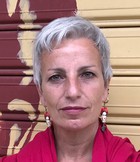
Area Politica internazionale
Competenze: comunicazione internazionale, dimensione di genere nella governance della comunicazione e del digitale, governance della comunicazione internazionale, mobilitazioni transnazionali su questioni di genere, diritti di comunicazione e delle TIC, trasformazione dei processi di governance globale, uguaglianza di genere nei media
Parole chiave: diritti umani, genere, global governance, ICT, libertà accademica, media, tecnologie digitali
Regione: Veneto
Funzione/Ruolo
Professoressa associata di Scienza Politica e Relazioni Internazionali presso il Dipartimento di Scienze Politiche, Giuridiche e Studi Internazionali (DSPGI) dell’Università di Padova
Percorso professionale
Dopo la laurea in Scienze Politiche, un dottorato in Relazioni Internazionali e un periodo di ricerca post-doc presso l’Università di Padova, inizia la sua carriera presso lo stesso Ateneo come ricercatrice nel 2001. E’ visiting professor alla McGill University di Montreal, Canada, nel 2009-2010, e all’Università di Helsinki, Finlandia, in diversi periodi dal 2016.
Presso l’Università di Padova è referente e co-coordinatrice della sezione italiana della rete internazionale Scholars at Risk; ed è membro eletto del Consiglio Direttivo del Centro di Ateneo per i saperi, le culture e le politiche di genere Elena Cornaro.
Attualmente è membro di associazioni accademiche nazionali (Società Italiana di Scienza Politica) e internazionali (European Communication Research and Education Consortium, ECREA; ORBICOM, rete delle cattedre Unesco in comunicazione; EuroMedia Research Group).
Inoltre, ricopre ruoli rilevanti nel contesto dell’International Association for Media and Communication Research (IAMCR), come membro eletto del Consiglio Internazionale, co-chair del gruppo di lavoro su Global Media Policy e componente della Task Force per la Global Alliance on Media and Gender promossa dall’Unesco (Comitato Ricerca e Politiche).
E’ anche co-chair dello UniTWIN Network on Gender Media and ICT dell’UNESCO insieme con le università RMIT (Australia) e UNAM (Messico); e membro costitutivo del gruppo di ricerca internazionale Digital Constitutionalism Network.
Risultati scientifici
I suoi principali interessi di ricerca riguardano le trasformazioni dei processi politici nel contesto globale e le implicazioni derivanti dagli sviluppi delle tecnologie digitali; con un’attenzione particolare ai temi dell’uguaglianza di genere, i diritti di comunicazione e la giustizia sociale. Fra gli sviluppi delle attività di ricerca in questi ambiti: la piattaforma digitale Mapping Global Media Policy (progetto internazionale 2006-2016) e la piattaforma risultante dal progetto Advancing Gender Equality in Media Industries (2017-in corso).
Da anni si occupa anche online learning e in particolare degli approcci di ‘virtual exchange’ che valorizzano la dimensione transculturale e transnazionale delle attività formative. Gli sviluppi concreti di queste attività sono realizzati in collaborazione con il gruppo di ricerca Next Generation Global Studies (presso SPGI, Università di Padova) e con diverse realtà internazionali.
E’ attualmente coinvolta nei seguenti progetti di ricerca e iniziative internazionali inerenti il rapporto fra genere, media e tecnologie digitali.
Advancing Gender Equality in Media Industries (AGEMI) (Finanziamento Commissione Europea, DG Justice, 2017-2019). Consorzio: University of Newcastle, Università di Padova, University of Gothenburg, International Federation of Journalists, COPEAM.
Comparing gender and media equality across the globe: a cross-national study of the qualities, causes and consequences of gender equality in and through the news media. Coordinato dalla Prof. Monika Dierf-Pierre, University of Gothenburg.
UNESCO Unitwin University Network on Gender Media and ICT. La rete promuove ricerca e formazione in ambiti di competenza Unesco, favorendo la collaborazione fra università sui temi dell’eguaglianza di genere dentro e attraverso i media. I membri della Rete provengono da Africa, Stati Arabi, Asia e Pacifico, Europa and Nord America, America Latina e Caraibi.
Global Alliance for Media and Gender. Una iniziativa promossa dall’Unesco nel 2014 che conta a oggi oltre 800 membri, fra organizzazioni dei media, sindacati, università, organizzazioni professionali. Gli obiettivi principali della GAMAG sono: promuovere l’eguaglianza di genere nei media, nelle loro strutture e contenuti; rafforzare la collaborazione regionale e internazionale, dare seguito e monitorare l’implementazione degli impegni assunti dai Paesi in occasione della Conferenza di Pechino (1995) su questi temi (Section J); sostenere l’eguaglianza di genere come priorità attraverso attività di ricerca e formazione.
Ha co-coordinato per l’Italia, insieme con Osservatorio di Pavia, diverse edizioni del progetto internazionale promosso da World Association for Christian Communication (WACC) intitolato Global Media Monitoring Project(GMMP, 2005-2010-2015-2020) sulla rappresentazione di donne e uomini nell’informazione.
Attività editoriali e pubblicazioni
Claudia Padovani è co-editor della serie Palgrave/IAMCR Global Transformations in Media and Communication Research e membro della redazione di varie riviste internazionali, fra le quali: International Communication Gazette, , Information Technology and Global Governance, Anuario ININCO. Investigaciones de la comunicaciòn, Journal of Alternative and Community Media, Continuum. Journal of Media and Cultural Studies, ComPol, Partecipazione e Conflitto.
E’ autrice di numerose pubblicazioni scientifiche, fra cui:
Padovani, C. & Ross, K. (2020) “Ideas for gender-transformative futures of education in the digital age” in Humanist Futures: Perspectives from UNESCO Chairs and UNITWIN Networks on the futures of education. Paris, UNESCO, pp. 153-160. ISBN 978-92-3-100369-1.
Padovani C, Vega Montiel A. and French L. (eds) (2019). Gender, Media and ICTs. New approaches for research, education and training. UNESCO Series on Journalism Education (outcome of a joint project of the UniTWIN Network on Gender Media and ICT, funded by the UNESCO IPDC and the Kingdom of the Netherlands). Open Access. Paris: UNESCO. ISBN: 9789231003202.
Padovani C. & Santaniello M. (eds) (2018). The International Communication Gazette. Themed issue “Digital Constitutionalism: Human Rights and Power Limitation in the Internet Eco-system”. Sage Publications. Vol 80/4. DOI: 10.1177/1748048518757114.
Padovani, C. (2018) “Gendering media policy research and communication governance” in Javnost – The Public. Journal of the European Institute for Communication and Culture, Taylor & Francis (Invited contribution to special issue for the journal 25th anniversary). Vol 25. DOI: 10.1080/13183222.2018.1423941. Accessible su: http://dx.doi.org/10.1080/13183222.2018.1423941.
Ross K. & Padovani C. (eds) (2017). Gender Equality and the Media: A Challenge for Europe. Routledge. ISBN: 978-1-315-70902-4. Paper back edition published in 2018. ISBN: 978-1-138-31980-6.
Padovani C. & Pavan E. (eds) (2017). Comunicazione politica, Quadrimestrale dell'Associazione Italiana di Comunicazione Politica. Themed issue “The Politics of Media Gender Equality. Lessons learned and struggles for change twenty years after the Beijing Fourth World Conference on Women”. Il Mulino (2/2017).
Padovani C. & Shade L. (eds) (2016). Journal of Information Policy. Themed issue “Gendering Global Media Policy: Critical Perspectives on ‘Digital Agendas’”. Pen State University Press. Accessible su: http://www.jstor.org/stable/10.5325/jinfopoli.6.issue-2016).
Padovani C. & Pavan E. (2016) “Global Governance and ICTs: Exploring online governance networks around Gender and Media” in Global Networks 16/3, Wiley Blackwell (pp. 350-371). ISSN 1470–2266.
Padovani C. (2015) “Il 2015 e l’Alleanza Globale per Media e Genere: per un’agenda di ricerca internazionale“ in Problemi dell’Informazione, vol 3/2015, Il Mulino (pp. 441-464). DOI: 10.1445/81453.
Padovani C. & Calabrese A. (eds) (2014). Communication Rights and Global Justice: Historical accounts of transnational mobilizations. (Palgrave/IAMCR series) Palgrave McMillan. ISBN: 978-1-137-37829-3.
Raboy M. & Padovani C. (2010). “Mapping Global Media Policy: concepts, frameworks, methods” in Journal of Communication, Culture and Critique, Wiley Blackwell (pp. 150-169). Themed issue on “Media Governance: New Policies for Changing Media Landscapes”. Vol III issue 2 Print ISSN: 1753-9129 Online ISSN: 1753-9137.
Padovani, C. (ed) (2004). International Communication Gazette 66 (3-4). Special issue “The World Summit on the Information Society. Setting the Communication agenda for the 21st century”. Sage Publications. Print ISSN: 1748-0485; Online ISSN: 1748-0493.
Padovani C. (2001). Comunicazione Globale. Democrazia, sovranità, culture (Global Communication. Democracy, Sovereignty, Cultures). Utet Libreria, Torino. ISBN: 887750680.

Funzione/Ruolo
Professoressa ordinaria di Economia Politica presso l’Università degli Studi di Napoli Parthenope
Percorso professionale
Dopo un Bachelor of Science in Economics presso la Stern School of Business della New York University e una laurea in Economia e Commercio presso l'Università degli Studi di Pavia, prosegue la sua formazione con un dottorato di ricerca in Economics conseguito nel 2001 all’University College London.
La sua attività di ricerca è cominciata all’Institute of Fiscal Studies di Londra dove ha beneficiato di una borsa di studio dal 1996 al 2000 e ha partecipato a progetti di ricerca su consumo, risparmio e scelte di portafoglio delle famiglie. Ha quindi continuato a occuparsi di queste tematiche e ad analizzarne le implicazioni di politica economica presso il Servizio Studi della Banca d’Italia, dove è entrata nel 2000. Nel 2007 si è spostata all’Università Parthenope come professoressa associata e dal 2017 è professoressa ordinaria. Dal 2017 è anche membro del Consiglio d’Amministrazione dell’Università.
È stata visiting professor alla Columbia University di New York, alla Goethe Universität di Francoforte, alla Frankfurt School of Finance e a EBS a Wiesbaden.
Oltre a questo, ha una lunga esperienza in materia di consulenza scientifica per le decisioni di politica economica maturata presso il Servizio Studi della Banca d’Italia e come consulente presso il Direttorato Generale Macroprudential policy and financial stability della Banca Centrale Europea.
Risultati scientifici
Monica Paiella è un’economista applicata con una notevole esperienza nell’analisi empirica e nell’uso delle metodologie econometriche maturata durante il PhD e il successivo percorso professionale. Si occupa prevalentemente di scelte di consumo, risparmio e investimento di famiglie e imprese. Con le sue ricerche ha contribuito a spiegare famose discordanze tra le predizioni dei modelli economico-finanziari e l’evidenza empirica (tra cui l’equity premium puzzle e lo stock market participation puzzle). Ha studiato le determinanti di risparmio e indebitamento e le scelte di portafoglio delle famiglie, tenendo conto delle differenze nella propensione al rischio e nell’alfabetizzazione finanziaria. Si è occupata infine di effetti ricchezza sui consumi.
Ha pubblicato su riviste internazionali prestigiose quali The Review of Financial Studies, il Journal of the European Economic Association e il Journal of Applied Econometrics. I suoi studi su equity premium puzzle, costi dell’investimento azionario, misurazione della propensione al rischio e effetti ricchezza sono molto noti e ampiamente citati in letteratura.
Tra i suoi studi più recenti vi sono due lavori sui prestiti tra privati (peer-to-peer lending), in cui analizza, da una parte la liquidità dei mercati peer-to-peer e i nessi con il settore bancario e, dall’altra, le implicazioni per l’unione del mercato dei capitali a livello europeo. Oltre a questo, come consulente della Macro-prudential Policy and Financial Stability Division della Banca Centrale Europea, ha contribuito adun progetto su disuguaglianza e stabilità finanziaria.
Altri progetti in cui è attualmente coinvolta riguardano: l’impatto della consulenza finanziaria e l’impatto del FinTech sulle scelte e i rendimenti di portafoglio, i meccanismi di formazione delle aspettative sull’andamento dei prezzi delle attività finanziarie e reali, l’indebitamento degli anziani, le implicazioni dello shadow banking per la stabilità finanziaria.
Attività editoriali e pubblicazioni
È autrice di numerose pubblicazioni single author e con coautori di istituzioni italiane ed estere, tra cui:
(2018) Faia E, Paiella M. The Role of FinTech for the Capital Market Union, in Allen F. et al. (eds.), “Capital Market Union and Beyond”, MIT Press.
(2017) Paiella M, Pistaferri L. The Anatomy of the Wealth Effect. The Review of Economics and Statistics 99(4): 710-721.
(2016) Paiella M. Financial Literacy and Subjective Expectations Questions: A Validation Exercise. Research in Economics 70: 360-374.
(2015) Minetti R, Murro P, Paiella M. Ownership Structure, Governance, and Innovation. European Economic Review 80:165-193.
(2014) Paiella M, Tiseno A. Evaluating the Impact on Saving of Tax-Favored Retirement Plans. Journal of Pension Economics and Finance 13(1): 62-87.
(2011) Chiappori PA, Paiella M. Relative Risk Aversion is Constant: Evidence from Panel Data. The Journal of the European Economic Association 9(6):1021-1052.
Attanasio O, Paiella M. Intertemporal Consumption Choices, Transaction Costs and Limited Participation in Financial Markets: Reconciling Data and Theory. Journal of Applied Econometrics 26(2): 322-343.
(2009) The Stock Market, Housing and Consumer Spending: A Survey of the Evidence on Wealth Effects. Journal of Economic Surveys, 23(5): 947-953.
(2008) Guiso L,Paiella M. Risk Aversion, Wealth and Background Risk.Journal of the European Economic Association 6(6):1109-1150.
(2007) Paiella M. The Forgone Gains of Incomplete Portfolios.The Review of Financial Studies, 20(5): 1623-1646.
(2006) Guiso L, Paiella M, Visco I. Do Capital Gains Affect Consumption? Estimates of Wealth Effects from Italian Household’s Behavior? in Klein L. (ed.), “Long Run Growth and Short Run Stabilization: Essays in Memory of Albert Ando (1929-2002)”, Elgar publisher.
(2006) Paiella M, D’Alessio G and Cannari L. La Ricchezza delle Famiglie Italiane: Un’Analisi Territoriale in Cannari L. and Panetta F. (eds.), “Il Sistema Finanziario e il Mezzogiorno,” Cacucci Editore.
Riconoscimenti e premi
È referee per la valutazione dei progetti di ricerca nazionali ed internazionali e dal 2011 al 2014 è stata membro del panel di Scienze Economiche e Statistiche del progetto di Valutazione della Qualità della Ricerca Universitaria (VQR). È membro del comitato scientifico per l’organizzazione di numerose conferenze nazionali ed internazionali, tra cui le conferenze e i workshop CEPR di Household Finance, Women in Economics (WinE) della European Economic Association, e i congressi della Società Italiana degli Economisti. È membro del Collegio di dottorato in Governance, Management and Economics dell’Università Parthenope e dal 2018 è referente del curriculum in Economics.
È risultata vincitrice dei finanziamenti banditi annualmente dall’Università Parthenope a sostegno della ricerca individuale. Ha ricevuto un TMR grant e nel 2017 un grant dell’Institut Europlace de Finance-Louis Bachelier LABEX come principal investigator.
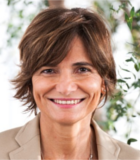
Funzione/Ruolo
Capo della Segreteria Tecnica di Presidenza di Intesa Sanpaolo, Direttrice e Curatrice del Museo del Risparmio, Board Member di Assonebb, IFFM (International Federation of Finance Museums) (IFFM) e Fondazione VUB (SK)
Percorso professionale
Consegue la laurea in Economia e Commercio presso l’Università “Sapienza” di Roma nel 1988, prosegue la sua formazione con il Diplome (PhD pass) in International Relations presso “The Graduate Institute of International and Development Studies” a Ginevra (CH). Nel 1992, si trasferisce oltre oceano dove lavora presso l’IMF a Washington D.C. come intern e consegue un Master in Economics alla “Brown University” di Providence (USA). Nel 1994, ottiene il Dottorato in Economia presso l’Università “Sapienza” di Roma e vince una posizione di post doc, in qualità di Jeanne Monnet fellow, presso l’”European University Institute”. E’ stata titolare della cattedra dal 1998 al 2014 di “Economia dei mercati finanziari e monetari” (E445) presso la facoltà di Economia della LUISS. Nel 1994 ha iniziato a lavorare nel settore bancario, prima presso l’Ufficio Studi dell’IMI come senior economist poi in IntesaSanpaolo dove, dal 2010, è a capo della struttura di staff che riporta direttamente al Presidente del gruppo. Ha gestito la realizzazione del Museo del Risparmio, un laboratorio di educazione finanziaria localizzato a Torino, di cui è la curatrice dei contenuti e dal 2012 riveste anche il ruolo il direttore. Dal aprile 2016 è, inoltre, responsabile della gestione del Fondo di Beneficenza di Intesa Sanpaolo.
Risultati scientifici
L’attività di ricerca di Giovanna Paladino si svolge nel campo della finanza e dell’econometria, con un focus particolare sulle problematiche collegate alla trasmissione della volatilità e ai cambiamenti di regime nel tempo, attraverso metodologie GARCH. In questo ambito, ha lavorato sui meccanismi di determinazione dei prezzi del petrolio e delle commodity, studiandone le determinanti e rilevando un ruolo importante della componente speculativa. Recentemente l’attenzione si è rivolta all’efficacia della politica monetaria della BCE, alla connessione tra rischio sovrano e rischio del settore bancario (bank-sovereign nexus) e al comportamento time varying di fondamentalisti e chartisti sul mercato delle principali valute. Un altro filone di ricerca recente ha, invece, riguardato la corporate finance e la regolamentazione, con approfondimenti sulla creazione di valore dei M&A bancari, nel periodo di crisi, sull’impatto dell’adozione dei modelli interni di rating sul costo del capitale e sulla relazione tra leverage e profitabilità. Negli ultimi anni all’attività scientifica si sono affiancate attività progettuali importanti, quali la realizzazione del primo museo al mondo dedicato all’educazione finanziaria (MdR) e la gestione del fondo beneficenza del gruppo ISP sulla base delle best practice internazionali. In entrambe gli ambiti il tema del genere è oggetto di importanti attività di sensibilizzazione.
Attività editoriali e pubblicazioni
Giovanna Paladino è autrice di numerose pubblicazioni, tra cui:
(2016) Cifarelli G, Paladino G. Time-varying mark-up and the ECB monetary policy transmission in a highly non linear framework. International Review of Economics & Finance, 45:247-262.
(2016) Beltratti A, Paladino G. Basel II and regulatory arbitrage. Evidence from financial crises.Journal of Empirical Finance, 39: 180-196.
(2015) Beltratti A, Paladino G. Bank leverage and profitability: Evidence from a sample of international banks. Review of Financial Economics, 27: 46-57.
(2015) Cifarelli G, Paladino G. A dynamic model of hedging and speculation in the commodity futures markets. Journal of Financial Markets, 25: 1-15.
(2013) Beltratti A, Paladino G. Is M&A different during a crisis? Evidence from the European banking sector. Journal of Banking & Finance, 37: 5394-5405
(2011) Cifarelli G, Paladino G. Can oil diversify away the unpriced risk of a portfolio? International Journal of Finance & Economics, 17:73-88.
(2010) Cifarelli G, Paladino G. Oil price dynamics and speculation: A multivariate financial approach. Energy Economics, 32:363-372.
(2010) Cifarelli G, Paladino G. The Precautionary model redux? An empirical analysis of the dynamics of foreign reserve accumulation.Open Economies Review, 20: 525-543.
(2008) Cifarelli G, Paladino G. Reserve overstocking in a highly integrated world. New evidence from Asia and Latin America.The European Journal of Finance, 14:315-336.
(2005) Cifarelli G, Paladino G. Volatility linkages across three major equity markets: A financial arbitrage approach. Journal of International Money and Finance, 24:413-439.
Riconoscimenti e premi
Giovanna Paladino ha vinto numerose borse di studio che gli hanno consentito di proseguire gli studi dopo la laurea. Per il dottorato, la borsa biennale Luciano Iona e la borsa della Fondazione Einaudi, per gli studi post dottorato ha vinto la Jean Monnet fellowship dell’EUI. Nel 2003 la Global Finance Association ha conferito un premio come best paper in asset pricing alla ricerca “Volatility Co-movements in Emerging Bond Markets: Is there Segmentation between Geographical Areas?”, articolo pubblicato su Global Finance Journal nel 2003.



